Sitemap
- About Us
About Us
Welsh & Associates strives to learn about you and your organization so its only fitting that we invite you to learn about us as well! Since 2002, our team has successfully matched hundreds of job seekers and employers nationwide, including the greater West Michigan area.Qualifications Built on Integrity
Welsh & Associates brings decades of experience in executive recruitment, screening, and selection. Just as important, we maintain the highest level of ethical and professional standards throughout.
-
All of our search consultants are Certified Personnel Consultants (CPC), the only firm in West Michigan with this distinction. This certification ensures that you are working with executive search professionals who subscribe to a code of ethics, code of conduct, and professional standards that are among the finest in the industry.
-
Sheri is a Certified Employee Retention Specialist (CERS) and is certified as a Senior Professional in Human Resources (SPHR). This certification qualifies her to consult in all areas of human resources including employee retention, workforce development, and strategic planning. She is the only Executive Search Consultant in West Michigan to hold such combined credentialing.
-
The Welsh & Associates team has more than 30 years combined of focused, client-driven recruiting experience.
-
Welsh & Associates is a certified Women's Business Enterprise (WBE).
Equally important to these credentials is the integrity Welsh & Associates brings to the relationship. We can't be successful without our clients being successful through our efforts. This is the basis of our service, process, and affiliation with you and your company. It's the foundation of who we are and our professional and personal reputation.
Interact with Our Team
We are eager to start a relationship with you and your organization. Get to know us better through our: Ready to move forward with your search? Contact us today to get started.- Staff
Our Professional Staff
We invite you to learn more about Welsh & Associates by getting to know Sheri Welsh and the rest of our staff. Each of our team members makes a personal investment in the individuals and organizations they work with to successfully match candidates and employers for mutual success. Ready to move forward with Welsh & Associates? Contact us today to start the conversation.- Alisha Welsh
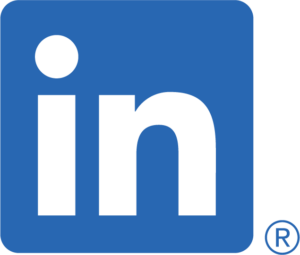 Connect with Alisha on LinkedIn
Alisha Welsh is an Executive Search Consultant at Welsh & Associates. Prior to joining the company, she worked in higher education at Spring Arbor College and in the manufacturing industry as a human resources professional. Alisha is a SHRM Certified Professional (SHRM-CP).
Alisha grew up in the small town of Mason, Mich., where her family owns a farm. She attended Michigan State University where she earned her Bachelor’s Degree in Human Capitol and Society from the School of Social Sciences.
Learn more about the entire Welsh & Associates' staff or contact us today.
Connect with Alisha on LinkedIn
Alisha Welsh is an Executive Search Consultant at Welsh & Associates. Prior to joining the company, she worked in higher education at Spring Arbor College and in the manufacturing industry as a human resources professional. Alisha is a SHRM Certified Professional (SHRM-CP).
Alisha grew up in the small town of Mason, Mich., where her family owns a farm. She attended Michigan State University where she earned her Bachelor’s Degree in Human Capitol and Society from the School of Social Sciences.
Learn more about the entire Welsh & Associates' staff or contact us today. - Elijah Isch
Elijah Isch
 Connect with Elijah on LinkedIn
Elijah Isch joined the Welsh & Associates team as an Executive Search Consultant in September 2021. Prior to joining the company, he worked as an Executive Chef at Reflections Memory Care and Heritage Assisted Living.
A native of Vicksburg, Mich., Elijah attended Western Michigan University where he earned a Bachelor of Business Administration in Marketing with a minor in Business Management from the Haworth College of Business.
Learn more about the entire Welsh & Associates' staff or contact us today.
Connect with Elijah on LinkedIn
Elijah Isch joined the Welsh & Associates team as an Executive Search Consultant in September 2021. Prior to joining the company, he worked as an Executive Chef at Reflections Memory Care and Heritage Assisted Living.
A native of Vicksburg, Mich., Elijah attended Western Michigan University where he earned a Bachelor of Business Administration in Marketing with a minor in Business Management from the Haworth College of Business.
Learn more about the entire Welsh & Associates' staff or contact us today.
- Sheri Welsh
 Connect with Sheri on LinkedIn
Sheri Welsh is the President & CEO of Welsh & Associates and her career includes more than 20 years of experience in talent attraction, selection, and retention as well as human resources consulting.
Founding Welsh & Associates in 2002, today the firm is recognized as an industry leader, meeting our clients' needs throughout the country. Sheri’s success has been built upon a solid foundation of ethical conduct and long-term, trusting relationships with employers and professionals alike.
She holds a BS in Business Administration from Central Michigan University and is a Senior Professional in Human Resources (SPHR), SHRM Senior Certified Professional (SHRM-SCP) Certified Personnel Consultant (CPC) and Certified Employee Retention Specialist (CERS).
Learn more about the entire Welsh & Associates' staff or contact us today.
Connect with Sheri on LinkedIn
Sheri Welsh is the President & CEO of Welsh & Associates and her career includes more than 20 years of experience in talent attraction, selection, and retention as well as human resources consulting.
Founding Welsh & Associates in 2002, today the firm is recognized as an industry leader, meeting our clients' needs throughout the country. Sheri’s success has been built upon a solid foundation of ethical conduct and long-term, trusting relationships with employers and professionals alike.
She holds a BS in Business Administration from Central Michigan University and is a Senior Professional in Human Resources (SPHR), SHRM Senior Certified Professional (SHRM-SCP) Certified Personnel Consultant (CPC) and Certified Employee Retention Specialist (CERS).
Learn more about the entire Welsh & Associates' staff or contact us today.
- Spencer Welsh
Spencer Welsh
 Connect with Spencer on LinkedIn
Spencer Welsh is an Executive Search Consultant at Welsh & Associates. Before joining the company, he worked in finance where he earned a Michigan Life, Accident, and Health Producer License.
He is a former Kalamazoo Promise Scholar from Loy Norrix High School and a graduate of Michigan State University, where he earned a Bachelor's Degree in Finance from the Eli Broad College of Business.
Spencer is a Certified Personnel Consultant (CPC) through the National Association of Personnel Services.
Learn more about the entire Welsh & Associates' staff or contact us today.
Connect with Spencer on LinkedIn
Spencer Welsh is an Executive Search Consultant at Welsh & Associates. Before joining the company, he worked in finance where he earned a Michigan Life, Accident, and Health Producer License.
He is a former Kalamazoo Promise Scholar from Loy Norrix High School and a graduate of Michigan State University, where he earned a Bachelor's Degree in Finance from the Eli Broad College of Business.
Spencer is a Certified Personnel Consultant (CPC) through the National Association of Personnel Services.
Learn more about the entire Welsh & Associates' staff or contact us today.
- Alisha Welsh
-
- Connect With Elijah
Our Methods Drive Results
Achieve Your Recruitment Goals With Elijah From Welsh & Associates
Welcome! I'm Elijah. Acting as the link between your company and the talented people who can strengthen it, the entire Welsh team and I work passionately to get your recruitment efforts across the finish line. Our success lies in our approach. Don’t believe me yet? Take a look at our placement stats.- For every 1.5 candidate presentations we make to our clients, we get an interview. In other words, our clients choose to interview almost every candidate we send them.
- For every 2.3 interviews our clients hold, we fill a job. We don’t waste our clients’ or candidates’ time – when a candidate is selected for an interview, they’re good on paper AND in person.
- Only 1% of our candidates turn down an offer. Our candidates are solid and well vetted. We know what they want and make sure our clients understand that too.
- It takes us roughly 31 calls to recruit an ideal candidate for a position. We aren’t just grabbing names from a database; we’re working hard for you. We provide a service that most internal recruiters and HR teams will not.

- Connect With Spencer
Our Methods Drive Results
Achieve Your Recruitment Goals With Spencer From Welsh & Associates
Welcome! I’m Spencer. Acting as the link between your company and the talented people who can strengthen it, the entire Welsh team and I work passionately to get your recruitment efforts across the finish line. Our success lies in our approach. Don’t believe me yet? Take a look at our placement stats.- For every 1.5 candidate presentations we make to our clients, we get an interview. In other words, our clients choose to interview almost every candidate we send them.
- For every 2.3 interviews our clients hold, we fill a job. We don’t waste our clients’ or candidates’ time – when a candidate is selected for an interview, they’re good on paper AND in person.
- Only 1% of our candidates turn down an offer. Our candidates are solid and well vetted. We know what they want and make sure our clients understand that too.
- It takes us roughly 31 calls to recruit an ideal candidate for a position. We aren’t just grabbing names from a database; we’re working hard for you. We provide a service that most internal recruiters and HR teams will not.

- Contact Us
Contact Us
Welsh & Associates is eager to help you individually or as an organization. Contact us and share your unique executive search needs! Be sure to interact with us on social media as well! Phone: 269.488.8836 Fax: 269.488.8837 Email 141 E. Michigan Ave. Suite 300 Kalamazoo, MI 49007 Please fill out our contact form and we'll reach out to you! - Employers
Employers
Welsh & Associates offers employers executive search services with a distinct difference. We understand that finding the right person is more than screening resumes and conducting interviews. That's why we utilize a unique approach based on partnership and thoroughness. Welsh & Associates enjoys meeting our clients' needs all across the country, including key markets throughout West Michigan; our connections and expertise make the difference!Partners in Building Your Company
We develop partnerships with the employers we work with and deliver the best results when you invite us into the process. By seamlessly integrating into your company, we can comprehend your company culture, appreciate the nature of the position, and fully understand its requirements. The outcome will be that ideal candidate with whom you can build your company's future.
Emphasizing Every Position for Your Success
Our search tools are wide-ranging and focused on employer success. For every search we undertake, we employ executive search techniques. Whether you're seeking senior management, professional expertise, managerial or technical talent, we apply the same in-depth, hands-on process to secure candidates with superior potential in order to make your organization a success. Our employment recruiting services ensure that every position is filled with top talent.
Combining Knowledge & Insight
We invite you to learn more about how Welsh & Associates can assist you in the search for your next key hire. Read about our executive recruiting services, methods, and industry insights in order to understand what we can offer your organization. Intrigued? Contact us today to start the conversation and partner with Welsh & Associates for your all your employment recruitment needs.- Flex Talent Acquisition
Flex Talent Acquisition
Welsh & Associates’ Flex Talent Acquisition program is a collaboration between you, our client, and our highly trained team and includes a total or partial outsource of your recruitment function. Our recruiting and staffing professionals work closely with you to identify your staffing needs and develop a customized strategy for talent acquisition and management. As your executive search and recruiting partner, Welsh & Associates can place key personnel with extensive experience into a variety of areas including accounting and finance, engineering, sales, human resources, marketing, manufacturing, operations, and more. Outsourcing recruitment gives you a flexible and scalable model that evolves as your business and markets do.Flex Talent Acquisition might be right for you, if you are:
- Experiencing a lack of bandwidth in HR due to small HR staff, downsizing, and COVID-19 related issues
- Ramping up a new business unit or expanding your business, where several new hires are anticipated over a given amount of time
- Facing overwhelmed internal recruiters who are focused on hourly staffing or a large volume of positions to be filled
- Desiring to work with a “consultant” (not just a “recruiter”) with dedicated resources applied to your project, committed to successfully completing your searches
How can you and your organization benefit from our Flex Talent Acquisition program?
- Shortened time to fill — When you don't have the time, or bandwidth, to land multiple, critical hires quickly and hiring managers won’t wait, our experience produces fast results.
- Reduced recruiting costs – Experience savings based on how many positions you need to fill over the length of your contract.
- Skill and experience — Since 2002, Welsh & Associates has provided expertise in professional staffing and recruiting services for talent attraction, selection, and retention. We fill the toughest of positions with rock star candidates quickly and efficiently with the utmost professionalism.
- Partnership — Welsh & Associates is part of your team. Our staff becomes an extension of your staff and is fully dedicated to successfully managing your project through completion.
- Process
Process
The techniques and methodology used at Welsh & Associates are a customized process designed to meet and exceed your requirements. They are also the foundation of our success. Our searches reveal candidates of a far higher caliber than those generated by a typical in-house executive search process. This means your time will be spent considering qualified candidates, rather than screening large amounts of unqualified applicants. Our process uncovers those job seekers who will have a significant, positive impact on your organization. Your ideal candidate may already be employed or may be seeking to deliver greater impact in their career but is unaware of you. More than ninety percent of our placements are sourced from referrals and networking. In effect, we find the best candidates who are doing the work, not merely those looking for work. It is those successful individuals who will enable your company to flourish. It is precisely those individuals that the Welsh & Associates' process uncovers.Personalized Process
How we conduct an executive search is important. We've carefully crafted a step-by-step process designed to:- Assess Your Needs - You talk; we listen. We'll help guide the conversation to create a fully-formed outline that defines the search - from a job seeker's background, experience, and talents to the day-to-day job duties and accountabilities.
- Build a Qualification Profile - Together we'll transform your needs analysis into a position description with specific experience criteria to clearly identify successful candidates.
- Define the Search Strategy - As your partner, we'll identify likely sources where candidates fulfilling your qualifications may be found and chart an executive search strategy that precisely fits our resources to your needs.
- Construct a Project Timeline - Based on the foundational work, we will estimate a timeline for the project defining the completion date and intermediate objectives.
- Recruit and Qualify Candidates - This is where our distinctive difference becomes apparent. Our process of networking combines referrals and direct contacts to prospects and uncovers a type and caliber of talent that you may not have thought possible.
- Present a Short List of Candidates - Our process is designed to be your first round of screening. We produce candidates of quality as opposed to a quantity of resumes. Our process distills lists of "maybes" and "possibles" to a manageable selection of worthy candidates. Be confident that if a candidate's resume is presented, it will represent a talent you will be interested in interviewing.
- Manage the Client Interviews - We will organize candidate interviews for discretion and convenience in addition to assisting with the coordination of travel plans and schedules as required.
- Conduct Reference Checks - Once a finalist has been chosen, we will complete the reference checks, interviewing previous employers, and verifying degrees (as appropriate).
- Present the Offer Package - We will coordinate the presentation of the offer to the candidate and present it to them on your behalf, if you wish.
- Consult During the Transition Phase - We will work with your new employee during their time of transition, prior to and immediately following their hire, to help ensure a successful transition.
- Services
Services
The Welsh & Associates team is eager to offer our professional staffing and recruiting services to your organization regardless of the nature of the position.We consider ourselves to be your partner in leading your search process. In that role, we invest ourselves personally on your behalf to uncover the talent that will drive your company's future at all levels within the organization.
Based on your preference, we can work directly with your hiring managers and other team members. By seamlessly integrating into your company, we can comprehend your company culture, appreciate the nature of the position, and fully understand its requirements. Founded in 2002, Welsh & Associates is recognized as an industry leader by companies throughout the nation, including key markets in West Michigan.A Full Complement of Services
We will provide you with several service options that enable us to customize a search solution for your individual needs. These services include:
- Executive Search - With an emphasis on executive placement, we provide our clients outstanding candidates who consistently exceed their expectations. We employ proven techniques designed to minimize time to fill positions while generating exceptional candidates.
- Contingency Search - Based on your requirements, we conduct an in-depth search often employing executive search techniques to find candidates who match your specific criteria. Final payment of search fees are "contingent" on the hiring of a referred candidate.
- Flex Talent Acquisition - For those experiencing a lack of bandwidth in HR, are ramping up a new business unit or expanding their business, are facing overwhelmed internal recruiters, and/or are desiring to work with a "consultant" (not just a "recruiter"), our Flex Talent Acquisition program may be right for you.
- Flex Talent Acquisition
- Happy New Year
Happy New Year!
With grateful hearts, Welsh & Associates remembers all the individuals and organizations we have helped connect in 2019. Here’s to new opportunities and connections in 2020! Please keep us in mind if we can assist you in any way. - Happy Thanksgiving
Happy Thanksgiving!
With grateful hearts, Welsh & Associates remembers all of the individuals and organizations we have helped connect. We hope you enjoy a wonderful holiday with family and friends. Please keep us in mind if we can assist you in any way. - Home
Welsh Offers A Distinct Difference
At Welsh & Associates, we've designed a professional staffing and recruiting service that delivers talent with a difference. We are the link between those looking to build strong companies through talented people and those with the talents to do so. Our success lies in our approach. Founded in 2002, Welsh & Associates is recognized as an industry leader in executive and employment recruiting services by companies across the nation, including key markets throughout West Michigan.
- Job Seekers
Job Seekers
Welsh & Associates is a highly regarded executive search firm offering permanent and contract opportunities to a variety of job seekers. We invest time in getting to know you as a person in order to help us connect you with your next great opportunity.An Advocate for Your Advancement
We primarily focus on career opportunities in the following fields:- Accounting and Finance
- Engineering
- Human Resources
- Manufacturing Operations
- Supply Chain
- Sales & Marketing
- Information Technology
A Unique Approach to Job Searches
We act as career agents to those who are interested in enhancing their professional growth. By working with Welsh & Associates, you will find an executive recruitment firm that truly listens and understands your career plans and goals. We respect our job seekers by exhibiting the highest levels of confidentiality, ethics, and integrity. Our goal is to assist quality job seekers in identifying, locating, screening, and securing outstanding employment positions throughout the nation.We believe that the main asset of any organization is its people, and it is our mission to bring quality people and companies together for mutual success.
Take the Next Step
Whether you are casually looking for a new opportunity or actively sending out resumes to find your next employer, Welsh & Associates can help. Get started today with the following options: Welsh & Associates is eager to help you make your next career move! Contact us today to start the conversation. - Landing Page - Better Candidates
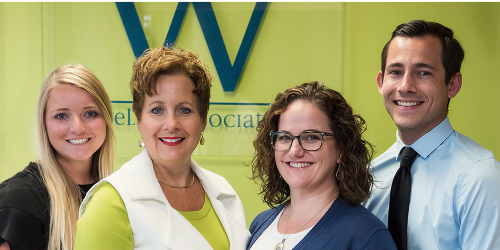
Talent Shortage? We Can Help.
Welsh & Associates offers employers talent acquisition services with a distinct difference. We understand that finding the right person is more than screening resumes and conducting interviews. That's why we utilize a unique approach based on partnership and thoroughness. Based on your preference, we can work directly with your hiring managers and other team members. - Landing Page - Connect
Need Top Talent? We Can Help.
Welsh & Associates offers employers talent acquisition services with a distinct difference. We understand that finding the right person is more than screening resumes and conducting interviews. That's why we utilize a unique approach based on partnership and thoroughness. Based on your preference, we can work directly with your hiring managers and other team members. More Information For EmployersLet's Connect!
Welsh & Associates is eager to connect with you to understand and satisfy your unique search needs! Please fill out our contact form and we’ll reach out to you! - Landing Page - FTA
Need Help with Finding Great Candidates?
Welsh & Associates’ Flex Talent Acquisition program will help you source and attract highly qualified candidates, and hire them quickly. Our recruiting and staffing professionals work closely with you to identify your staffing needs and develop a customized strategy for talent acquisition and management. Our process helps reduce hiring costs and shortens time to fill.Our Flex Talent Acquisition program is designed to assist organizations who are:
- Experiencing a lack of bandwidth in HR.
- Ramping up a new business unit or expanding business.
- Facing overwhelmed internal recruiters.
- Desiring to work with a “consultant” (not just a “recruiter”).
- Landing Page - Partner With Us
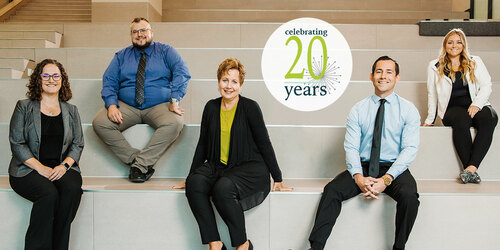
We're better. We'll prove it.
Welsh & Associates provides talent acquisition services with a distinct difference. As West Michigan leaders in talent acquisition since 2002, we have a track record of success that is unparalleled. We understand that finding the right person is more than screening resumes and conducting interviews. Our unique approach to recruiting produces candidates our clients could never find on their own. Rockstars? Yep. We find ‘em. Need a fresh approach to talent acquisition? We succeed where others have failed. How can we help you today? - Privacy Policy
Privacy Policy
Welsh & Associates is committed to protecting your privacy. Privacy issues represent a growing concern for all web users. Welsh & Associates does not collect personal information about you when you visit our website unless you choose to provide that information. Welsh & Associates does not sell your information to third parties. This Privacy Policy applies to the Welsh & Associates website and governs data collection and usage. By using the Welsh & Associates website, you have accepted the terms of this Policy.Information Collected and Stored Automatically
Of the information we learn about you from your visit to the Welsh & Associates website, we store only the following: the IP address from which you access the Internet, the date and time, the Internet address of the website from which you linked directly to our site, the name of the file or the words you searched, and the browser used to access our site. This information is used to measure the number of visitors to the site, identify system performance or problem areas, and so that we may improve the quality of the site. Welsh & Associates does not provide this information to third parties.Cookies
A "cookie" is a small file that a website transfers to your computer's hard disk allowing our server to "remember" specific information about your session. While visiting the Welsh & Associates site you may occasionally encounter a web page that employs cookies to make it easier to use the dynamic features of these web pages. The cookie and the information about your session will be destroyed automatically shortly after you close your browser-it is not permanently stored on your computer. You can set your browser to disable cookies or prompt you before a cookie is accepted. If you do not want to receive cookies, you will still be able to use the Welsh & Associates site, but will be unable to use cookie-dependent features.Personally Provided Information
If you choose to provide us with personal information by sending an email, or by filling out a form with your personal information and submitting it through our website, we use that information to respond to your message and to help us provide you with information or material that you request. If provided, personally identifiable information is maintained in a database that is regularly purged. We do not give, share, sell, or transfer any personal information to a third party unless required by law.Security of Your Personal Information
Welsh & Associates secures your personal information from unauthorized access, use or disclosure. Welsh & Associates secures the personally identifiable information you provide on computer servers in a controlled, secure environment, protected from unauthorized access, use, or disclosure.Links to Other Sites
The Welsh & Associates website provides some links to other websites. Once you link to another site, you are subject to the privacy policy of the new site.Contact Information
Welsh & Associates may, from time to time and at our discretion, update, modify, supplement, or delete portions of this Policy. We welcome your comments regarding this Privacy Policy and if you believe that we have not adhered to it, please contact Welsh & Associates. We will use commercially reasonable efforts to promptly determine and remedy the problem. - Resources
Resources
Whether you are an employer or a job seeker, Welsh & Associates offers a number of resources to assist you and your organization. We strive to match dynamic individuals with growing organizations to build lasting success. Our interest in this shared success goes beyond the interview stage to include transitional assistance and long-term partnership.Information Backed by Experience
For those looking to connect with their next opportunity as well as those seeking the right person to join their team, we offer the following: Interested in talking with Welsh & Associates about our unique approach and expertise? Contact us today to start a conversation.- Newsletter Archive
Newsletter Archive
Download quarterly newsletters from Welsh & Associates in this newsletter archive. As a resource to job seekers and employers, these insightful offerings were designed to help individuals and organizations succeed in a variety of industries and situations. Past newsletters in our archive include:- August 2017 - Employer (pdf) | Job Seeker (pdf)
- May 2017 - Employer (pdf) | Job Seeker (pdf)
- February 2017 - Employer (pdf) | Job Seeker (pdf)
- November 2016 - Employer (pdf) | Job Seeker (pdf)
- August 2016 - Employer (pdf) | Job Seeker (pdf)
- May 2016 - Employer (pdf) | Job Seeker (pdf)
- Newsletters
Elevate: It's Your Move
Advice for those looking to advance their career
May 2025: What Do "Followers" Really Want? February 2025: The Swedish Practice of Fika: Strengthening Our Teams One Break at a Time November 2024: Leadership Lessons from the Detroit Tigers August 2024: Can’t We All Just Get Along? May 2024: Cracking the Code: Great Traits That Make You Instantly Likable February 2024: Lessons From the Detroit Lions November 2023: Oh, Really? August 2023: How Do I Look? May 2023: Communicating – The Old-Fashioned Way February 2023: How to Be Top Talent- Elevate: It's Your Move – August 2023
Elevate: It's Your Move
How Do I Look?
Workplace dress codes have changed. We’ve all found greater comfort and freedom in our work lives with this “dress for your day” approach, but it has also sparked confusion over what to wear for the all-important business meeting or interview. These are just a few questions many of us are considering when we prepare for that important business conversation. We have some thoughts on this.First Impressions:
Your mom was right – you never get a second chance to make a good first impression. What does your appearance convey in your initial greeting and handshake?Research the Company:
Get a feel for the company’s dress code by checking out their website or social media. This can offer valuable insight into what is considered appropriate attire there.Maintain Professionalism:
Aim to maintain a professional appearance. Avoid clothing that is too revealing, overly casual, bold, extreme or adorned with loud prints. You want the attention focused on you – not on your distracting apparel.Fit and Grooming Still Matter:
Regardless of the dress code, well-fitted, well-groomed attire always leaves a positive impression. Can’t button that top button? Can’t breathe when you’re sitting down in those pants? Just say no to that outfit. Also, make sure your clothes are clean and crisply pressed. Pay attention to small details like polished shoes and well-manicured hands. (Yep, that goes for guys, too.)Dress Slightly Above the Norm:
In an interview situation, err on the side of formality. This shows respect for the occasion and demonstrates that you take the opportunity seriously. When looking to land the job or the deal, you really can’t be “overdressed”. You will feel much more confident when dressed like the CEO, as opposed to just a member of the team. An interview or an important business meeting with a client is not just an opportunity to showcase skills and experience but also a chance to demonstrate professionalism and respect for the company's values and culture. While the work environment may have become more relaxed, the value of a polished and professional appearance will never go out of style. - Elevate: It's Your Move – August 2024
Elevate: It's Your Move
Can’t we all just get along?
It comes around in the office every so often: an uncomfortable topic of conversation that makes hard-core debaters flex with talking points, conflict avoiders run for their offices, and leaves many in-betweeners wondering, “Can’t we all just get along?” Yet, what we all long for is just civility, especially in our workplace, where polite courtesy is tough to maintain at times. We’re reminded of the yearning for civility as we enter another election cycle. At Welsh & Associates, we’re reminded of how little has changed since August 2020, when we first talked about the concept of civility with the founders of The Civility Project on our Welsh Wire podcast. Regardless of whether you are a leader or an individual contributor, we all ideally seek to model civility in our workplace. This can often be difficult, especially when we engage with co-workers who hold strong, opposing viewpoints. So how do we model civility in a way that leaves others wanting to join in conversation with us again, without hard feelings?- Find the common ground. – Get to know your colleagues for who they are and where they come from. Along the way, you’re sure to find a few things you have in common, helping your relationship with them to be focused on what brings you together more than what divides you. You know others are listening to your conversations and your authentic style will be noticed–and replicated–by others.
- “Do unto others, as you would have them do unto you.” (Luke 6:31) – If the conversation gets heated, keep your cool and respond in a professional manner. Show respect, listen for understanding, and allow your colleague to vent if needed. Demonstrate kindness and grace whether or not you agree.
- “Seek first to understand, then be understood.” – Stephen Covey, author of Seven Habits of Highly Effective People®, shared this wisdom. He said this was the most important principle he had learned in interpersonal relationships. It begins with active listening (and we could ALL do better in that department!). Covey’s formula is to first understand what others think and feel before jumping in with what you think and feel. Your response will be different–guaranteed–if you slow down, and take that approach.
- “Don’t go in trying to win.” – In our August 2020 podcast, co-founder of The Civility Project Nolan Finley shared the perspective that good civil conversations are rooted in a desire to achieve more understanding, learn something, sharpen your views, or test them. Civility is NOT about trying to convert someone to adopting your opinion. Test your true motives as you talk and set those unhealthy behaviors down.
- Elevate: It's Your Move – February 2023
Elevate: It's Your Move
How to be Top Talent
 So, how's the market looking out there? It’s a question we’re often asked by people considering new opportunities. What they’re really asking is, “What are my chances of finding a great new job right now? Are companies hiring people like me?”
Truthfully, finding your dream job has much less to do with “market” conditions (think inflation, recession, and high unemployment) than it does with how you have positioned yourself as a valued, marketable individual.
Even in the worst of times, companies are still hiring top talent – and they always will. Top talent, impact players make the difference between good and GREAT companies. And great companies know that.
Be assured, if you’re a rock star, they are on the lookout for you.
With that in mind, you should be asking yourself, what can you do to ensure you are recognized as a high potential, top talent individual. Our suggestions include:
So, how's the market looking out there? It’s a question we’re often asked by people considering new opportunities. What they’re really asking is, “What are my chances of finding a great new job right now? Are companies hiring people like me?”
Truthfully, finding your dream job has much less to do with “market” conditions (think inflation, recession, and high unemployment) than it does with how you have positioned yourself as a valued, marketable individual.
Even in the worst of times, companies are still hiring top talent – and they always will. Top talent, impact players make the difference between good and GREAT companies. And great companies know that.
Be assured, if you’re a rock star, they are on the lookout for you.
With that in mind, you should be asking yourself, what can you do to ensure you are recognized as a high potential, top talent individual. Our suggestions include:
- Continue your education – Complete that MBA or take some classes to expand your experience in your field.
- Know your weaknesses – NOW is the time to improve skills or experience deficiencies that may hold you back.
- Participate in trade associations or professional organizations – The certifications offered will always set you apart in your field, and the networking opportunities from attending meetings and events will expand your horizons.
- Cross train – Consider which areas of the business you need to learn more about and actively seek out opportunities to work in and with those departments.
- Read some great books – New ideas stimulate creativity which will help you continue to be an expert and outstanding problem solver.
- Volunteer for a stretch project – It’s a lot of work, but the reward is what you will learn, and that’s invaluable!
- Find or be a mentor – Mentoring benefits both those who give AND receive in so many ways.
- Keep your resume up to date – Last, but not least, always be ready for your chance to shine.
- Elevate: It's Your Move – February 2024
Elevate: It's Your Move
Lessons From the Detroit Lions
So much has been said about the Detroit Lions’ historic playoff run this season. It was truly remarkable. We believe there are some unique lessons inherent in their grit and culture. It’s not the same old, usual stuff! Read on to learn what inspired us the most.“What makes Jared Goff so good? He’s very competitive… Goff’s Superpowers? …his ability to stay calm, stay resilient.” – Dan Campbell
As the team leader, Jared didn’t always get it right. He made plenty of mistakes last season, and in some cases, he even had fans calling for Dan to take him out and put in the second-string quarterback! Dan never did, though. He knew who he could count on, and he knew his player could deliver even in the most challenging of situations. How are you looked at by your leadership? Do they see you as someone they can depend on because you are competitive, steady, calm, and resilient? Are you the person that can be counted on in the most challenging situations to make big plays and bounce back from adversity? Individual contributors like that are a company’s most valuable asset.“You don’t know which play is going to make the difference.” – Dan Campbell
Simple, but true. Who knows what today holds or if the action you’re about to take is going to have impact? If you’re playing at a high level backed by solid data and flawless execution, you'll have impact and make a difference. It may not be in the first few months of your new job or even in the first few years of your career, but if you stay committed to delivering your work with excellence, you will enjoy the thrill of making a game-winning play on multiple occasions. That’s what building a remarkable and successful career is all about! Make every move like it’s the one that matters the most.“Compatibility is more important than coachability.” – Dan Campbell
This is not to say that coachability doesn’t matter. On the contrary – it matters a lot! What he is saying is that if you work in a culture where you don’t fit, where you can’t buy in, where it’s just not your style – coachability goes out the window. You can’t be coached, trained, or developed to be a top performer in an environment where you don’t embrace the day-to-day style and ethics of the team. Take a critical look at where you are now. If success seems elusive, it may just be the culture to blame. If you find you’re not compatible with the team, it’s time to move on. These are just a few of the unique lessons we learned from the home team. As true Michiganders, we love their grit and determination, and we hope you do too. It’s what we bring to our work every day. Please let us know if we can help as you build your career and find your way to a playoff team. - Elevate: It's Your Move – February 2025
Elevate: It's Your Move
The Swedish Practice of Fika: Strengthening Our Teams One Break at a Time
 While embracing my Swedish heritage, I learned about the Swedish practice of fika, which really intrigued me.
So, what exactly is fika?
It’s taking a break from work with friends or colleagues. Traditionally, the break includes coffee and pastries and does not include screens or any conversation about work.
The purpose is to connect with others and deepen relationships, thereby improving productivity and overall well-being.
It’s commonly practiced for 15 minutes daily, often at 10 a.m. and/or 3 p.m. Pretty cool, eh?
I learned that it is such an important part of the Swedish culture that Sweden’s Right of Public Access allows you to fika almost anywhere. Some companies in Sweden protect fika to the extent of writing allowable fika breaks into employment contracts. Now that’s commitment to a practice!
I began to consider: Why is fika so highly regarded and protected in Swedish culture? What can we learn from this practice and apply in our workplaces?
A few thoughts came to mind…
While embracing my Swedish heritage, I learned about the Swedish practice of fika, which really intrigued me.
So, what exactly is fika?
It’s taking a break from work with friends or colleagues. Traditionally, the break includes coffee and pastries and does not include screens or any conversation about work.
The purpose is to connect with others and deepen relationships, thereby improving productivity and overall well-being.
It’s commonly practiced for 15 minutes daily, often at 10 a.m. and/or 3 p.m. Pretty cool, eh?
I learned that it is such an important part of the Swedish culture that Sweden’s Right of Public Access allows you to fika almost anywhere. Some companies in Sweden protect fika to the extent of writing allowable fika breaks into employment contracts. Now that’s commitment to a practice!
I began to consider: Why is fika so highly regarded and protected in Swedish culture? What can we learn from this practice and apply in our workplaces?
A few thoughts came to mind…
Fika is enjoyed with people who matter to you.
Fika is about so much more than just walking away from our offices and setting our phones down. It’s about rich and authentic conversation that includes any topic—except work! Fika in the workplace provides an opportunity to reset your mind for 15 minutes while engaging in good food, good coffee, and probably a few good laughs. Think fika doesn’t make you more productive? Check out this study to learn why fika might unlock some real productivity gains for you.
Fika is a revered cultural practice that dates back to the 18th century.
There aren’t many traditions that stand the test of time. Fika has, so we believe there must be value in it. We see it as a great concept that is worth trying. It doesn’t need to be a daily practice; start it with your team once each week and see how it goes. In a workplace culture that runs at high speed and provides very little time for development of authentic relationships, it seems like fika is an employee engagement practice whose time has come.Ready to implement fika at your workplace?
At Welsh & Associates, we believe meaningful connections are the foundation of thriving teams and fulfilling careers. Why not take the lead and introduce fika to your workplace? This simple practice can help you foster stronger relationships, reset your mind, and create a positive environment that benefits everyone. We’d love to hear how you’re incorporating fika into your day! Share your photos and experiences with us—we can’t wait to see how you’re making a difference in your team’s culture!
- Elevate: It's Your Move – May 2023
Elevate: It's Your Move
Communicating – The Old-Fashioned Way
In a fast-paced digital world dominated by email and texting, the simple act of having a conversation by phone is often overlooked and undervalued. However, there are compelling reasons why picking up the phone and engaging in a verbal conversation holds distinct advantages over written communication, especially in the workplace. Phone conversations allow for immediate and real-time interaction. This instant communication is especially crucial in situations that require urgent decision-making or problem-solving. By speaking directly to the other person, you can exchange ideas, seek clarifications, and address concerns without the time constraints or delays imposed by written correspondence. Live phone conversations provide a more nuanced and accurate means of communication. While written messages may convey information effectively, they lack the tone, intonation, and body language that make up a significant portion of our communication. These non-verbal cues are essential in understanding the emotions, intentions, and context behind a message. When hearing the other person's voice, you can better gauge their feelings, detect sarcasm or humor, and ensure that your own message is received as intended. This becomes extremely important when you need to address a particularly sticky situation or thorny issue. Additionally, a phone chat helps to foster a sense of connection and build stronger relationships, creating a more personal and intimate connection. The warmth and authenticity conveyed through your voice can help build trust and rapport, enhancing the quality of your relationships with colleagues and customers alike. Furthermore, phone conversations allow for spontaneous and dynamic exchanges. They are fluid and organic. They encourage a free flow of ideas and facilitate brainstorming, problem-solving, and creativity. In a live conversation, you can bounce ideas off each other, ask follow-up questions, and explore various perspectives in a more collaborative and efficient manner. The ability to interact in real-time, capture nuances, build relationships, and encourage dynamic exchanges makes phone conversations a valuable and irreplaceable mode of communication. Don’t forget the power and value of the human voice. So, the next time you find yourself reaching for the keyboard, consider calling a number instead and experience the richness and effectiveness of a phone conversation. - Elevate: It's Your Move – May 2024
Elevate: It's Your Move
Cracking the Code: Great Traits That Make You Instantly Likable
It’s often said, “You don’t get a second chance to make a good first impression.” We all know that’s the truth. Whether you’re attending an event, meeting a client for the first time, or entering that important first interview, we all want to be well received – “liked” – by the people we meet. As someone who has “WOO” (Winning Others Over) in their Top 5 CliftonStrengths, allow me to share my top five best practices for getting off to a great start with someone new.- Engage with your eyes. Eye contact is so important when connecting with someone for the first time. As you make an introduction and extend your hand, be sure your eyes are locked on the other person – and smile! A good handshake accompanied by direct eye contact and a warm smile allows your body to instantly produce oxytocin, the connection hormone. It helps you to be received as confident and trustworthy, two very important traits to possess.
- Listen with your mind. Of course, you’re listening intently to what your new acquaintance has to say, but listen with more than just your ears. Give them your full attention, fully present in the moment and in the conversation. We live in a world of constant noise and distraction. Share the gift of listening by being fully present, and you’ll make an instant connection.
- Be who you are. Are you funny? Make them smile. Are you caring? Ask them how they are doing. Are you kind? Offer a sincere compliment. Most of all, be authentic. People can sniff out a fake instantly. You don’t have to work at impressing others, just be real with them and they will find that endearing.
- Just ask! Do you know what everyone’s favorite topic to talk about is? Themselves! People love to talk about themselves, their lives, their work. Ask genuine and thoughtful questions to get to know them better and they will love you for it. (And don’t forget to listen with your mind as they provide you with answers!)
- Name it. Whenever we use someone’s name in our conversation with them, they instantly feel validated. It shows them you're paying attention – to them! – and it helps to create an instant rapport. Added tip: If you’re in an extended conversation, make an attempt to use their name three times in the conversation before you part ways. This will help cement their name in your brain, aiding with recall for the next time you meet.
- Elevate: It's Your Move – May 2025
Elevate: It's Your Move
What Do "Followers" Really Want?
The Gallup organization recently released a global leadership report which our team found fascinating. The report entitled, “What Followers Want” shares research-backed data that provides a unique look into what our colleagues and teammates need and want from their leaders – today. If you have heard the old adage, “People don’t leave companies, they leave managers” you know why this information is so important. Whether you are a leader of people today or aspire to be one in the future, there are really good takeaways in this report. We are highlighting the top five items for you below:- These are the leaders that make the biggest difference in people’s lives:
- Family members – 57% of respondents indicated that it was a family member who had the most positive influence on their life. Family matters and should be a priority. Don’t ever underestimate the impact you have within your family.
- Managers in the workplace – 11% of respondents. Think what you say or do doesn’t matter to your team? 1 out of 10 people cite you, their manager, as their key influencer.
- Here is what “followers” said they need from their leaders:
- Hope – The need to feel positive about the future and for leaders to provide a clear direction.
- Trust – The need for honesty, respect, and integrity.
- Compassion – The need to feel cared about and listened to.
- Stability – The need for psychological safety and secure foundations during times of uncertainty.
- The top items people said they need from their leaders:
- 64% of respondents said they need to see hope from those who lead their organizations. If you are leading your organization, this should be your number one goal.
- 33% of respondents said their most important need was trust. What are you doing each day to build honesty, respect, and integrity with your team? Your followers are asking for this.
- Followers look to the most senior-level member of their organization to provide clear direction and positivity about the future. While managers and colleagues were also cited as leaders who should inspire hope, the findings were clear that an organization’s champion for hope needs to be its most senior leader.
- In their “Playbook for Good Leadership,” the Gallup findings reveal that there are three simple things leaders need to know to be successful:
- Know the needs of their followers.
- Know themselves.
- Know the demands of the role.
- These are the leaders that make the biggest difference in people’s lives:
- Elevate: It's Your Move – November 2023
Elevate: It's Your Move
Oh, Really?
Have you ever lied on a resume or in the hiring process? If you have, you wouldn’t be the first. A recent ResumeLab survey noted 70% of people lie on their resume. Employers are on guard for that – and they should be. We are, too. We have a saying in our office when it comes to a candidate’s resume, “Trust, but verify.” We’re not fans of liars! When it comes to interviewing, most job seekers likely believe the opportunity they are interviewing for is being represented honestly and fairly. My guess is we all believe the hiring managers and company leaders we talk with are speaking the truth in the hiring process. Sadly, we’ve learned this is not the case. A recent ResumeBuilder survey conducted from an experienced leadership sample group showed that 4 in 10 hiring managers admit they lie to candidates in the hiring process. What’s even more disturbing:- 36% of hiring managers say they lied about the role of the company. Additionally, of this group, 75% of them lie in the interview process.
- Half of this group intentionally lie in a job description; and 24% of this group even lie in an offer letter!
- They indicate they most commonly lie about job responsibilities, growth and career development opportunities, and company culture.
- They also lie about benefits, commitment to social issues, the company’s financial health, and compensation.
So, what are the takeaways?
- If and when you interview, know who you’re talking with and be certain you are hearing the truth. Trust, but verify.
- Help define your company culture with regard to truth telling. The truth must be told in the interview process in order to be a part of a loyal and successful team. You would NEVER want to work with someone who you discovered had lied in the interview process. Why would you tolerate lying from your colleagues?
- Is lying a thing at your organization? Maybe, maybe not. Perhaps you should find out. It might be time to pay more attention to how job descriptions are written, participate in more interviews, and review the details outlined in a job offer. Again, trust, but verify.
- Elevate: It's Your Move – November 2024
Elevate: It's Your Move
Leadership Lessons from the Detroit Tigers
The sports analogies just keep on coming from the D! For those who are not sports enthusiasts like we are, we apologize in advance. But we couldn’t ignore the many lessons we have learned from this year’s Detroit Tigers, who miraculously (and we’re NOT overstating that) made it into the American League playoffs this fall. If you don’t follow Detroit Tigers baseball, let us briefly share their journey:- The team was admittedly in a rebuilding year, with one of the youngest teams in all of baseball.
- At the trade deadline in July 2024, the team traded away four outstanding players, a clear sign they did NOT believe they were in playoff contention.
- On August 31, 2024, the team had a 69-68 record; they had five games out of a playoff spot.
- In September, the team went 17-8 to clinch a post-season playoff spot.
- Believe in yourself. "My mission is to be the best player possible and help win a World Series Championship for Tigers fans everywhere," rookie Colt Keith said. He had a laser focused goal, and despite what anyone said, he remained focused on it. Do you know what your mission is? Have you defined who you are and what you want to do? We hope you always believe in yourself and in your potential to achieve great things in your career.
- Never give up. When the Tigers beat the Yankees in the tenth inning walk off at the Little League Classic, something clicked. They recognized their ability to triumph over adversity and embraced their capacity to win with youth, speed, and aggressiveness. We’ve all been there. When things get tough, what is your response? We hope you never allow your weaknesses to define you, but that you always lead with your strengths.
- Miracles do happen. With one of the youngest teams in baseball and a 1% chance of making the playoffs, the Tigers went to the post season. When you believe in yourself, when you refuse to give up and you show up every day, executing on the fundamentals—guess what? You become a winner.
- Evolution: Recruit, Develop, Improve – August 2023
Evolution: Recruit, Develop, Improve
Can’t we all just get along?
It comes around in the office every so often: an uncomfortable topic of conversation that makes hard-core debaters flex with talking points, conflict avoiders run for their offices, and leaves many in-betweeners wondering, “Can’t we all just get along?” Yet, what we all long for is just civility, especially in our workplace where polite courtesy is tough to maintain at times. We’re reminded of the yearning for civility as we enter another election cycle. At Welsh & Associates, we’re reminded of how little has changed since August 2020, when we first talked about the concept of civility with the founders of The Civility Project on our Welsh Wire podcast. As leaders, we model civility as a part of defining and reinforcing our corporate culture. This can be difficult when we engage with co-workers who hold opposing viewpoints. However, we must uphold civility in the workplace to ensure working environments that are comfortable for everyone and to keep work productivity from dipping. The article “Incivility’s Cost to Employers: $2 Billion a Day” reports that workplace incivility causes US businesses to experience reduced productivity, leading to a collective loss of more than $1.2 Billion per day and creates a total loss of $828 Million per day due to absences. So how can we model civility as leaders in a way that leaves others wanting to join in again, with no hard feelings? Find the common ground. – Get to know your colleagues for who they are and where they come from. Along the way, you’re sure to find a few things you have in common, helping your relationship with them to be focused on what brings you together more than what divides you. You know others are listening to your conversations and your authentic style will be noticed–and replicated–by others. “Do unto others, as you would have them do unto you.” (Luke 6:31) –If the conversation gets heated, keep your cool and respond in a professional manner. Show respect, listen for understanding, and allow your colleague to vent if needed. Demonstrate kindness and grace whether or not you agree. “Seek first to understand, then be understood.” – Stephen Covey, author of Seven Habits of Highly Effective , shared this wisdom. He said this was the most important principle he had learned in interpersonal relationships. It begins with active listening (and we could ALL do better in that department!). Covey’s formula is to first understand what others think and feel before jumping in with what you think and feel. Your response will be different – guaranteed – if you slow down, and take that approach. “Don’t go in trying to win.” – In our August 2020 podcast, fellow co-founder of The Civility Project Nolan Finley shared the perspective that good civil conversations are rooted in a desire to achieve more understanding, learn something, sharpen your views, or test them. Civility is NOT about trying to convert someone to adopting your opinion. Test your true motives as you talk and set those unhealthy behaviors down. We subscribe to The Civility Project’s idea that staying apart will never allow us to solve the problems we have. We all want our world to be a better place–we just have different ideas as to how we get there. Our challenge to you in this highly charged season is simply this: how will YOU model civility in your workday to inspire change? - Evolution: Recruit, Develop, Improve – August 2024
Evolution: Recruit, Develop, Improve
Can’t we all just get along?
It comes around in the office every so often: an uncomfortable topic of conversation that makes hard-core debaters flex with talking points, conflict avoiders run for their offices, and leaves many in-betweeners wondering, “Can’t we all just get along?” Yet, what we all long for is just civility, especially in our workplace where polite courtesy is tough to maintain at times. We’re reminded of the yearning for civility as we enter another election cycle. At Welsh & Associates, we’re reminded of how little has changed since August 2020, when we first talked about the concept of civility with the founders of The Civility Project on our Welsh Wire podcast. As leaders, we model civility as a part of defining and reinforcing our corporate culture. This can be difficult when we engage with co-workers who hold opposing viewpoints. However, we must uphold civility in the workplace to ensure working environments are comfortable for everyone and to keep work productivity from dipping. The article “Incivility’s Cost to Employers: $2 Billion a Day” reports that workplace incivility causes US businesses to experience reduced productivity, leading to a collective loss of more than $1.2 Billion per day and creates a total loss of $828 Million per day due to absences. So how can we model civility as leaders in a way that leaves others wanting to join in again, with no hard feelings?- Find the common ground. – Get to know your colleagues for who they are and where they come from. Along the way, you’re sure to find a few things you have in common, helping your relationship with them to be focused on what brings you together more than what divides you. You know others are listening to your conversations and your authentic style will be noticed–and replicated–by others.
- “Do unto others, as you would have them do unto you.” (Luke 6:31) –If the conversation gets heated, keep your cool and respond in a professional manner. Show respect, listen for understanding, and allow your colleague to vent if needed. Demonstrate kindness and grace whether or not you agree.
- “Seek first to understand, then be understood.” – Stephen Covey, author of Seven Habits of Highly Effective People®, shared this wisdom. He said this was the most important principle he had learned in interpersonal relationships. It begins with active listening (and we could ALL do better in that department!). Covey’s formula is to first understand what others think and feel before jumping in with what you think and feel. Your response will be different – guaranteed – if you slow down, and take that approach.
- “Don’t go in trying to win.” – In our August 2020 podcast, fellow co-founder of The Civility Project Nolan Finley shared the perspective that good civil conversations are rooted in a desire to achieve more understanding, learn something, sharpen your views, or test them. Civility is NOT about trying to convert someone to adopting your opinion. Test your true motives as you talk and set those unhealthy behaviors down.
- Evolution: Recruit, Develop, Improve – February 2024
Evolution: Recruit, Develop, Improve
Leadership Lessons From the Lions
So much has been said about the Detroit Lions’ historic playoff run this season. It was truly remarkable. We believe there are some unique lessons for leaders inherent in their grit and culture. It’s not the same old, usual leadership stuff either! Read on to learn what inspired us the most.“Young players are going to make mistakes.” – Sheilia Ford
Well, of course they do. We all know that. However, Sheilia shared this in the context of embracing “mistake making” as a part of their culture. Now, that is a transformative approach! How could our organizations become better by embracing failures as a critical part of the journey to success? What if we encouraged our new hires and young professionals to take calculated risks and TRY? What new ideas and breakthroughs would happen – and happen faster – if we celebrated that? Mom said, “if at first you don’t succeed, try, try again.” Mom was right.“Every player just wants to know you can help them, right? …as long as they feel that, they’re all in.” – Dan Campbell
Your team cares deeply about improving their game. Your team wants to win – personally and professionally. They want to play on a team where they know their leader is right there alongside them, cheering them on and supporting them to higher levels of success. Do you communicate that to them? Do they know how much you care? Do they understand what you are willing and able to do in order to help them and the rest of the team succeed? Don't take this for granted; it’s easy to get caught up in the day-to-day tasks and neglect to remind your team that you're there for them and want to help them, each and every day. Today might be the day to let them know that.“Superstars aren’t the key to success. It’s TEAM.” – Dan Campbell
When interviewing and making hiring decisions, are you focused on hiring the “first round draft pick”? Are you looking for the ideal candidate, the one that ticks all the boxes, when your focus should be on the coachable candidate that rounds out the team? Superstars are great. They're fun to watch and can have immediate impact, but long-term success comes from building great teams. When interviewing, challenge yourself to give thoughtful consideration to candidates who bring enough of the right stuff to do the job but can also be developed by your team. Failing to pick up those third and fourth round draft picks could prove to be colossal mistakes in your long-term success. (Think the San Francisco 49ers without Brock Purdy!) Give them a shot. These are just a few of the unique lessons we learned from the home team. We love their grit and determination, and we hope you do too. It’s what we bring to our work every day. Please let us know if we can help as you build your playoff team. - Evolution: Recruit, Develop, Improve – February 2025
Evolution: Recruit, Develop, Improve
What Fika Is and Why We’ve Started Doing It

 While embracing my Swedish heritage, I learned about the Swedish practice of fika, which really intrigued me.
So, what exactly is fika?
It’s taking a break from work with friends or colleagues. Traditionally, the break includes coffee and pastries and does not include screens or any conversation about work.
The purpose is to connect with others and deepen relationships, thereby improving productivity and overall well-being.
It’s commonly practiced for 15 minutes daily, often at 10 a.m. and/or 3 p.m. Pretty cool, eh?
I learned that it is such an important part of the Swedish culture that Sweden’s Right of Public Access allows you to fika almost anywhere. Some companies in Sweden protect fika to the extent of writing allowable fika breaks into employment contracts. Now that’s commitment to a practice!
I began to consider: Why is fika so highly regarded and protected in Swedish culture? What can we learn from this practice and apply in our workplaces?
A few thoughts came to mind…
While embracing my Swedish heritage, I learned about the Swedish practice of fika, which really intrigued me.
So, what exactly is fika?
It’s taking a break from work with friends or colleagues. Traditionally, the break includes coffee and pastries and does not include screens or any conversation about work.
The purpose is to connect with others and deepen relationships, thereby improving productivity and overall well-being.
It’s commonly practiced for 15 minutes daily, often at 10 a.m. and/or 3 p.m. Pretty cool, eh?
I learned that it is such an important part of the Swedish culture that Sweden’s Right of Public Access allows you to fika almost anywhere. Some companies in Sweden protect fika to the extent of writing allowable fika breaks into employment contracts. Now that’s commitment to a practice!
I began to consider: Why is fika so highly regarded and protected in Swedish culture? What can we learn from this practice and apply in our workplaces?
A few thoughts came to mind…
Fika is enjoyed with people who matter to you.
 It’s all about people and relationships—no one knows that better than a human resource professional or accomplished leader.
In our hybrid, remote, flexible, Teams-call, and “always busy” work environments, it has become increasingly difficult to cultivate meaningful relationships with our work partners.
Yet, we do our best work when we have high functioning teams who enjoy their time together.
We can help to create an environment where that happens in fika, as it promotes intentional time spent as a team and therefore strengthened relationships.
It’s all about people and relationships—no one knows that better than a human resource professional or accomplished leader.
In our hybrid, remote, flexible, Teams-call, and “always busy” work environments, it has become increasingly difficult to cultivate meaningful relationships with our work partners.
Yet, we do our best work when we have high functioning teams who enjoy their time together.
We can help to create an environment where that happens in fika, as it promotes intentional time spent as a team and therefore strengthened relationships.
Fika requires a break from work.
Fika is about so much more than just walking away from our offices and setting our phones down. It’s about rich and authentic conversation that includes any topic—except work! Fika in the workplace provides an opportunity to reset your mind for 15 minutes while engaging in good food, good coffee, and probably a few good laughs. Think fika doesn’t make your team more productive? Check out this study to learn why fika might unlock some real productivity gains for your team.Fika is a revered cultural practice that dates back to the 18th century.
There aren’t many traditions that stand the test of time. Fika has, so we believe there must be value in it. We see it as a great concept that is worth trying. It doesn’t need to be a daily practice; start it with your team once each week and see how it goes. In a workplace culture that runs at high speed and provides very little time for development of authentic relationships, it seems like fika is an employee engagement practice whose time has come.Ready to bring fika to your workplace?
 At Welsh & Associates, we believe fostering meaningful connections is essential for building strong teams and successful organizations.
Start your fika tradition to create a culture of engagement, collaboration, and productivity.
We’d love to see your team embracing fika! Send us your photos and let us know how it’s helping your organization grow stronger.
At Welsh & Associates, we believe fostering meaningful connections is essential for building strong teams and successful organizations.
Start your fika tradition to create a culture of engagement, collaboration, and productivity.
We’d love to see your team embracing fika! Send us your photos and let us know how it’s helping your organization grow stronger.
- Evolution: Recruit, Develop, Improve – March 2023
Evolution: Recruit, Develop, Improve
The Real Reason You Can’t Fill That Job
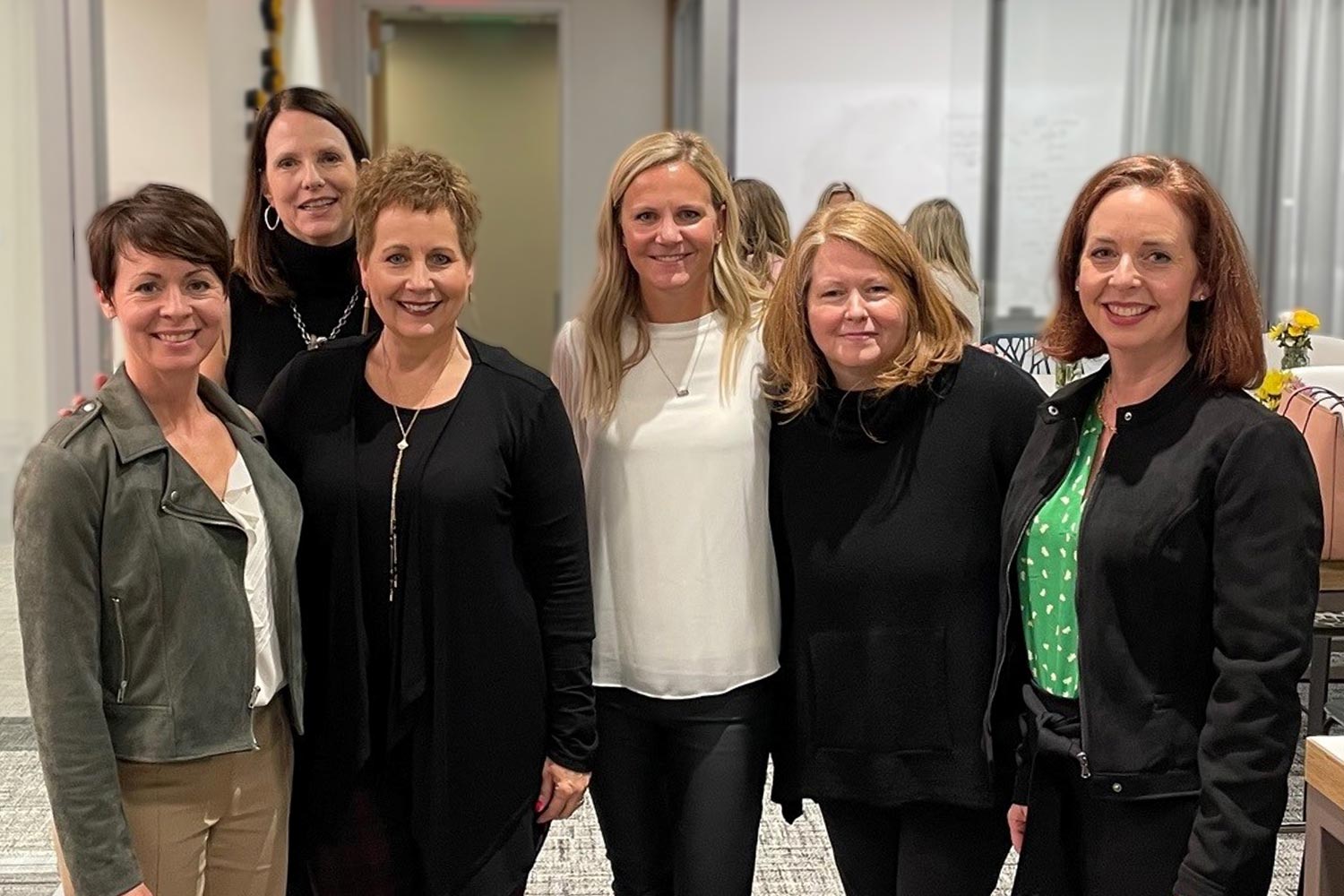 Who’s NOT struggling to find talent and fill open positions right now? It’s a constant challenge we are all getting weary of. If you’re like me, you’re searching for answers and a way to make sense of it all in order to craft a good solution to get your jobs filled. But getting a grip on the problem has had us realize this worker shortage was coming all along- COVID-19 just gave it a jumpstart.
The main reason you can’t find workers? Workforce demographics are working against you.
Who’s NOT struggling to find talent and fill open positions right now? It’s a constant challenge we are all getting weary of. If you’re like me, you’re searching for answers and a way to make sense of it all in order to craft a good solution to get your jobs filled. But getting a grip on the problem has had us realize this worker shortage was coming all along- COVID-19 just gave it a jumpstart.
The main reason you can’t find workers? Workforce demographics are working against you.
- Baby Boomers are exiting the workforce in record numbers. As of late 2021, 50.3% of U.S. adults 55 and older said they had retired, according to a Pew Research Center analysis. These retirements – many of them “early” retirements – are leaving large gaps in our experienced workforce that we weren’t quite ready for.
- When Baby Boomers retire, their roles are often filled by Gen Xers (1965-1980). There are 5M fewer people in this age demographic than Boomers. When you consider the immediate exit of 3M Boomers during the pandemic and a smaller demographic ready, trained, and prepared to take over their jobs, you can quickly see why we might have a problem. Quick math says we’re about 8M workers short in our succession plan.
- Census Bureau estimates show the U.S. working age population ages 16 through 64 fell 0.1% in 2020 – a scant drop, but the first decline of any kind after decades of steady increases. In 2019, the working age population had essentially plateaued. And it doesn’t appear things will get better anytime soon. World Bank estimates show a 3% decline in the US working population is likely over the next decade.
- Labor force participation continues to decline – And if that's not enough, labor force participation for the entire working age population declined from 67% in 2000 to 60% by September of 2021.
- Evolution: Recruit, Develop, Improve – May 2023
Evolution: Recruit, Develop, Improve
Stopping the Insanity
In our last newsletter, we talked about the real reason we can’t fill all of our open positions – demographics. While it’s a tough problem to tackle (How DO we get people to start having more kids?), we also believe that there are solutions for every problem. Most often, it requires us to stop the “insanity” – and start doing something different. For example: Why is it that our primary method of hiring employees continues to be posting an ad on (insert your favorite job board here) and praying that an amazing candidate responds, EVEN after we have known for YEARS that this doesn’t work? We think it’s time for a change. It’s time to be much more creative with the talent attraction process. We promised some creative solutions. Here’s a few:- Automation – Think replacing a job function or even just PART of a job, freeing up human capital for other things.
- Shift to part-time workers or consider job sharing arrangements for flexibility in scheduling, appealing to people who don’t want full time roles.
- Upskill the job, using more skilled workers to replace unskilled.
- Childcare - 4% of women are still out of the workforce due to this issue. Find a way to help them get back to work by providing solutions. We addressed some specific solutions in The Welsh Wire podcast.
- Shift in-person work to be from 8:30 a.m. - 2:30 p.m. and allow a hybrid schedule outside of that to accommodate parents with school-age children.
- Rethink your approach to talent acquisition – Is it really ONLY HR’s responsibility? Get your entire leadership team involved in the process.
- Nurture students in middle school and high school, introducing them to careers in your company.
- Interns, interns, interns – Most companies don’t maximize their internship programs like they should.
- Retirees – Contractor basis or part-time. Bring them back – or don’t let them get away!
- Employee referral programs – Start one, or, if yours is lackluster, blow it up. Make it easy for your employees to get engaged in the process.
- Evolution: Recruit, Develop, Improve – May 2024
Evolution: Recruit, Develop, Improve
“Yeah, we don’t sponsor candidates…”
We know this is the case for many companies. Before you stop reading the rest of this newsletter, walk with us through some paradigm shifts with regard to the way you may view hiring candidates requiring sponsorship. Charles Kettering, the former Head of Research at General Motors and holder of over 300 patents once said, "The world hates change, yet it is the only thing that has brought progress." If we truly want to improve our success in talent acquisition, it will require us to do things differently in order to make progress. We're firm believers in developing a large tool box when it comes to talent acquisition – a hammer and screwdriver just aren’t enough to finish most jobs. The more tools you have in your tool box, the better chance you have of getting the job done well – and done right. So back to recruiting – we can all agree that it’s probably time for some fresh thinking in our approach. That’s what led to the development of our recent pilot program with Western Michigan University’s College of Engineering, connecting master’s level international STEM field graduates with employers through OPT sponsorship. If you could hire highly educated STEM field graduates, many of whom have work experience, for a minimum of three years in an entry-level role in your company, why wouldn’t you do it? For many companies, it’s a lack of understanding the value of the talent and the ease of the hiring paperwork. We underestimate what these highly skilled graduates can bring to our organizations, and we overestimate the time and expense it will take us to bring them in. Hiring STEM graduates under OPT status has been simplified through a new pilot program we’re launching. Want to learn more about it? Tune in to our most recent podcast on The Welsh Wire. In part one of the podcast, we talk about why we need to shift our paradigms around where we will find STEM employees in the years ahead. (And here’s a clue: We don’t have enough of them in Michigan, and relocating them here from other states is not likely to happen.) In June, we’ll share part two of the podcast, which reveals the ease of working with WMU’s College of Engineering and Institute for Global Education to hire those STEM students into your operation. The future of talent acquisition certainly looks challenging. However, we think there’s an even greater risk at stake. We think Jeff Bezos puts it well – “What’s dangerous is not to evolve.” We hope you’ll agree that in considering new approaches to old problems, we may find greater success for the organizations we lead. That’s what we’re doing with our pilot program, and we hope you’ll consider being a part of it! - Evolution: Recruit, Develop, Improve – May 2025
Evolution: Recruit, Develop, Improve
What Do "Followers" Really Want?
The Gallup organization recently released a global leadership report which our team found fascinating. The report entitled, “What Followers Want” shares research-backed data that provides a unique look into what our colleagues and teammates need and want from their leaders – today. If you have heard the old adage, “People don’t leave companies, they leave managers” you know why this information is so important. Whether you are a leader of people today or aspire to be one in the future, there are really good takeaways in this report. We are highlighting the top five items for you below:- These are the leaders that make the biggest difference in people’s lives:
- Family members – 57% of respondents indicated that it was a family member who had the most positive influence on their life. Family matters and should be a priority. Don’t ever underestimate the impact you have within your family.
- Managers in the workplace – 11% of respondents. Think what you say or do doesn’t matter to your team? 1 out of 10 people cite you, their manager, as their key influencer.
- Here is what “followers” said they need from their leaders:
- Hope – The need to feel positive about the future and for leaders to provide a clear direction.
- Trust – The need for honesty, respect, and integrity.
- Compassion – The need to feel cared about and listened to.
- Stability – The need for psychological safety and secure foundations during times of uncertainty.
- The top items people said they need from their leaders:
- 64% of respondents said they need to see hope from those who lead their organizations. If you are leading your organization, this should be your number one goal.
- 33% of respondents said their most important need was trust. What are you doing each day to build honesty, respect, and integrity with your team? Your followers are asking for this.
- Followers look to the most senior-level member of their organization to provide clear direction and positivity about the future. While managers and colleagues were also cited as leaders who should inspire hope, the findings were clear that an organization’s champion for hope needs to be its most senior leader.
- In their “Playbook for Good Leadership,” the Gallup findings reveal that there are three simple things leaders need to know to be successful:
- Know the needs of their followers.
- Know themselves.
- Know the demands of the role.
- These are the leaders that make the biggest difference in people’s lives:
- Evolution: Recruit, Develop, Improve – November 2023
Evolution: Recruit, Develop, Improve
True….. or False?
It’s an often-repeated phrase in the search industry, “All candidates lie – even the good ones.” Ouch. We have come to accept candidates “embellish”, and we need to be on guard for that in the interview process. When it comes to how we as leaders represent our company’s opportunities, however, we all likely believe we’re representing them honestly and fairly. My guess is we all believe our co-workers (hiring managers and company leaders) speak the truth to candidates in the hiring process, too. Sadly, we’re learning that is not the case. A recent ResumeBuilder survey of an experienced leadership sample group showed 4 in 10 hiring managers admit they lie to candidates in the hiring process.What’s even more disturbing:
- 36% of hiring managers say they lied about the role of the company. Additionally, of this group, 75% of them lie in the interview process.
- Half of this group intentionally lie in a job description; and 24% of this group even lie in an offer letter!
- They indicate they most commonly lie about job responsibilities, growth and career development opportunities, and company culture.
- They also lie about benefits, commitment to social issues, the company’s financial health, and compensation.
So, what are the takeaways?
- Define your company culture with regard to truth telling and reinforce what you stand for with your hiring managers. The truth must be told in the interview process in order to maintain employee trust and develop a loyal and successful team. You’d NEVER hire an employee who you discovered had lied to you in the interview process. Why would you tolerate lying from your colleagues?
- Is lying a thing at your organization? Maybe, maybe not. Perhaps you should find out. It might be time to pay more attention to how job descriptions are written, participate in more interviews, and review the details outlined in a job offer. Trust, but verify. 55% turnover is what’s at stake.
- Evolution: Recruit, Develop, Improve – November 2024
Evolution: Recruit, Develop, Improve
Love the Ones You're With
In today's tight talent market, employee retention is a powerful tool that too often gets overlooked in talent acquisition strategies. Instead of constantly seeking new hires, a focus on keeping your top performers can help reduce the strain and cost of hiring.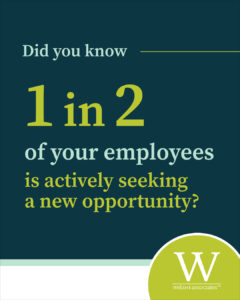 Recent data from Gallup shows nearly half of employees are actively looking for new jobs, with 77% leaving within just three months of beginning their search.
Recent data from Gallup shows nearly half of employees are actively looking for new jobs, with 77% leaving within just three months of beginning their search.
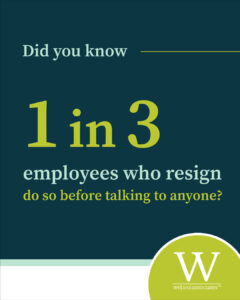 Poor communication can lead to unnecessary departures. Employees who don’t feel comfortable voicing their concerns may quietly disengage and seek new opportunities.
Poor communication can lead to unnecessary departures. Employees who don’t feel comfortable voicing their concerns may quietly disengage and seek new opportunities.
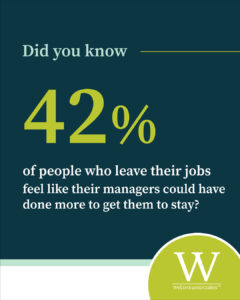 Managers often play a significant role in retention. By helping managers to recognize and address signs of disengagement early, organizations can build stronger teams.
We've come up with practical steps to counter the trends above. By focusing on retention as a part of your talent strategy, you’ll see benefits beyond just reduced hiring costs.
Managers often play a significant role in retention. By helping managers to recognize and address signs of disengagement early, organizations can build stronger teams.
We've come up with practical steps to counter the trends above. By focusing on retention as a part of your talent strategy, you’ll see benefits beyond just reduced hiring costs.
Ready to get started? Download our full whitepaper for deeper insights.
- Elevate: It's Your Move – August 2023
- Podcasts & Blogs
Podcasts & Blogs
The Welsh Wire
Known as The Welsh Wire, our podcasts and blogs are part of the helpful resources Welsh & Associates offers employers and job seekers. These weekly offerings feature professional recruiting expert Sheri Welsh. Listen in as leaders from a wide array of companies across the nation, including those in the greater West Michigan area, share their experience and insight on a variety of business topics including employee retention challenges and recruitment success stories.Subscribe to The Welsh Wire
Stay up-to-date and receive email notifications about new posts on The Welsh Wire.Podcasts
Blogs
- December 10, 2024 | The Welsh Wire: Brewing Success with Chris O'Neill of One Well Brewing
- October 22, 2024 | The Welsh Wire: Lessons from a Trailblazing Female CEO in Concrete ft. Adrienne Heidema
- September 24, 2024 | The Welsh Wire: Ken Bogard and Grace Gavin, Know Honesty
- August 13, 2024 | The Welsh Wire: Managing Business Growth and Family Dynamics ft. Michelle Timmerman of Direct Supply Inc.
- June 11, 2024 | The Welsh Wire: Bridging the STEM Talent Gap in Michigan Through College OPT Programs – Part Two
- #1275 (no title)
Subscribe to The Welsh Wire
Stay up-to-date and receive email notifications about new posts on The Welsh Wire. - Catch Up On An Episode of The Welsh Wire You Missed!
Catch Up On An Episode of The Welsh Wire You Missed!
Due to Michigan’s “Stay at Home, Stay Safe” order and to ensure the safety of our guests, The Welsh Wire podcast is on a temporary hiatus. We hope that you take this time to revisit an episode you missed or listen to one of your favorites again. Past episodes of The Welsh Wire can be found online in our podcast archive. Welsh & Associates remains dedicated to serving our clients and delivering top quality talent. You can reach our staff via phone 269.488.8836 or email: jobs@welshandassociates.net. We also encourage you to follow us on social media. Welsh & Associates can be found on Facebook, Twitter, LinkedIn, and YouTube. The Welsh Wire will plan to return when day-to-day business activities resume.Subscribe to The Welsh Wire podcast on iTunes for additional informative, entertaining interviews with west Michigan business leaders.
- Flexing During the Pandemic featuring Jeanne Bolhuis of Keyser Insurance Group
Flexing During the Pandemic featuring Jeanne Bolhuis of Keyser Insurance Group
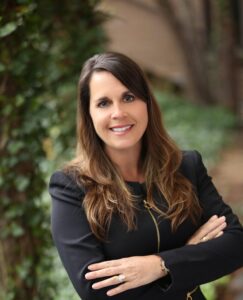
Working through the challenges of COVID and coming out the other side in a successful and profitable position can be a tough task for small businesses. One key is having flexibility in your talent acquisition and human resources (HR) practices, according to Jeanne Bolhuis, Chief Consulting Officer for Keyser, an insurance group and HR consulting service in Kalamazoo. She was interviewed by Sheri Welsh for this week’s The Welsh Wire podcast.
“The whole platform for recruiting shifted, right?” Bolhuis says. “And so in the way that either people couldn't work, or, you know, tied to unemployment benefits or safety or remote work and on site work. There are all these variables that created even more of a talent acquisition challenge on top of what we might have been dealing with previously.”
Bolhuis says right now it’s more important than ever to have a proactive, long-term strategy for getting the employees you need, which is one reason Keyser has partnered with Welsh & Associates to create a consistent flex talent acquisition model.
The podcast conversation highlighted that flexibility is important for every element of the HR arena, not just hiring.
“I think sometimes as HR professionals, one of the things that we strive to do is have the answers, we want to take care of people,” Bolhuis says. “And that's, I think, been the biggest challenge that I have seen with our clients in an HR world is not having the answers, because we haven't been here before. And also things are changing.”
Listen to Sheri’s full interview with Jeanne Bolhuis. Subscribe to The Welsh Wire podcast on iTunes for additional informative, entertaining interviews with West Michigan business leaders. - Thank You!
Thank You!
Your subscription has been confirmed. You’ve been added to our list and will hear from us soon. - The Welsh Wire Featuring Hugh Ingalls, Ingalls Pictures: Being Adaptive in Family Business
The Welsh Wire Featuring Hugh Ingalls, Ingalls Pictures: Being Adaptive in Family Business
 Like many small family-owned businesses, Ingalls Pictures in Grand Rapids, Mich., faced a lot of hurdles in overcoming the challenges of COVID-19 shutdowns and restrictions. But action cures all anxiety, says Hugh Ingalls, co-founder and co-owner. He was interviewed by Sheri Welsh for The Welsh Wire podcast, sponsored by Family Business Alliance.
Like many small family-owned businesses, Ingalls Pictures in Grand Rapids, Mich., faced a lot of hurdles in overcoming the challenges of COVID-19 shutdowns and restrictions. But action cures all anxiety, says Hugh Ingalls, co-founder and co-owner. He was interviewed by Sheri Welsh for The Welsh Wire podcast, sponsored by Family Business Alliance.The company’s experience and award-winning track record in cinema production helped Ingalls Pictures adapt to the new communications world of Zoom and live streaming.
“Oh, we were just crawling, scratching, and reaching out to anyone and everyone saying, hey, these are some of our capabilities,” he said. “For example, the Battle Creek Symphony no longer had in-person concerts, so we helped them transition to this whole virtual concert experience.”
Ingalls and his staff produced an inspirational video to help motivate their team. The pull-together efforts led them to grow revenue in 2020 by three percent over 2019.
Would Ingalls Pictures have gotten through COVID-19 restrictions if it had not been a family-owned company?
“It probably wouldn't exist, first off,” he says. “And then number two, now that we've been in this for so long we're doubling down on family. So our youngest brother is graduating college here in a few months, and he'll be joining us full time, which is super exciting. We're continuously looking at how we engage family deeper and deeper. It is family through and through.
"I think what it comes down to is that level of trust. In business and in life, trust is going to be at the core of pretty much everything that we do. So we have that beautiful level of trust, and then we can bypass all that time it takes to develop that trust to just get things done.”
Listen to Sheri's entire interview with Hugh Ingalls to learn more about Ingalls Pictures’ family success formula on this week’s The Welsh Wire podcast.
Subscribe to The Welsh Wire podcast on iTunes for additional informative, entertaining interviews with West Michigan business leaders.
- The Welsh Wire: AJ Willit of LogiQuip
The Welsh Wire: AJ Willit of LogiQuip
“Frankly, if I can do it just about anybody could.” The “it” is coming up with the money and expertise to buy out the owners of a successful Galesburg small business, LogiQuip. And the guy doing it was AJ Willit, current LogiQuip President/CEO. AJ shares his story of leadership transition in his interview with Sheri Welsh on The Welsh Wire podcast. AJ was brought on board LogiQuip, a healthcare storage solutions company, in 2015 to run the company while the two owners transitioned to other opportunities. But in mid-2016, AJ was asked if he wanted to purchase LogiQuip outright. The first step was coming up with the money. “There's a lot of resources out there. And literally, I started Googling,” he says, which got him in contact with the U.S. Small Business Administration. “They have some very nice programs for people that don't have a ton of equity to put in and need to borrow a ton of money, such as myself.” AJ’s loan ended up being backed by Michigan Strategic Fund and done by Fifth Third Bank. “It took a team of people from accountants, to lawyers, to lenders, to the Strategic Fund. I mean, it was a ton of people involved in this. And I had a lot of really smart people helping me. I would obviously advise people that if you're going to do something like this, you should surround yourself with really smart people.” AJ says buying a company requires time and patience. “There's gonna be lots of ups and downs. You know, I started everywhere from being really excited to oh, my gosh, what have I done? Why am I doing this? This is the worst idea ever! [To] okay, well, now, I know I'm doing it. Fortunately, we had a good team of people who helped me about the acquisition.” Listen to Sheri’s entire interview with AJ Willit.Subscribe to The Welsh Wire podcast on iTunes for additional informative, entertaining interviews with west Michigan business leaders.
- The Welsh Wire: Amy Ritsema, OnSite Wellness
The Welsh Wire: Amy Ritsema, OnSite Wellness
One of the biggest benefits to having a wellness program for employees is that is demonstrates that you value your workers as people. “When you offer a program that says, hey, we care about you, the employees really value that,” says Amy Ritsema, co-owner of OnSite Wellness in Grand Rapids. Their services include designing, developing, implementing and administering customized wellness programs for businesses. Ritsema was interviewed by Sheri Welsh for the Welsh Wire Podcast. “There are a lot of soft-sided returns (to wellness programs), things like productivity levels that increase when your employees are mentally and physically well. There are retention and recruitment opportunities when you have a wellness solution. The millennial generation, that younger generation, is looking for wellness solutions. So as you’re going out there and you’re hiring, there’s a lot to be said about being able to say hey, and we have a wellness program onsite that’s available for all of our employees.” Listen to Sheri's entire interview with Amy RitsemaSubscribe to The Welsh Wire podcast on iTunes for additional informative, entertaining interviews with west Michigan business leaders.
- The Welsh Wire: Amy Ritsema, OnSite Wellness for Retention and Recruitment
The Welsh Wire: Amy Ritsema, OnSite Wellness for Retention and Recruitment
It’s tough to recruit and retain talent in our evolving, post-COVID-19 environment. Employees who work in a company culture where they feel cared for are more apt to stay and be engaged in their jobs, according to Amy Ritsema, co-owner of Grand Rapids-based OnSite Wellness. She talked recently with Sheri Welsh for The Welsh Wire podcast. Workplace well-being includes flexible work schedules and perks like student loan repayments and identity theft protection, Ritsema says. “A lot of times when we talk wellness, people are thinking, oh, we're gonna do a water challenge, we're gonna do a steps challenge. And those are all great. We really want people to practice those healthy habits, they're fun, they can be a rewarding thing to do as an organization, we can have fun competitions that promote good camaraderie, but you have to think bigger picture.” That bigger picture means employers striving to create an environment that promotes a state of contentment, “Which allows an employee to flourish and achieve their full potential for the benefit of themselves and their organization,” she says. “So when we think about that, if we have an environment that promotes contentment, that's going to be huge because not only am I content at my job, that means I'm not looking, that means I'm buying in when I'm there, I'm present at my job.” Ritsema says it’s important that companies communicate the elements of their well-being philosophy, including website and social media promotion, messaging to employees, and explaining how you align your mission and values to include well-being. Learn more about how to use workplace well-being to enhance employee retention and recruitment. Listen to this week’s podcast with Amy Ritsema. Subscribe to The Welsh Wire podcast on iTunes for additional informative, entertaining interviews with West Michigan business leaders.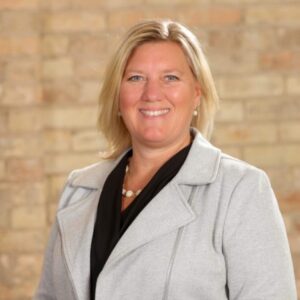
- The Welsh Wire: Ana Gonzalez of Grand Valley State University
The Welsh Wire: Ana Gonzalez of Grand Valley State University
New research on gender diversity in family businesses shows that women tend to be more upbeat about business performance than men -- but that changes if the women are in leadership positions, according to Ana Gonzalez, Director of the Family Owned Business Institute and Assistant Professor at the Management Department at Grand Valley State University. She was recently interviewed by Sheri Welsh for The Welsh Wire podcast, sponsored by the Family Business Alliance. “What we found was a very interesting thing because women involved in family business, not necessarily the leaders but women involved, are very optimistic when it comes to performance,” Gonzalez says. “So if you ask a woman how do you feel the business is going to do by the end of the year, she would say very good -- more than compared to men.” But when the women move into leadership roles, they tend to be a little more pessimistic and conservative, Gonzalez says. She believes it may have to do with gender attitudes that judge women leaders more harshly for their business mistakes. She says in terms of family business succession “maybe if we are training our daughters to become the future leaders, we should help them build the confidence to become more secure about their talent and what they are giving for the business. Letting them know if you make that mistake, that's okay.” Learn more about how gender diversity plays out in the family business environment when Ana Gonzalez talks with Sheri Welsh on this week’s The Welsh Wire podcast Listen to Sheri's full interview with Ana Gonzalez.
Subscribe to The Welsh Wire podcast on iTunes for additional informative, entertaining interviews with west Michigan business leaders.
- The Welsh Wire: Ana Gonzalez, Director of the Family Owned Business Institute
The Welsh Wire: Ana Gonzalez, Director of the Family Owned Business Institute
Family businesses perform better in highly competitive environments if they invest in risky activities like mergers and acquisitions, according to new research on risk aversion versus performance in family-owned firms.
Ana Gonzalez, Director of the Family Owned Business Institute and Assistant Professor at the Management Department at Grand Valley State University, talked about her findings when she was interviewed by Sheri Welsh for The Welsh Wire podcast, sponsored by the Family Business Alliance.
What family businesses could learn from the research is that an attitude of risk aversion can cause missed opportunities, Gonzalez says.
“You need to be proactive. You know, it's not about buying and buying businesses, of course, it’s more about being aware that there are things happening outside that you need to look for so that you don't miss or overlook opportunities.”
Gonzalez suggests family-owned firms can benefit from having an outside group of advisors.
“Outsiders that can help you identify those opportunities out there so that you don't overlook things that could be a good fit for your business.”
Another interesting finding from Gonzalez’s research is that family businesses don’t invest enough in research and development.
“And that's not an attitude, that’s sort of a behavior,” she says. “However, if you think about that sort of investment, it's very uncertain as opposed to buying a business because it's not tangible. So you invest in R&D and you have no idea if that's going to work, right? Well, you invest on an acquisition, at least you see where you have some immediate results.”
Listen to Sheri’s full interview with Ana Gonzalez to learn more.
Subscribe to The Welsh Wire podcast on iTunes for additional informative, entertaining interviews with west Michigan business leaders. - The Welsh Wire: Becky Poe, Agritek Industries
The Welsh Wire: Becky Poe, Agritek Industries
In today’s tight labor market, it makes sense to look for opportunities to nurture high school students for future employment in your industry. How do you make that happen? “Number one, have a good relationship with your local school district and their tech center,” says Becky Poe, student employee development director for Agritek Industries, a metal product manufacturing company in Holland. Poe was recently interviewed by Sheri Welsh for the weekly Welsh Wire podcast and talked about Agritek’s well-developed business-led student employee program. Poe says for such a program to be successful, it’s crucial that a company owner, like Agritek’s Larry Kooiker, be willing to make an investment in young people. “It does take time to train and serve as a mentor. It’s a cultural part of your business. If it’s not a part of who you are, I don’t know how well this would work for you,” she says. Poe tells Sheri that if you’re going to employ high school students in your company, you need to make sure you are current on youth standards labor law. Listen to Sheri’s entire interview with Becky Poe.Subscribe to The Welsh Wire podcast on iTunes for additional informative, entertaining interviews with west Michigan business leaders.
- The Welsh Wire: Best of 2018
The Welsh Wire: Best of 2018
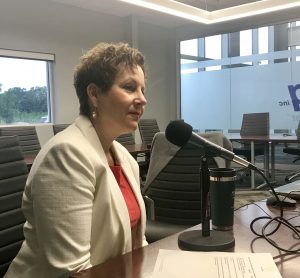 Sheri Welsh interviewed lots of fascinating business leaders on The Welsh Wire podcast this year. Listen to this week’s show to hear from some of her best guests:
Sheri Welsh interviewed lots of fascinating business leaders on The Welsh Wire podcast this year. Listen to this week’s show to hear from some of her best guests:
- One of the first steps in managing risk in your business is to identify what the risks are. And who knows better what risks are out there than the men and women on the front lines: your employees. “We use as an employee interview system, we actually get a list of the employees that a company will want us to interview confidentially and we ask them what they think the risk issues are,” says Randy Boss, a risk management expert and partner in Ottawa Kent Insurance. Presented in association with the Family Business Alliance.
- A notable west Michigan’s small business leader, author and public speaking expert says every great presentation zeros in on the needs of the audience. “It's not what you want to tell someone, it's what does that audience need to hear,” says Cynthia Kay. “I have a saying that I do in every single class -- at the heart of every great presentation is a need, that one sentence that people need to think about.“
- One of the biggest benefits to having a wellness program for employees is that is demonstrates that you value your workers as people. “When you offer a program that says, hey, we care about you, the employees really value that,” says Amy Ritsema, co-owner of OnSite Wellness. Their services include designing, developing, implementing and administering customized wellness programs for businesses.
- What is leadership? How is it different than management?“A lot of people think about leadership as the people part, the part where you lead people. Management is about managing things because you really can't manage people,” says executive coach Mary Jo Asmus, founder and President of Aspire Collaborative Services LLC. “You don't lead things, you lead people. People are messy or complex. If you try to manage people you're going to get into a heap of trouble.”
Subscribe to The Welsh Wire podcast on iTunes for additional informative, entertaining interviews with west Michigan business leaders.
- The Welsh Wire: Best of 2019
The Welsh Wire: Best of 2019
Sheri Welsh talked to many outstanding business leaders on The Welsh Wire podcast in 2019. Listen to this week’s show to hear top insights from some of her best guests. When you’ve been around for over four decades and been known by the same name that entire time, it’s a bold decision to reboot with a new company identity. But Lake Michigan Mailers, a Kalamazoo data document and distribution services company now called Marana Group, believed that a new name was needed to reflect the fact that in 2019 the company doesn’t just mail stuff -- it provides a broad range of data, document, and distribution solutions, according to David Rhoa, company president and son of the Marana Group founders. “Our biggest concern, and we vocalized this in the very beginning, [is] we do not want to give the feeling that we've been sold or purchased,” Rhoa said. One way to handle risk in your family-owned business is by being a turtle -- huddling under a shell for protection. But a leading expert on risk management says a better approach is to be willing to stick your neck out. Matt Rampe, senior manager of the Forensic, Valuation & Litigation Services Group at Beene Garter in Grand Rapids, says one of the best ways to mitigate risk is by being innovative. “You can tactically do things like trying new product lines, looking at new geographies, looking at new customers, new products,” he says. “You can't get caught off guard if you're always looking.” When someone owns the company, it’s easy to get immersed in the day-to-day minutiae of running the firm. But leadership expert and professional facilitator Dr. Dino Signore says a more valuable use of a company leader’s time is to step back and focus on setting the vision. “Once they’ve set that vision, then they start building the management team around that. Then they have to orchestrate change. That could be the hardest part for them is that now something's going to change -- their role, their people's role, all has to change. And then what comes after that is dealing with managing conflict. How do they manage through conflict is what they kind of look at.” Recent cybersecurity disasters around the country this year underscore the importance of having layers of security for your business assets. “A cloud layer so somebody's watching the dark web or any of my passwords out there, let's have a firewall so the bad guys don't get in, let's protect the desktop with antivirus and patching and then let's educate our people,” says Mike Ritsema, President of i3 Business Solutions in Grand Rapids. And lastly, let's have a backup so that if something bad does happen, I can go back two or four hours, get all the information I lost or was encrypted. Let's make sure we've got layers of technology security, and it's updated every day, every week [so] somebody is keeping an eye on it.” Learn to the Best of 2019 Welsh Wire podcast.
Subscribe to The Welsh Wire podcast on iTunes for additional informative, entertaining interviews with west Michigan business leaders.
- The Welsh Wire: Best of 2021 Business Management Insights
The Welsh Wire: Best of 2021 Business Management Insights
This week’s The Welsh Wire podcast showcases some of the best business management insights gleaned from Sheri Welsh’s interviews in 2021 with West Michigan business leaders.
Amy Ritsema, co-owner of Grand Rapids-based OnSite Wellness, explained that employees who work in a company culture where they feel cared for are more apt to stay and be engaged in their jobs. Workplace well-being includes flexible work schedules and perks like student loan repayments and identity theft protection.
“A lot of times when we talk wellness, people are thinking, oh, we're gonna do a water challenge, we're gonna do a steps challenge. And those are all great," Ritsema said. "We really want people to practice those healthy habits, they're fun, they can be a rewarding thing to do as an organization, we can have fun competitions that promote good camaraderie, but you have to think bigger picture.”
Culture is also important to Stacy Paul, CEO of Array of Engineers, a certified women-owned small business in Grand Rapids and a member of the Michigan 50 Companies to Watch. She said they recruit talent to fit the firm’s core values.
“Promotion of innovation and creativity, not ever wanting to put somebody in a box, allowing them to expand and be super creative, no matter what the task is,” Paul said. “And that goes along with helping each employee reach their highest potential.”
In cooperation with the Family Business Alliance, Welsh interviewed a variety of experts to get their advice on “rightsizing risk.” Kristen Spence, Fraud & Litigation Manager for Hungerford Nichols CPAs + Advisors, and Katy Felver, Business Advisor for Hungerford Nichols CPAs + Advisors, talked about fraud prevention. One of the simplest steps to take is regularly checking your bank statements.
“I know that those of you that are business owners may think, oh, I don't have time, I have people to do this for me, but I will tell you, you will catch a lot of things if you periodically run and check the bank statement, just scroll through and see what a few things are,” said Spence.
Spence and Felver also discussed how to spot red flag warnings in your payroll operations, securely manage your manufacturing inventory and reduce risk by implementing proper internal controls.
John Ruther, managing director for consulting firm O’Keefe, told Welsh that business owners can rightsize their risk and improve opportunities for future growth by tightening financials and making sure they have good financial management. Ultimately, the goal of good financial management is to create value for the future, Ruther said.
“Making sure that somebody can see three to five years of really good solid financials, that you can't poke holes in, it turns out to be really valuable.”
It’s important to think about how a divorce might affect your family-owned business. Pre-nups and other legal preparations are a crucial part of rightsizing your risk, according to Paul McCarthy, attorney with Rhoades McKee in Grand Rapids.
McCarthy explained, “If the probability of a divorce is 50/50, for any given couple in the country, and of course, everyone thinks, well, that's not going to be me but statistically speaking, if you have four shareholders and a family held company, you're going to experience a divorce. The chances aren't just more likely than not, it is vastly probable.”
Listen to this week’s podcast to hear more of 2021’s best business management advice. Subscribe to The Welsh Wire podcast on iTunes for additional informative, entertaining interviews with West Michigan business leaders. - The Welsh Wire: Bill Boersma of OC Consulting Group
The Welsh Wire: Bill Boersma of OC Consulting Group
When it comes to life insurance, business owners have to deal with a key factor of uncertainty -- that they often don’t know what they don’t know. “Life Insurance is one of these things that is amazingly complex, it's much more complex than people understand it to be,” says Bill Boersma, the founder, owner and president of OC Consulting Group, a fee-based life insurance consulting, audit and management practice located in Grand Rapids and operating nationally. “But the irony there, is it seems so simple. I take a premium, I get a death benefit. What could be more simple?” Boersma shared his insights on life insurance in his interview with Sheri Welsh for The Welsh Wire podcast, sponsored by the Family Business Alliance. “I [advised] a business owner where he just had a term policy, just had a simple term policy for business purposes,” Boersma said. “And it turns out that this gentleman from a health perspective was dramatically better today than he was back when he bought this insurance. So we ultimately put them back into underwriting, got a new policy issued for more money that lasts twice as long for half the premium he was paying.” He told Sheri that life insurance can be full of surprises that, if not fully understood, can lead to devastating repercussions. “Somebody said, well, I don't think I want this policy more, I'm going to get rid of it. And I said, don't do that until you let me do a tax analysis. And I come back and said, well, if you do that, you get to pay ordinary income tax on $500,000 because that loan is forgiven and that's forgiveness of debt, which under the Internal Revenue Code is going to be taxable.” Listen to Sheri’s entire interview with Bill Boersma.Subscribe to The Welsh Wire podcast on iTunes for additional informative, entertaining interviews with west Michigan business leaders.
- The Welsh Wire: Brad Morrill, Crystal Flash
The Welsh Wire: Brad Morrill, Crystal Flash
Setting up a Customer Relationship Management system, or CRM, can improve the way your small business interacts with customers and potential clients. Brad Morrill, director of commercial business for Crystal Flash, a 100 percent employee owned fuel supplier based in Grand Rapids, was recently interviewed by Sheri Welsh on her weekly Welsh Wire podcast and shared some of his important insights on how a CRM has improved Crystal Flash’s business processes. “We’re trying to capture all the connections that have,” he says. “When a person calls in and asks us questions, they need help, they’re looking for a new product or something, we try to capture every touch point that we have with a customer so we can see that history over time. Phone calls, visits by sales people...we’re trying to capture information about the people themselves so that we can remember that, remember names.” Integrating that information with Crystal Flash’s back office operations gives their sales representatives an opportunity to provide better service, Morrill says. “We’ve got five years of transactional history immediately at a click so someone can see what the customer has done with us for five years, every year. So, every gallon of diesel, how many gallons of propane, etcetera, so we know exactly what’s going on with this customer. One place to kind of view the whole setup with the customer.” Listen to Sheri’s entire interview with Brad Morrill. Subscribe to The Welsh Wire podcast on iTunes for additional informative, entertaining interviews with west Michigan business leaders. - The Welsh Wire: Bradley Hartwell, Northtown Real Estate
The Welsh Wire: Bradley Hartwell, Northtown Real Estate
Grand Rapids’ booming economy has led to a shortage of industrial and office space and a surge in new construction, according to Bradley Hartwell, owner of Northtown Real Estate in Grand Rapids -- a recent guest on The Welsh Wire podcast. “It's tough to find existing industrial space that's of any quality,” Bradley tells interviewer Sheri Welsh. “So it's interesting because it's often less cost effective to build new construction, but we're seeing more and more of it. In the downtown there's a lot of (office) square footage that is either under construction or it's being sort of redeveloped and re-purposed. It's pretty exciting to see new tenants coming to downtown Grand Rapids.” Bradley says that your office environment can play a key role in talent acquisition and retention, and help attract workers from regions that offer higher wages and benefits. “If you have a really cool office space and a really cool office environment I think you will tend to attract innovative, different-thinking, talented people,” he says. “There's all these different qualitative factors instead of quantitative factors where you'll leave your office and walk a couple blocks to go get lunch at some local restaurant and you'll bump into two people end up doing deals with those people down the road. Typically the innovative, design-type thinkers prefer being in the downtown just because there's cool stuff going. You can walk to things, you can go to a concert after work. People want to be around other people and the vibrancy and walk-ability of a downtown community or at least a closer-knit community.” Listen to Sheri’s entire interview with Bradley Hartwell.Subscribe to The Welsh Wire podcast on iTunes for additional informative, entertaining interviews with west Michigan business leaders.
- The Welsh Wire: Brewing Success with Chris O'Neill of One Well Brewing
The Welsh Wire: Brewing Success with Chris O'Neill of One Well Brewing
This month on The Welsh Wire, Sheri Welsh dives into the inspiring entrepreneurial journey of Chris O’Neill, the visionary behind One Well Brewing—a beloved Kalamazoo establishment celebrating 10 years of business success. O’Neill’s story began with a passion for homebrewing and a bold decision to leave the corporate world to chase his dream of entrepreneurship. “I didn’t really know that beer was going to be what I was going to do, but I was convinced at that point that the entrepreneur pathway was what I needed to go down,” he says. “There was already a lot of precedent set for beer and Kalamazoo, and I wanted to be a part of that.” O’Neill shares how he navigated the challenges of taking over sole ownership after a partnership split and stresses the importance of constant learning and improvement. His strategy? Observe competitors through the eyes of a customer. “I think that the secret sauce really has been to continue to go out, to look at what other people are doing, to take things in from the perspective of the customer,” he says. O’Neill credits the support of organizations like SCORE and the foundation of a strong business plan as key to his success. He also discusses his vision for One Well’s future, which focuses on leadership development and potential expansion. “We’re trying to cultivate a good leadership team and make sure that we have the right people at one location, so that hopefully moving forward we might be able to split some things up, move some people up, and get another location.” Listen to the full conversation, and don’t forget to subscribe to The Welsh Wire on iTunes for more engaging interviews with West Michigan business leaders. - The Welsh Wire: Brian Calley, SBAM President
The Welsh Wire: Brian Calley, SBAM President
Right now many members of our community are navigating unexpected career changes or are evaluating taking their skills down a different professional path. While this may seem daunting and worrisome, we wanted to share encouraging insight from one such individual who recently underwent a mid-life career change. One of Michigan’s most experienced and popular public servants recently went through a career transition. Brian Calley had the honor of serving as Michigan’s 63rd Lieutenant Governor from 2011-2018. Prior to this appointment, he was a two-term state representative. However, after an unsuccessful bid to become the GOP gubernatorial nominee in 2018, Calley switched gears professionally. Calley returned his focus to his business background which includes a bachelor's degree in business administration from Michigan State University and a Master's in Business Administration from Grand Valley State University. In January 2019 Calley joined the Small Business Association of Michigan (SBAM), where he currently serves as president and leads the group's lobbying and communications efforts Calley recently discussed his thoughts on career transition in an interview with Sheri Welsh for The Welsh Wire podcast. “The role of SBAM and the way that my background has prepared me for this, it really feels so natural, like everything came together and in my life path in a way that just uniquely prepared me for this specific organization,” he says. “And it's really cool to think about it in those terms.” Calley says the move to SBAM really improved his quality of life. “I look very fondly at my time in state government. I am so thankful to have had that opportunity, to serve in that way. And now I've found something that has given me the ability to still be involved in the political and policy making world, but also to have a life.” Hear more of Calley’s advice on embracing career change on this week’s Welsh Wire podcast. Listen to Sheri’s full interview with Brian Calley. Subscribe to The Welsh Wire podcast on iTunes for additional informative, entertaining interviews with west Michigan business leaders.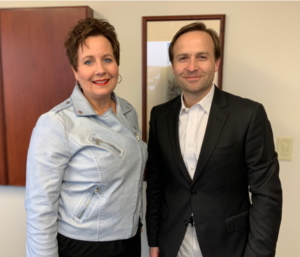
- The Welsh Wire: Bridging the STEM Talent Gap in Michigan Through College OPT Programs – Part One
The Welsh Wire: Bridging the STEM Talent Gap in Michigan Through College OPT Programs – Part One
In part one of a special presentation on The Welsh Wire, Sheri Welsh discusses a new collaboration addressing Michigan's urgent need for well-trained STEM graduates, joined by guests from Western Michigan University (WMU). This collaboration between Welsh & Associates and WMU's Optional Practical Training (OPT) program will connect local businesses with international STEM students at WMU, guiding them through the legal employment requirements. Sheri is joined by Dr. Steve Butt, Dean of WMU’s College of Engineering and Applied Sciences; Dr. Paulo Zagalo-Melo, Associate Provost for WMU’s Institute for Global Education; and Lee Ryder, former Senior Director of International Student and Scholar Services at WMU. Together, they explore how this collaboration will benefit both students and local businesses. In the presentation, Sheri describes how the war for talent, particularly in STEM fields, is going to be a 20-year challenge for employers, driven by long-term demographic factors affecting Michigan. From 2010 to 2020, Michigan was ranked 46 in population growth among the 47 states that saw an increase during that time. From 2020 to 2022, it was one of 19 states that experienced a population decline. Additionally, Michigan's population is aging faster than the national average. Currently, it ranks as the 40th oldest state in the U.S. based on the median age of its residents. Projections suggest that the population of prime working-age adults (ages 25-54) will remain stable through 2050. However, if no changes are made, Michigan's younger population is expected to decline by 5%, while the older population (age 55+) is projected to increase by 14%. How can your business adapt to these demographic factors and get the STEM employees it needs to be successful? Part two of this discussion will be available on June 11. Sheri and her guests from WMU will unveil an innovative pilot program designed to screen and vet STEM job candidates as well as streamline the paperwork process for hiring international graduates. Listen to the full podcast of The Welsh Wire and subscribe on iTunes for additional informative, entertaining interviews with West Michigan business leaders. - The Welsh Wire: Bridging the STEM Talent Gap in Michigan Through College OPT Programs – Part Two
The Welsh Wire: Bridging the STEM Talent Gap in Michigan Through College OPT Programs – Part Two
How can your business adapt to the demographic changes rolling across Michigan and get the employees you need to be successful? Last month, in the first part of a special presentation on The Welsh Wire, Sheri and her guests laid the groundwork for tackling Michigan’s pressing need for well-trained STEM graduates. Don’t miss out – listen to part one on SoundCloud. This month in part two, Sheri continues her discussion with Dr. Steve Butt, Dean of WMU’s College of Engineering and Applied Sciences; Dr. Paulo Zagalo-Melo, Associate Provost for WMU’s Institute for Global Education; and Lee Ryder, former Senior Director of International Student and Scholar Services at WMU. Together, they explore an innovative pilot program aimed at screening and vetting STEM job candidates as well as simplifying the paperwork process for hiring international graduates. Under this program, Welsh & Associates conducts initial screenings with international students interested in local business opportunities. They then provide a detailed summary of each student’s skills, interests, and long-term career goals. “We’re offering this as a service to forge valuable connections, benefiting the university, students, and local businesses,” Sheri says. “Tell us what you need, and we’ll connect you with as many qualified students as possible. Then, you interview the students with your team. You select and decide who you want to hire.” Dr. Paulo Zagalo-Melo highlights an additional benefit of hiring international students: expanding your business’s global network. “These students are from countries where you may not have many connections. As your employee, they can help you establish your business in the markets of the countries they’re from, which is another dimension that is overlooked but is an important one,” Zagalo-Melo explains. Listen to the full podcast of The Welsh Wire and subscribe on iTunes for additional informative, entertaining interviews with West Michigan business leaders. - The Welsh Wire: Building for Good - Local Leader Michael Sytsma Helps Make a Non-profit Vision a Reality
The Welsh Wire: Building Good - Local Leader Michael Sytsma Helps Make a Non-profit Vision a Reality
A West Michigan banker’s efforts to help build a home for 27 orphans in the Democratic Republic of the Congo (DRC) offer important leadership lessons pertinent to all kinds of business and social challenges. Sheri Welsh talked on The Welsh Wire with Michael Sytsma, West Michigan President at KeyBank. Sytsma learned about the orphans’ urgent needs through his friendship with Christophe Muganza, a refugee from the DRC who became a U.S. citizen in 2020. “These are children in the DRC who truly were living the streets, by themselves with no support,” Sytsma says. To address the crisis, he and Muganza created an organization called Christophe’s Children. A capital campaign by the organization is underway to raise $130,000 to construct a permanent home for the children in Kalehe, Muganza’s hometown. Sytsma says he has found that his involvement with the project contained insights applicable to addressing many kinds of problems. “The takeaway is if you see something that you're passionate about that needs to change, that you need to figure out a way to make it better,” he says. “Lead boldly, follow that passion and I think you'll be surprised how many people will jump on board. “Because that's all we really did is we just saw this and we followed a man (Muganza) that has an incredible heart and has had a vision. And we get to kind of go along for the ride, and maybe refine some of that and find ways to get there. But he made the decision. And that's the big piece.”Learn how you can help Christophe’s Children by visiting their website.
Listen to The Welsh Wire podcast featuring Michael Sytsma in its entirety.
Subscribe to The Welsh Wire podcast on iTunes for additional informative, entertaining interviews with West Michigan business leaders.
- The Welsh Wire: Career Evolution for Women with Blank Canvas Consulting
The Welsh Wire: Career Evolution for Women with Blank Canvas Consulting
A west Michigan business owner has launched a new program aimed at providing education, guidance, and validation to women who are gliding onto new career paths. Mary Jo Baweja, a clinical and organizational psychologist and president of Blank Canvas Consulting, talked with Sheri Welsh on The Welsh Wire podcast about her program, Career Evolution for Women. “As women, we don't have generations of role models retiring after our big careers and moving on to other things,” Baweja says. “Men have been doing this for generations, they've got role models. Women don't have that. I discovered the needs of women when they evolve out of their career. How do they have those needs met? What is their career doing for them? It's different than how it is with men.” Baweja’s Career Evolution for Women program is a 90-day activity designed around a cohort model that creates a community of women who are dealing with similar career challenges, she says. “The goal is really to get them to work with each other, learn from each other, and learn some of these expectations and begin to put their plan in place. We obtain a lot of our value through our careers and through our roles. My career is my baby. So first of all, am I confident that I'm handing my baby off in good hands? It’s like a three-legged stool of confidence: it's financial, it's my legacy, and it's who I'm going to be when I leave this role. So, having confidence in those three areas is key.” The next Career Evolution for Women program starts after Labor Day of this year. To learn more about Baweja and her program for women in career evolution, visit the Blank Canvas Consulting website. Listen to the full conversation between Mary Jo Baweja and Sheri Welsh on this week’s The Welsh Wire podcast. Subscribe to The Welsh Wire on iTunes for additional informative, entertaining interviews with west Michigan business leaders. - The Welsh Wire: Chris Shires, Gilmore Car Museum
The Welsh Wire: Chris Shires, Gilmore Car Museum
What’s it like running USA Today’s #1 Michigan tourist destination? Much like running a successful small business. “Trying to forecast the future, trying to stay on top,” says Chris Shires, executive director of the Gilmore Car Museum in Hickory Corners. Chris appears on this week’s Welsh Wire podcast with Sheri Welsh. “We’ve had year-after-year of success, so how do we maintain that success? How did we do last week compared to this week?” The Gilmore Car Museum is Trip Advisor’s top rank car museum in the country and for the past decade has enjoyed record-breaking attendance. But that doesn’t mean they’re resting on their laurels. “We’re tying to make sure that we’re constantly on-target and on-the-ball,” he says. “(But also) making sure that we don’t overwhelm ourselves, that we’re not working too hard.” Chris pays close attention to customer feedback. “Our visitors feel a strong sense of ownership, so, we want to try and incorporate their ideas or at least hear their ideas,” he says. Watch Sheri's entire interview with Chris Shires or listen to the audio.Subscribe to The Welsh Wire podcast on iTunes for additional informative, entertaining interviews with west Michigan business leaders.
- The Welsh Wire: Culture Insights
The Welsh Wire: Culture Insights
With employment markets tight all across west Michigan, more and more businesses are focusing on the ways that great company culture can be an important part of their attraction and retention strategy. Here are insights from recent Welsh Wire guests: “I like to say that as much as we talk about individual identity development, organizational cultures, organizational identity, if you want to develop your organizational culture, then you work on these identity pieces,” says Tom Emigh, Leadership Coach & Principal for Acorn Leadership. “Employee engagement literature talks about all the great outcomes that you get when employees are engaged. They work harder, they stay with you, they're less likely to be injured, they're less likely to be unnecessarily critical. They're more likely to take risks and see what's going on. And employees who are engaged are often [part of] really strong, positive, vibrant cultures.” Stacey Hamlin, CTS Telecom president and CEO, says they have a unique company culture. “We have an amazing staff, they're so engaged, are so committed,” she says. “We have a mantra that we answered the call. And it's a dual meaning. It's our calling to serve our customers. Wade Wyant, Executive Advisor/Scaling Up Coach at Red Wagon Advisors, says top down accountability is an important element of successful culture. “The more you can build a culture and a system that we're talking about -- pure accountability, it’s where peers are coming together, just like in a sporting team. You see this all the time and it happens.” Community involvement is a key part of the culture at TowerPinkster, according to Jennifer Swan, Senior Architectural Project Coordinator. “We actively support the communities in which we live, work and play,” she says. “And so as a company, we feel it really is our responsibility to our staff to expose them to what community opportunities exist out there, kind of what that looks like and feels like -- anything from industry events to just supporting the local nonprofit organizations. We really just try to get our folks out there and really experience what it's all about.” Learn more about nurturing company culture on this week’s Welsh Wire podcast.
Subscribe to The Welsh Wire podcast on iTunes for additional informative, entertaining interviews with west Michigan business leaders.
- The Welsh Wire: Cynthia Kay, Cynthia Kay & Company Media Production
The Welsh Wire: Cynthia Kay, Cynthia Kay & Company Media Production
A notable west Michigan’s small business leader, author and public speaking expert says every great presentation zeros in on the needs of the audience. “It's not what you want to tell someone, it's what does that audience need to hear,” Cynthia Kay tells Sheri Welsh in their interview for The Welsh Wire. “I have a saying that I do in every single class -- at the heart of every great presentation is a need, that one sentence that people need to think about. “Cynthia is the longtime owner of Cynthia Kay & Company Media Production in Grand Rapids and has served in leadership positions in numerous business associations and volunteer organizations. She is also a well-known executive coach and communications trainer. When making presentations, business leaders need to use concise, powerful language language that connects with people, she says. “Your language has to be different -- scripted, colorful and active. The other thing that people need to think about is that often their visuals are just awful. They are old, they're cluttered, they're ordinary clip art. You have to really look at remaking visuals.” Finally, she recommends giving a spectacular presentation every time, with all your energy. “And be open to receiving feedback” so you can improve, she says. Listen to Sheri’s entire interview with Cynthia KaySubscribe to The Welsh Wire podcast on iTunes for additional informative, entertaining interviews with west Michigan business leaders.
- The Welsh Wire: Cynthia Kay, Cynthia Kay and Company
The Welsh Wire: Cynthia Kay, Cynthia Kay and Company
Video interviews with current employees, used on your website and in social media posts, can play a really important role in enhancing employee acquisition. But you need to be consistent and in it for the long run. “What we’re really looking for is building a program, building a presence, having people become aware of your company, understanding your brand, feeling comfortable with it,” says video expert Cynthia Kay, owner of Cynthia Kay and Company in Grand Rapids. “And that takes some time. So, if you’re in it for the long haul you want to think about that.” Cynthia was recently interviewed by Sheri Welsh for the Welsh Wire podcast. Prospective employees want to hear someone from your firm “tell their company story,” Cynthia says. And video is a great way to tell that story because it’s authentic and believable. “When done well it’s a phenomenal recruitment tool,” she says. Other small business video tips from Cynthia:- Keep it fresh by constantly adding new content
- Keep it simple -- don’t overproduce
- Look for employee achievements you can highlight
Subscribe to The Welsh Wire podcast on iTunes for additional informative, entertaining interviews with west Michigan business leaders.
- The Welsh Wire: Cynthia Kay, Cynthia Kay and Company and Author of Small Business for Big Thinkers
The Welsh Wire: Cynthia Kay, Cynthia Kay and Company and Author of Small Business for Big Thinkers
As a small business owner, how do you know when you’re ready to go after big customers?
“I think you have to be really honest with yourself because if you’re expecting to hit a home run right away it’s just not going to happen,” says Cynthia Kay, owner and President of Cynthia Kay and Company, a video production firm in Grand Rapids. Cynthia has literally written the book on this topic: “Small Business for Big Thinkers” and is the guest in this week’s Welsh Wire podcast interview with Sheri Welsh.
Kay tells Sheri that small businesses have to be ready for their big break. “One of the things I say to people is have you built out a really good infrastructure for your business? Do you have really good processes in place? Because if you don’t, it will be chaos.”
Also important, says Kay, is being willing to adapt to whatever billing and reporting procedures are required by a big client.
Listen to Sheri’s entire interview with Cynthia Kay.
Subscribe to The Welsh Wire podcast on iTunes for additional informative, entertaining interviews with west Michigan business leaders.
- The Welsh Wire: David Campbell, Kalamazoo Regional Educational Service Agency (KRESA)
The Welsh Wire: David Campbell, Kalamazoo Regional Educational Service Agency (KRESA)
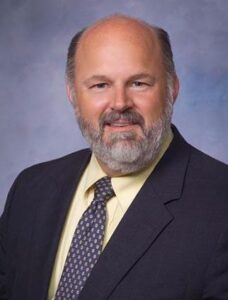 The support of the business community is vital to successfully redesigning southwest Michigan’s career and technical education system, according to David Campbell, superintendent of the Kalamazoo Regional Educational Service Agency (KRESA), an intermediate school district serving the students, families, and schools of nine school districts. Campbell spoke with Sheri Welsh on The Welsh Wire podcast.
“One of my favorite quotes is an old African proverb that says if you want to go fast, go alone, but if you want to go far, go together,” he says. “One of the most important components to developing an outstanding world-class career tech system is to work very closely with the business community, because the business community obviously knows what they need more than we do. We understand kids, we understand where kids are at, we understand child development, but we need the business community's support in a lot of different ways.”
Campbell says he wants to help address the big disconnect between the skills that kids walk out of high school with and the skills that employers need.
“A lot of times we're focused on a degree or too focused on degrees and not focused enough on skills. The core skills that we hear about over and over and over we call 21st century skills; common things like collaboration and critical thinking, creativity, and communication skills.”
Campbell praises the involvement of economic development advisors Southwest Michigan First in helping to lay the groundwork for a new career and technical education center.
“They have convened this private public partnership that is deep and it's involved in the planning processes. There's even a possibility that this partnership might even be willing to fund a new center,” he says.
Learn more about KRESA’s involvement in skills and career development on this week’s The Welsh Wire podcast. Listen to Sheri’s full interview with David Campbell.
Subscribe to The Welsh Wire podcast on iTunes for additional informative, entertaining interviews with west Michigan business leaders.
The support of the business community is vital to successfully redesigning southwest Michigan’s career and technical education system, according to David Campbell, superintendent of the Kalamazoo Regional Educational Service Agency (KRESA), an intermediate school district serving the students, families, and schools of nine school districts. Campbell spoke with Sheri Welsh on The Welsh Wire podcast.
“One of my favorite quotes is an old African proverb that says if you want to go fast, go alone, but if you want to go far, go together,” he says. “One of the most important components to developing an outstanding world-class career tech system is to work very closely with the business community, because the business community obviously knows what they need more than we do. We understand kids, we understand where kids are at, we understand child development, but we need the business community's support in a lot of different ways.”
Campbell says he wants to help address the big disconnect between the skills that kids walk out of high school with and the skills that employers need.
“A lot of times we're focused on a degree or too focused on degrees and not focused enough on skills. The core skills that we hear about over and over and over we call 21st century skills; common things like collaboration and critical thinking, creativity, and communication skills.”
Campbell praises the involvement of economic development advisors Southwest Michigan First in helping to lay the groundwork for a new career and technical education center.
“They have convened this private public partnership that is deep and it's involved in the planning processes. There's even a possibility that this partnership might even be willing to fund a new center,” he says.
Learn more about KRESA’s involvement in skills and career development on this week’s The Welsh Wire podcast. Listen to Sheri’s full interview with David Campbell.
Subscribe to The Welsh Wire podcast on iTunes for additional informative, entertaining interviews with west Michigan business leaders. - The Welsh Wire: David Rhoa of Marana Group
The Welsh Wire: David Rhoa of Marana Group
When you’ve been around for over four decades and been known by the same name that entire time, it’s a bold decision to reboot with a new company identity. But Lake Michigan Mailers, a Kalamazoo data document and distribution services company now called Marana Group, believed that a new name was needed to reflect the fact that in 2019 the company doesn’t just mail stuff -- it provides a broad range of data, document, and distribution solutions, according to David Rhoa, company president and son of the Marana Group founders. Rhoa talked about the process of rebranding with Sheri Welsh for The Welsh Wire podcast. “Our biggest concern, and we vocalized this in the very beginning, [is] we do not want to give the feeling that we've been sold or purchased,” Rhoa said. He addressed that concern in part by commissioning a video by Cynthia Kay & Company (Kay has been a frequent guest on The Welsh Wire.) If you want to be successful in re-branding your company, focus on effective communications, he says. “My advice that I would give to others is that it's more than just a press release. It's a complete communications program with everybody from your shareholders and stakeholders and your associates, all the way to your most important client or your most important vendor. Make certain that the message that you're sending out is your message, in your voice, directly to customers and vendors in the community in a way that makes sense to you.” Rhoa also suggests that you get professional help in your rebranding efforts. “You don't have to do the heavy lifting yourself. There are people who do this for a living. It's a thing that you're going to do once, maybe twice in a company's life-cycle, as far as naming and branding a company or naming and branding a product. But there are people who are out there who do this everyday -- so you don't have to do this alone.” Learn more about how Lake Michigan Mailers successfully transitioned to Marana Group by listening to Sheri Welsh’s entire The Welsh Wire podcast interview with David Rhoa. Listen to Sheri’s entire interview with David Rhoa.
Subscribe to The Welsh Wire podcast on iTunes for additional informative, entertaining interviews with west Michigan business leaders.
- The Welsh Wire: Dr. Dino Signore
The Welsh Wire: Dr. Dino Signore
When someone owns the company, it’s easy to get immersed in the day-to-day minutiae of running the firm. But leadership expert and professional facilitator Dr. Dino Signore says a more valuable use of a company leader’s time is to step back and focus on setting the vision. “Once they’ve set that vision, then they start building the management team around that,” he tell Sheri Welsh in his interview for The Welsh Wire podcast, sponsored by the Family Business Alliance. “Then they have to orchestrate change. That could be the hardest part for them is that now something's going to change -- their role, their people's role, all has to change. And then what comes after that is dealing with managing conflict. How do they manage through conflict is what they kind of look at.” Signore shares his “six strategy questions” with Sheri and notes that “strategy is an executive way of thinking, and when I work with a lot of those smaller firms that's yet what they're developing, that ability to think strategically. Because you have to do it all the time. So it's a part of what I do is I have the model and I try to teach the model so that they can continue to do it all the time. [It] has to have this continuity aspect to it has to be constantly done,” he says. Signore tries to help his clients understand the concept of real-time strategic planning. “You have that vision, that mission, that touch point for who you are, and who you want to become, and you're funneling every action and every activity through that and saying, does that match in real time? You're constantly updating the strategy when it becomes a way of thinking as opposed to 10 items on a board.” he says. Listen to Sheri’s entire interview with Dr Dino Signore.
Subscribe to The Welsh Wire podcast on iTunes for additional informative, entertaining interviews with west Michigan business leaders.
- The Welsh Wire: Dr. Jan Akervall, Chief Medical Officer of Akervall Technologies
The Welsh Wire: Dr. Jan Akervall, Chief Medical Officer of Akervall Technologies
A prominent physician and successful small business owner recently wrote a paper describing his views on COVID-19 from the perspective of being both a healthcare professional and a successful entrepreneur. Jan Akervall, M.D. Ph.D, is president and chief medical officer of Akervall Technologies in Saline, Mich. Akervall became professor in otolaryngology/head and neck surgery at Oakland University William Beaumont School of Medicine in 2012 and medical director for the multidisciplinary head and neck cancer program at St. Joseph Mercy in 2013. Akervall invented the SISU sports mouthpiece and the SOVA Night Guard in 2008 and founded Akervall Technologies the year after. Together with his co-inventors they have 15 patents. He was the recipient of the prestigious Edison Award in 2018, the EY Entrepreneur Of The Year® award in 2017, and was been listed on the Inc. 5000 from 2016 through 2018. Akervall discussed his personal opinions on how to move the small business economy forward in the face of COVID-19 in an interview with Sheri Welsh for The Welsh Wire. “My opinion is that we should definitely pay more attention to herd immunity because we can't rely that there will be a vaccine – it can take 12-18 months,” he says. Akervall basically recommends protecting the elderly and at-risk population and opening up the economy for everyone else. “We now talk about opening and it's unfortunate that it's very polarized. It's either you can't do anything until everything is perfect, or just go for it. And I would say none of these opinions in my mind are really following that data and following the rationale of how we get to immunity.” Listen to Sheri’s full interview with Dr. Akervall. Subscribe to The Welsh Wire podcast on iTunes for additional informative, entertaining interviews with west Michigan business leaders. - The Welsh Wire: Economic & Social Sustainability ft. Carrie Yunker of Bell’s Brewery & Shayna Schupan Barry of Schupan & Sons, Inc.
The Welsh Wire: Economic & Social Sustainability ft. Carrie Yunker of Bell’s Brewery & Shayna Schupan Barry of Schupan & Sons, Inc.
Bell’s Brewery and Schupan & Sons, Inc. are two West Michigan companies demonstrating how economic and social sustainability play a crucial role in their business strategies. This month on The Welsh Wire, Sheri gets insights from Carrie Yunker, Executive Vice President at Bell’s Brewery, and Shayna Schupan Barry, Director of Governmental Affairs & Strategic Partnerships at Schupan & Sons, Inc. “An important focus for leaders to understand is that it's really about how you care for your community as a whole,” Yunker says. “It's really important to us that, as we look at the pillars of how we're building and growing the business, sustainability is an important part of it. We view it through the lens of not just utility intensity but also things like paying a living wage for our folks and providing sustainably to build our communities.” Barry explains how a broad definition of sustainability is also a vital element of Schupan’s business operations. “Recycling is our outward piece of the value chain that becomes a huge part of what we do and is what we build our whole business and growth around,” she says. “Connecting the people-profit-planet thing seems simple, and people say it all the time, but how do you look at all those things? I think the employee piece of that and the community piece of that has always been a very core thing at Schupan. We contributed to 250 different organizations last year within the communities our business works in.” Schupan also permits employees to take a paid day off per year for community volunteering. “It's good for your community, but it's also giving back to your employees to feel the empowerment,” Barry says. Listen to Sheri’s full interview with Carrie Yunker and Shayna Schupan Barry about economic and social sustainability as key elements in business strategy. Subscribe to The Welsh Wire on iTunes for additional informative, entertaining interviews with West Michigan business leaders. - The Welsh Wire: FBA Rightsizing Risk Series - Embezzlement with Hungerford Nichols CPAs + Advisors
The Welsh Wire: FBA Rightsizing Risk Series - Embezzlement with Hungerford Nichols CPAs + Advisors
The Association of Certified Fraud Examiners expects employee embezzlement to increase by 71 percent over the next 12 months. Is your business prepared?
Kristen Spence, Fraud & Litigation Manager for Hungerford Nichols CPAs + Advisors, and Katy Felver, Business Advisor for Hungerford Nichols CPAs + Advisors, shared their advice for managing fraud risk when they were interviewed by Sheri Welsh for The Welsh Wire podcast, sponsored by the Family Business Alliance.
One of the simplest steps to take is regularly checking your bank statements. “I know that those of you that are business owners may think, 'Oh, I don't have time, I have people to do this for me,' but I will tell you, you will catch a lot of things if you periodically run and check the bank statement, just scroll through and see what a few things are,” says Spence.
Other topics discussed during the podcast include how to spot red flag warnings in payroll operations, securely manage manufacturing inventory, and reduce risk by implementing proper internal controls.
Those formal internal controls are especially important for small family-run businesses, says Felver. “It's a little bit more challenging to put internal controls in place [but] it is possible,” she says. “And it isn't because I don't trust you, it's because we've got to have each other's backs. We always have to make sure that we've got it like you're watching me, I'm watching you. We've got transparency and honesty going on.”
For any business owner, there is no substitute for knowing your employees and knowing what’s going on.
“Kind of my motto is when you're a business owner, if you're able, keep your finger on the pulse of what's going on in your organization,” Spence says. “And a good way to do that is, honestly, hang around the water cooler. Get to know your employees. And if they are comfortable with you, eventually, they will start telling you things that they wish they had told you.”
Listen to Sheri’s full interview with Spence and Felver to learn more about rightsizing risk in your business.
Subscribe to The Welsh Wire podcast on iTunes for additional informative, entertaining interviews with west Michigan business leaders. - The Welsh Wire: FBA Rightsizing Risk Series - John Ruther of O’Keefe, Creating Value for the Future
The Welsh Wire: FBA Rightsizing Risk Series - John Ruther, Creating Value for the Future
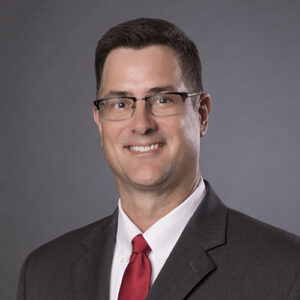
As the economy begins to emerge from beneath COVID-related restrictions, many uncertainties remain in the small business sector. But one step you can take to right-size your risk and improve your opportunities for future growth is to make sure you have good financial management and tighten your financials, according to John Ruther, managing director for consulting firm O’Keefe. He was interviewed by Sheri Welsh for The Welsh Wire podcast, sponsored by the Family Business Alliance.
“Making sure that somebody can see three to five years of really good solid financials, that you can't poke holes in, it turns out to be really valuable,” he says.
Ultimately, the goal of good financial management is to create value for the future, Ruther says.
“And obviously, if something's not valuable anymore, then there's not a need for it. So as long as you're keeping it valuable, then that makes all the sense in the world.”
Ruther also says it’s also important to expand company knowledge and expertise beyond the firm’s founder.
“In a lot of cases, you'll see that the people who work for or work within that company look to that person to make all those decisions. So when it comes time to look to either pass it on or exit or take a look at even expanding the customer base, [if] it's that person that is the reason that the business is so successful [then] it's really important for you to start to pass that information on to somebody else.”
He also says you can help future-proof your business by spending time now in strengthening relationships and building trust with suppliers, bankers, etc.
Hear more of Ruther’s discussion about creating value for the future on this week’s The Welsh Wire podcast. Listen to the full interview with John Ruther.
Subscribe to The Welsh Wire podcast on iTunes for additional informative, entertaining interviews with West Michigan business leaders. - The Welsh Wire: Fred Schubkegel, Varnum
The Welsh Wire: Fred Schubkegel, Varnum
Lack of access to legal expertise is no barrier to small business growth, thanks to MiSpringboard, the Varnum law firm’s statewide initiative that provides free legal services to Michigan startups. “We didn’t want there to be any hesitancy or any barrier to a company staying in Michigan, starting in Michigan, growing in Michigan because they felt like they couldn’t figure out the legal aspects of it -- how to lease the space, how to form the company, how to do the expansion they needed to do here in order to grow jobs here,” said Fred Schubkegel, Managing Partner for Varnum’s Southwest Michigan Office, who spoke with Sheri Welsh on this week’s Welsh Wire podcast. Varnum launched MiSpringboard in 2011 by giving away $1 million in free legal services. The $1 million commitment was renewed in 2016. The program is aimed at participants who are located in Michigan, have a written business plan and demonstrate a need for Varnum’s legal support. Over 400 startups in more than 100 cities have been assisted to date. Watch Sheri’s entire interview with Fred Schubkegel or listen to the audio.Subscribe to The Welsh Wire podcast on iTunes for additional informative, entertaining interviews with west Michigan business leaders.
- The Welsh Wire: Gary Kushner of Kushner & Company
The Welsh Wire: Gary Kushner of Kushner & Company
Recent federal regulations give business owners new options for providing health insurance benefits to their workers. “Only about 35 to 40 percent of employers in the U.S. offer health coverage, so here is now a whole new approach that those employers could consider [when] they may not be able to afford to fully sponsor a group health plan,” says nationally-known employee benefits expert Gary Kushner, President and CEO of Kushner & Company in Portage. The new Individual Coverage Health Reimbursement Arrangement (ICHRA) lets employers decide to put money aside for all or a class of employees to buy individual health coverage at the Exchange. The new Excepted Benefit HRA (EBHRA) lets employers contribute up to $1,800 annually to an employee who is eligible to enroll in his or her employer’s group health plan, regardless of whether or not they choose to do so. Health insurance coverage is an important part of an overall employee attraction and retention strategy. “The whole reason that employers, and in particular smaller to mid sized employers, offer the types of total rewards -- comp benefit, work-life balance — that they do is they're competing for talent every day with much larger firms with much deeper pockets,” Kushner says. “And so in order to find the right people doing the right things at the right time, a small to mid sized business owner really needs to pay attention to how they structure and compete for that talent.”
Subscribe to The Welsh Wire podcast on iTunes for additional informative, entertaining interviews with west Michigan business leaders.
- The Welsh Wire: Gary Kushner of Kushner & Company
The Welsh Wire: Gary Kushner of Kushner & Company
Everyone in business uses technology, so it’s less of a competitive advantage. Instead, an important trend that organizations are recognizing today is that people are the key to success. That means strategic HR is becoming a requirement, not just an option, according to nationally-known employee benefits expert Gary Kushner, President and CEO of Kushner & Company in Portage. He shared his insights on the future of work and the impact on strategic HR when he was interviewed by Sheri Welsh for The Welsh Wire podcast. “The C suite, the CEOs, CFOs of the world, began realizing in the early 2000s and it continues today that people are my competitive advantage. How do I attract, retain and engage the best possible candidates, the key talent I'm going to need throughout my organization? How do I do talent acquisition, talent management and talent engagement? The most successful firms today by a number of research studies, and by looking at the most successful large, publicly traded firms, are those that have figured out how to leverage their people as their competitive advantage.” Kushner says key trends to be aware of in 2020 are demographic changes around the globe that are driving a more diverse workplace, the socially connected workplace that is getting work done outside the four walls of the organization, the rise of microworkers (the gig economy) that is impacting short and long-term workforce planning, and the way the machine learning will improve how certain work is done but still not replace humans anytime in the near future. Listen to Sheri's full interview with Gary Kushner.
Subscribe to The Welsh Wire podcast on iTunes for additional informative, entertaining interviews with west Michigan business leaders.
- The Welsh Wire: Gretchen Dettloff, Kalsec and Laura Keiser, Leslie Poucher Pratt, and Martha Todd, Farmhouse Early Learning Center
The Welsh Wire: Gretchen Dettloff, Kalsec and Laura Keiser, Leslie Poucher Pratt, and Martha Todd, Farmhouse Early Learning Center
As part of their efforts to attract and retain great workers, Kalamazoo-headquartered Kalsec opened an on-site early learning center in 2017. The Farmhouse Early Learning Center provides quality child care and pre-school programming for employees raising families. The facility is open to children ages six weeks to five years, where they enjoy individualized care, enriching learning experiences and rewarding social interactions. It’s one of the perks that helps make Kalsec an employer of choice in west Michigan. “[Childcare] flexibility is so important in helping employees balance work with family responsibilities,” says Gretchen Dettloff, Senior HR Manager for Kalsec. “And I also think the decision to place your child in someone else's care can really cause some anxiety. So I think our program provides reduced stress on the employee. When your child has safe, loving and stimulating child care that you can count on, you don't have to worry while you're at work. At the end of the day I think everybody benefits -- the employees benefit, the kids benefit and our community benefits.” The Farmhouse was built based on Kalsec company values, says Farmhouse Director Laura Keiser. “When we [with Farmhouse Director Leslie Poucher Pratt] were starting the Farmhouse [we realized] that we had to be the best,” she says. “Because if we weren't, and people were coming to visit us at the Farmhouse, and they're going, I think I'm going to enroll my kids down the road -- that can't happen so we needed to be the best. So we are.” Learn more about Kalsec’s Farmhouse Early Learning Center when Gretchen Dettloff, Laura Keiser, Leslie Poucher Pratt and Martha Todd, Vice Chair and Farmhouse Founder and Manager, talk with Sheri Welsh on this week’s Welsh Wire podcast. Click here Listen to Sheri's entire interview with Gretchen Dettloff, Laura Keiser, Leslie Poucher Pratt, and Martha Todd.
Subscribe to The Welsh Wire podcast on iTunes for additional informative, entertaining interviews with west Michigan business leaders.
- The Welsh Wire: Heather Isch of LKF Marketing and Elizabeth Wright of 633 Group
The Welsh Wire: Heather Isch of LKF Marketing and Elizabeth Wright of 633 Group
 When the 633 Group decided to go through a redefinition of their core values and culture and a major rebranding, they found a trusted partner in Kalamazoo’s LKF Marketing. Their collaboration resulted in a 2018 Silver Davey Award for Integrated Campaign -- Business to Business.
“The results were extremely effective,” says Elizabeth Wright, Integrator for 633 Group. “[LKF] were great to work with, spoke a similar language, and that was really fun.”
A high level of trust is crucial for successfully navigating a rebranding process, says Heather Isch, President and CEO of LKF Marketing. “[With 633] there's an openness so that we were able to go in and really do a discovery process and help them sort through some of the things to create that new brand. So kind of starting the conversation before the brand really came together, right? Really digging into who are we going to be, what's our vision, what are our core values?”
Wright says the rebranding has helped 633 Group’s employees have a sense of ownership and greater understanding of what the company is all about. “It’s not just having some great sounding-and-looking visual aids, it's about this is who we really are, and that all resonates, is very connected. And so our goal is for 633 Group to continue being a compelling work environment where people are clear on our values and mission and they choose to bring their talent to that. I know that our brand, our logo, our video, everything that we do reflects what we're about and how we're going to do things.”
Listen to Sheri’s entire interview with Heather Isch and Elizabeth Wright.
When the 633 Group decided to go through a redefinition of their core values and culture and a major rebranding, they found a trusted partner in Kalamazoo’s LKF Marketing. Their collaboration resulted in a 2018 Silver Davey Award for Integrated Campaign -- Business to Business.
“The results were extremely effective,” says Elizabeth Wright, Integrator for 633 Group. “[LKF] were great to work with, spoke a similar language, and that was really fun.”
A high level of trust is crucial for successfully navigating a rebranding process, says Heather Isch, President and CEO of LKF Marketing. “[With 633] there's an openness so that we were able to go in and really do a discovery process and help them sort through some of the things to create that new brand. So kind of starting the conversation before the brand really came together, right? Really digging into who are we going to be, what's our vision, what are our core values?”
Wright says the rebranding has helped 633 Group’s employees have a sense of ownership and greater understanding of what the company is all about. “It’s not just having some great sounding-and-looking visual aids, it's about this is who we really are, and that all resonates, is very connected. And so our goal is for 633 Group to continue being a compelling work environment where people are clear on our values and mission and they choose to bring their talent to that. I know that our brand, our logo, our video, everything that we do reflects what we're about and how we're going to do things.”
Listen to Sheri’s entire interview with Heather Isch and Elizabeth Wright.
Subscribe to The Welsh Wire podcast on iTunes for additional informative, entertaining interviews with west Michigan business leaders.
- The Welsh Wire: How Employment Contracts are Shaping Company Recruitment, featuring Attorneys Jordan Held and Mariah Natzke with Kreis Enderle in Kalamazoo
The Welsh Wire: How Employment Contracts are Shaping Company Recruitment, featuring Attorneys Jordan Held and Mariah Natzke with Kreis Enderle in Kalamazoo
Many companies are considering the use of employment contracts not just for executive senior level hires, but for-mid level talent managers and leaders as well. Sheri Welsh explores the use of employment contracts as an employee attraction and retention tool when she talks with Jordan Held and Mariah Natzke, Attorneys with Kreis Enderle in Kalamazoo.
“There's a lot of litigation that goes on with employment agreements and employment contracts, so talking with your attorney or getting another set of eyes on what your agreement says is always the best option,” says Held.
Two potential problem areas include wrongful discharge and the oral representations or misrepresentations that are made to employees. “The biggest cause of litigation, usually, is the employee was told they won't be fired for some reason, or they won't be fired at all,” says Natzke. “And those oral presumptions can create an expectation for the employee. So, I think the biggest thing is keeping really clear contracts.”
Employment contracts that include non-compete provisions that protect company confidentiality and trade secrets are still permitted in Michigan, if they are not overly broad in the eyes of the courts. But the Federal Trade Commission has proposed a new rule that would effectively ban the use of non-compete agreements nationwide. “The claim is that it's going to help workers have more flexibility and have a more fair method of competition in the market,” says Natzke.
The comment period for the proposed rule is open through March 20. “So, get any of your comments and let them know the effect that it will have on your business and where you think this proposed rule would take you and your employees,” Held says.
Leave a comment on the proposed rule.
Listen to The Welsh Wire podcast featuring Jordan Held and Mariah Natzke in its entirety. Subscribe to The Welsh Wire on iTunes for additional informative, entertaining interviews with west Michigan business leaders.
- The Welsh Wire: How Shareholder Agreements Can Help Prevent Family Business Squabbles, Featuring Paul McCarthy of Rhodes McKee
The Welsh Wire: How Shareholder Agreements Can Help Prevent Family Business Squabbles, Featuring Paul McCarthy of Rhodes McKee
When it comes to family business, emotional imperfections can certainly play a role in the rancor that can rise from shareholder squabbles. In this week's The Welsh Wire podcast, Sheri Welsh discusses how to mitigate those disagreements with Paul McCarthy, attorney with Rhoades McKee in Grand Rapids, Mich. “If you have a mature family-held business, maturing or educating that next generation with respect to here's how we do this—here's how our roles are going to be—that can certainly be helpful to create a business mindset, not a family mindset in the business itself,” according to McCarthy. He adds that outside consultants can help organize a formal structure that allows business success to be set apart from personal conflicts. “Corporate governance is commonly addressed in this situation through an operating agreement or a shareholder agreement," McCarthy said. "If there's turmoil, if there's a dispute, then what we would then have built in is an alternative dispute resolution provision that frankly is just requiring good human behavior and conscientious adult decision making.” McCarthy says it’s good to remember that you're running a business—you're not running a family at the business. “Your corporate governance documents need to put in place as your guardrails for good behavior to ensure you don't end up in court. Michigan has pretty robust shareholder rights as distinct from some other states. So you want to make sure that you're addressing those issues. And you can do that very effectively through a shareholder agreement where people agree to have certain rights, certain responsibilities.” Learn more about how shareholder agreements can help prevent family business squabbles. Listen to this week’s podcast with Paul McCarthy. Sponsored by Family Business Alliance. Subscribe to The Welsh Wire podcast on iTunes for additional informative, entertaining interviews with West Michigan business leaders. - The Welsh Wire: Hungerford Nichols CPAs + Advisors
The Welsh Wire: Hungerford Nichols CPAs + Advisors
Mentoring and talent identification are important elements of successful succession planning, according to two Hungerford Nichols CPAs + Advisors experts interviewed by Sheri Welsh for The Welsh Wire podcast, sponsored by the Family Business Alliance. “People start at different areas and levels in their career and grow to be where they're at now and what we've realized is that there's such an importance, both in our own organization, but also a lot of the closely held family owned businesses we're working with, that [employees] don't learn everything when they go to school,” says Senior Manager Tessa Keena, CPA. “The hope is that you're learning it on the job, but sometimes there's certain parts of the job that you need others to provide insight and advice from within. And that comes in the form of a mentor.” The mentoring process can be crucial to finding the next generation of leaders who will help the company continue to be successful, says Business Advisor Katy Felver, MSMSL. “We help that business owner really get comfortable and identify those talents in their firm,” Felver says. “Talents come in all different shapes and sizes and levels, and I think that because we're really in the pulse of working with our clients, we have the privilege of learning and meeting different people in the organization. So we can also help unveil to the business owner, hey, have you seen this person in your organization, that they have this interest or this talent?” Listen to Sheri’s full interview with Hungerford Nichols CPAs + Advisors experts. Subscribe to The Welsh Wire podcast on iTunes for additional informative, entertaining interviews with west Michigan business leaders. - The Welsh Wire: Immigration as a Tool for Workforce Development ft. Kelli Saunders & Andy Johnston
The Welsh Wire: Immigration as a Tool for Workforce Development ft. Kelli Saunders & Andy Johnston
Accessing and nurturing a talented workforce continues to be a major challenge for Michigan businesses of all sizes. How can immigration help address this problem? That’s the topic of discussion on this week’s The Welsh Wire podcast. Sheri Welsh talks with Kelli Saunders, Vice President of Policy and Engagement for the Small Business Association of Michigan, and Andy Johnston, Senior Vice President of Advocacy and Strategic Engagement at the Grand Rapids Chamber. “I know this is scary for some people, but we have been experiencing a population shrinkage and it's never going to be easier to find talent than it is today,” Saunders says. “With people retiring and not being replaced, it's going to be a challenge.” Experts say that Michigan can’t grow its way out of a shrinking working-age population, which leaves only a few ways to tackle the talent shortage. “You can try to attract more people to the state of Michigan, which is tough, because it's tough to move your whole life from a different state,” says Johnston. “Another option is to have more babies, but that just doesn't seem to be in the cards right now. We can automate, but that only gets you so far and it's really expensive.” This is where immigration can be a valuable pipeline of motivated people who are ready to contribute to economic growth. “Immigrants don't take jobs; they create jobs. They don't take tax dollars; they create tax dollars. They don't take from the social safety net; they generate it and help support it,” says Johnston. Listen to Sheri’s full interview with Kelli Saunders and Andy Johnston to learn more about Michigan’s collaborative efforts to support talent growth through immigration. Subscribe to The Welsh Wire on iTunes for additional informative, entertaining interviews with West Michigan business leaders. - The Welsh Wire: Impact Players - Business Leaders and Communities in Schools Team Up To Make a Difference
The Welsh Wire: Impact Players - Business Leaders and Communities in Schools Team Up To Make a Difference
Kalamazoo Public Schools (KPS) has been faced with several challenges to bounce back from the impact of COVID-19. Through their support of Communities in Schools (CIS) of Kalamazoo, local business leaders have helped navigate these obstacles and address the needs of KPS.
For this week’s The Welsh Wire podcast, Sheri Welsh gets insights from CIS of Kalamazoo Executive Director James Devers; Rex Bell, President at Miller-Davis Company; and Darren Timmeney, Senior Vice President at JPMorgan Chase & Co. and Market Executive for the Southwest Michigan area.
Devers says CIS has used grant money to increase staffing support and assist schools that have been challenged to re-engage with students and their needs.
“Sometimes we forget that when students go to school, they're not just getting an education. They're getting food, they're getting other resources that are available to them. And again, because CIS works in the school to provide resources [and support services], there's a whole host of other things that were not available, because they weren't in the building,” he says.
According to Bell, business involvement with the mission of CIS is a good return on investment.
“Very simple idea, just removing these obstacles to learning,” Bell says. “Connecting the students with the support that they need. It's almost a no-brainer, it's so obvious. And CIS is the only organization that's doing that, they have a proven model and it's really fantastic.”
Timmeney says employers, for the future workforce needs of the Kalamazoo region, have to participate more in the success of students.
“It takes the family, it takes the student, it takes the educators, it takes philanthropy, and it also takes the businesses,” he says. “I think that you will see businesses become a lot more involved because it's really a question of survival and growth for us.”
Listen to this week's podcast to learn more about how businesses can support Kalamazoo schools.
Subscribe to The Welsh Wire podcast on iTunes for additional informative, entertaining interviews with West Michigan business leaders. - The Welsh Wire: Jeff Disher of DISHER and Brad Hilleary of Webb Chemical
The Welsh Wire: Jeff Disher of DISHER and Brad Hilleary of Webb Chemical
When Webb Chemical Service Corporation, a full-service chemical distributor with locations in Muskegon Heights, Michigan and Fort Wayne, Indiana, began facing the challenges of rapid growth and a changing culture, they called in the expertise of business consulting company DISHER in Zeeland, Michigan. They tapped a firm that walks-the-walk. “We've been recognized for our culture through Fortune magazine,” says Jeff Disher, founder and president of DISHER. “It's something that we focus hard on at DISHER, our culture and our mission statement, which is make a positive difference. It’s something that everybody on our team knows. They know how they live it every day with our clients, with our teammates and with our community.” DISHER worked closely with Webb’s leaders to develop a culture vision that all their employees can buy into. “Every employee meeting, every departmental meeting, every picnic, every Christmas party, we bring up some piece of it, we talk about it,” says Brad Hilleary, owner/CEO of Webb. “And we came up with two acronyms: PMA for positive mental attitude, and GRACE for growth, responsibility, attitude, character and excellence. We tell every employee in the organization, this is how we operate. And you have the authority of the owner of the company to challenge anyone else in the company if they're not doing those two things.” Culture is a crucial part of talent attraction, Hilleary says. “Millennials, if you ask them, or allow them to ask a question in the interview, they will say, what's your culture? It's very, very, very important to them. And so we do culture on purpose now and we talk about it and we invite others to add it. Our culture is ever evolving because we want the creativity and the new ideas from the new folks to be part of the core of who we are.” Listen to Sheri’s entire interview with Jeff Disher and Brad HillearySubscribe to The Welsh Wire podcast on iTunes for additional informative, entertaining interviews with west Michigan business leaders.
- The Welsh Wire: Jennifer Swan and Carrie Hoch-Mortlock of TowerPinkster and James Devers of CIS Kalamazoo
The Welsh Wire: Jennifer Swan and Carrie Hoch-Mortlock of TowerPinkster and James Devers of CIS Kalamazoo
Thanks to the support of her TowerPinkster co-workers, Jennifer Swan implemented an award-winning workplace program that raises money for needy Kalamazoo schoolchildren. Swan, who is Senior Architectural Project Coordinator for TowerPinkster, was recognized this year with a CHAMP Award by the Communities in Schools (CIS) of Kalamazoo. Her workplace program is called the Swan Snack Emporium. She buys snacks on sale -- granola bars, microwave popcorn, Pop Tarts -- and makes them available to her co-workers, who in turn make a donation that goes to the CIS Kid’s Closet. The Kid’s Closet provides needy children with items like socks, underwear, toothbrushes, toothpaste, deodorant and soap. Do her co-workers like to buy healthy snacks at the Emporium? “No, they don't buy any of that stuff,” laughs Swan. “When you put it out there they want Pop Tarts and chips and candy bars.” Giving back is an important core value for TowerPinkster. “We actively support the communities in which we live, work and play,” says Carrie Hoch-Mortlock, Manager of Human Resources for TowerPinkster. “And so as a company, we feel it really is our responsibility to our staff to expose them to what community opportunities exist out there, kind of what that looks like and feels like. And so anything from industry events, to just supporting the local nonprofit organizations, we really just try to get our folks out there and really experience what it's all about.” The generosity of Jennifer Swan and her fellow TowerPinkster employees is much appreciated by CIS. “It inspires our staff when we see people in the community, organizations in the community that take the extra mile,” says James Devers, Executive Director of CIS of Kalamazoo. Listen to Sheri’s entire interview with Jennifer Swan, Carrie Hoch-Mortlock, James Devers.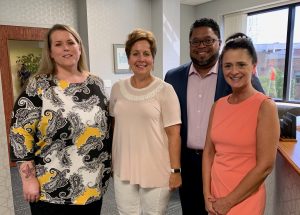
Subscribe to The Welsh Wire podcast on iTunes for additional informative, entertaining interviews with west Michigan business leaders.
- The Welsh Wire: Jesse Young, Kreis Enderle
The Welsh Wire: Jesse Young, Kreis Enderle
Non compete agreements can be an important component of your plan for long term business success. Jesse Young, an attorney for the west Michigan-based Kreis Enderle law firm, tells Sheri Welsh in this week’s Welsh Wire Podcast interview that there are several specific reasons a company should consider requiring a non compete agreement for their employees. “Basically, to protect their customer (relationships), enhance the value of the company should they ever want to sell the company (a potential buyer may want to know that all the employees have signed non competes) and to shape the ground rules for any potential litigation,” he says. Young also advises business owners to consider having an attorney tailor a non compete agreement that really fits their business model. “It’s good to have an attorney that you can discuss your business with, to talk with them about the ins-and-outs,” he says. “The attorney can figure out from there what’s reasonable as far as the scope, the duration and the geography and all that.” Listen to Sheri’s entire interview with Jesse Young.Subscribe to The Welsh Wire podcast on iTunes for additional informative, entertaining interviews with west Michigan business leaders.
- The Welsh Wire: Jim Coyle, Nexus Business Solutions
The Welsh Wire: Jim Coyle, Nexus Business Solutions
Managing and maintaining growth is crucial to long term business success. A key factor is surrounding yourself with a great team that will allow your company to grow. “Sometimes (owners) don’t have the right people,” says Entrepreneurial Operating System (EOS) expert Jim Coyle of Nexus Business Solutions in an interview with Sheri Welsh for the Welsh Wire Podcast. “Right now everyone is struggling to get great people. EOS helps you figure out what that is in regards to what you’re looking for -- this is a person who is going to fit into our culture, they care about what we care about. And then we know exactly what seat they’re going to be sitting in.” Coyle says that in today’s tight labor market, smart business owners understand the value in securing a hiring specialist who can connect their business needs with the workers who can address those needs. Listen to Sheri’s entire interview with Jim Coyle.Subscribe to The Welsh Wire podcast on iTunes for additional informative, entertaining interviews with west Michigan business leaders.
- The Welsh Wire: Jim Medsker, Keystone Solutions Group
The Welsh Wire: Jim Medsker, Keystone Solutions Group
A 20-year veteran in the fast moving and dynamic manufacturing industry has a sage suggestion for how to be a successful entrepreneur. “Keep your gauges at nominal,” says Jim Medsker, president of Keystone Solutions Group, a Kalamazoo-based product development and contract manufacturing firm focusing on medical devices, automotive and aerospace. Jim was recently interviewed by Sheri Welsh for the Welsh Wire Podcast. “In life you have a lot of gauges -- happiness, sadness, excitement, frustration, anxiety -- you’re going to experience all of those to the max,” Jim says. “The key is, and where your strength comes from, is keeping your gauges at nominal not only through the tough times but also the good times. Stay even-keeled and that will help you weather the storms.” Another bit of key advice from Jim: expect that everything you plan will take longer and cost more! Listen to Sheri’s entire interview with Jim Medsker.Subscribe to The Welsh Wire podcast on iTunes for additional informative, entertaining interviews with west Michigan business leaders.
- The Welsh Wire: John Barry of Schupan Aluminum & Plastic Sales
The Welsh Wire: John Barry of Schupan Aluminum & Plastic Sales
Most businesses in Michigan offer some level of health insurance coverage if they want to recruit and retain quality employees. But few go so far as Schupan & Sons in Kalamazoo, which provides its workers with an onsite health center. Schupan partnered with Fabri-Kal Corporation to open the The Schupan & Fabri-Kal Employee Health Center in the summer of 2018, in partnership with Marathon Health. Services include health assessments, acute care and health coaching. The company wanted its employees to have access to better, more convenient health care, according to John Barry, president of Schupan Aluminum & Plastic Sales, a division of Schupan & Sons. He recently talked with Sheri Welsh for The Welsh Wire podcast. “The goal really was to have happier employees, have better access to care,” he says. “The disease prevention portion of it was really was really big for us, just because we knew that with the length of the [healthcare] appointments and all the different things that they'd be able to talk about,, hopefully you can catch something that maybe it wouldn't have before.” Companies all across Michigan struggle to hire and keep good workers, and a side benefit of the onsite health center is better retention, Barry says. “Retention plays a lot a lot into this. You know there's no one silver bullet to retain an employee. People want to go to a place that they actually enjoy going to work. We've really worked hard over the years to have a fun environment.” he says. The Schupan philosophy, when they hire an employee, is for them to have a career at the company. “We want people to own their jobs. One of [Schupan CEO] Marc Schupan’s favorite comments is that no one washes a rental car. We don't want our employees to have rental jobs, we want them to own them. And I think we've done a really good job of that.” Listen to Sheri’s entire interview with John Barry.Subscribe to The Welsh Wire podcast on iTunes for additional informative, entertaining interviews with west Michigan business leaders.
- The Welsh Wire: Ken Bogard and Grace Gavin, Know Honesty
The Welsh Wire: Know Honesty Book Release, ft. Ken Bogard and Grace Gavin from Know Honesty
 The Grand Rapids-based Know Honesty Movement, founded in 2016, is helping organizations, professionals, and individuals break down their divisions and experience real communication. On this week’s Welsh Wire, Sheri Welsh talks with Know Honesty Founder Ken Bogard and Co-Founder and Chief of Staff Grace Gavin to discuss the launch of their book and their journey in promoting open and honest communication in workplaces.
Bogard's epiphany in an EOS session led to his collaboration with Gavin. “You have this incredible framework that is EOS, but it's meaningless without open and honest individuals around the table,” he says. “That really birthed this idea that we have to help people become more open and honest. And we're not trained in this, we're not taught this real well, companies aren't encouraging it enough. And then when I watch my clients who embrace it like crazy, ooh, they're unstoppable. I met Grace, and I said, hallelujah, there's another person in this world who agrees and wants this thing in their life too. And it really came from there.”
Their book, “Know Honesty: Eliminate The Divide, Become a Masterful Communicator, and Connect With Anyone” will be launched on October 18. The book focuses on leadership teams and personal and professional relationships, highlights challenges like cultural norms and individualism, and stresses the need for education and open-mindedness. “It’s for growth-oriented individuals,” says Gavin. “Maybe you're doing some things here and there, but it's not entirely clicking, like your team is not connected. And that's in the tagline of the book – eliminate the divides, become a masterful communicator and connect with anyone really important for those teams.”
Bogard and Gavin developed the Pursuit of Honesty Assessment, which measures openness and honesty. It can be found on their website: https://www.assessment.knowhonesty.com/signup.
Learn more about Know Honesty when Bogard and Gavin talk with Sheri Welsh on this week’s Welsh Wire podcast.
The Grand Rapids-based Know Honesty Movement, founded in 2016, is helping organizations, professionals, and individuals break down their divisions and experience real communication. On this week’s Welsh Wire, Sheri Welsh talks with Know Honesty Founder Ken Bogard and Co-Founder and Chief of Staff Grace Gavin to discuss the launch of their book and their journey in promoting open and honest communication in workplaces.
Bogard's epiphany in an EOS session led to his collaboration with Gavin. “You have this incredible framework that is EOS, but it's meaningless without open and honest individuals around the table,” he says. “That really birthed this idea that we have to help people become more open and honest. And we're not trained in this, we're not taught this real well, companies aren't encouraging it enough. And then when I watch my clients who embrace it like crazy, ooh, they're unstoppable. I met Grace, and I said, hallelujah, there's another person in this world who agrees and wants this thing in their life too. And it really came from there.”
Their book, “Know Honesty: Eliminate The Divide, Become a Masterful Communicator, and Connect With Anyone” will be launched on October 18. The book focuses on leadership teams and personal and professional relationships, highlights challenges like cultural norms and individualism, and stresses the need for education and open-mindedness. “It’s for growth-oriented individuals,” says Gavin. “Maybe you're doing some things here and there, but it's not entirely clicking, like your team is not connected. And that's in the tagline of the book – eliminate the divides, become a masterful communicator and connect with anyone really important for those teams.”
Bogard and Gavin developed the Pursuit of Honesty Assessment, which measures openness and honesty. It can be found on their website: https://www.assessment.knowhonesty.com/signup.
Learn more about Know Honesty when Bogard and Gavin talk with Sheri Welsh on this week’s Welsh Wire podcast. - The Welsh Wire: Kevin Murphy of Miniature Custom Manufacturing
The Welsh Wire: Kevin Murphy of Miniature Custom Manufacturing
Miniature Custom Manufacturing of Vicksburg has grown from a single employee in 2007 to over 75 employees today. The plastic injection molding firm specializes in automotive, food packaging and medical, and was recently recognized as a member of the 2019 Michigan 50 Companies to Watch. What’s the key to such rapid growth and success? “Having a strong culture is number one,” says Kevin Murphy, president and co-owner. “People say sales are the lifeblood of an organization. I agree with that. But right behind it is your culture, because without a strong culture, you're going to turn people over.” In these tight labor markets, turnover can be deadly to business success. So, Murphy puts his people first. “We manage our business on three things: people first, quality second, production third. I believe in the golden rule. You do unto others what you want others to do to you. I never asked someone to do something that I wouldn't do myself.” Just barking orders at someone isn't how you're going to build a strong culture, Murphy says. “Teaching someone, developing someone into a leader is how you're going to develop a strong culture. We really work on coaching, teaching and development, teaching in the moment. So there's a situation that happens, even in a production meeting, I will stop our production meeting to teach and work with that individual right there in the moment. And from a leadership [standpoint], I'd say that is my style -- teaching and development in the moment. And I've tried to emulate that with our staff. And we work very hard on don't tell someone to do something, teach them.” Listen to Sheri’s entire interview with Kevin Murphy. Subscribe to The Welsh Wire podcast on iTunes for additional informative, entertaining interviews with west Michigan business leaders.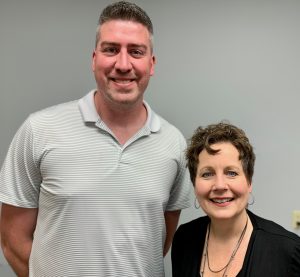
- The Welsh Wire: Kristyn Buhl-Lepisto, Kalamazoo County Ready 4s
The Welsh Wire: Kristyn Buhl-Lepisto, Kalamazoo County Ready 4s
Anyone who thinks that pre-kindergarten is on par with babysitting just doesn't understand the science or the economics behind early childhood education, according to the leader of an innovative and collaborative organization that provides accessible, high quality pre-kindergarten for four-year-olds. “Eighty-five percent of an individual's social, emotional, and intellectual development happens by the time they’re five years old,” says Kristyn Buhl-Lepisto, Executive Director of Kalamazoo County Ready 4s (KC Ready 4s). She talked about the program with Sheri Welsh on The Welsh Wire podcast. The goal of KC Ready 4s is to advance fully accessible, high-quality pre-kindergarten education for every three- and four-year-old in Kalamazoo County through collaborative leadership with public and private providers. Since 2010, KC Ready 4s has been contracting with qualified licensed private preschools, child care centers, and group child care homes that achieve and maintain 4-5 stars as measured by Michigan’s Great Start to Quality. Those programs that achieve and maintain 4-5 star ratings are eligible for tuition support to qualified families (over 55 providers in 2020.) Buhl-Lepisto says many studies have documented the benefits of quality pre-kindergarten, from higher graduation rates to lower rates of teen pregnancy and lower rates of incarceration. “Also, access to high quality pre-kindergarten allows parents to be in the workforce. So it's going to help with things like employee engagement and retention. The return on investment for early education is higher than any other public initiative.” To recognize KC Ready 4s' 10th year of operation, and raise $100,000, the organization is releasing 10 Videos to Celebrate 10 Years. In addition, anyone interested is invited to join a live stream on Oct. 1 for a Celebratory Cheers to conclude the campaign. Donors will receive information to pick up a Celebratory Cheers package, sponsored by Millennium Restaurant Group (MRG), with a range of goodies including a split of champagne, chocolate covered strawberries, and an MRG gift card. Learn more about KC Ready 4s' on this week’s The Welsh Wire podcast. Listen to Sheri’s full interview with Kristyn Buhl-Lepisto. Subscribe to The Welsh Wire podcast on iTunes for additional informative, entertaining interviews with west Michigan business leaders.
- The Welsh Wire: Kyle Kunnen of Mercantile Bank of Michigan
The Welsh Wire: Kyle Kunnen of Mercantile Bank of Michigan
Fraudulent communications are one of the biggest challenges facing customers of any financial institution, according to Kyle Kunnen, Senior Vice President and Information Security Officer at Mercantile Bank of Michigan in Grand Rapids. Kunnen recently discussed these financial security challenges with Sheri Welsh on The Welsh Wire podcast, sponsored by the Family Business Alliance. Kunnen explained that fraudulent communications can come to businesses in many forms–from printed material in your mailbox, to text messages, to shady emails. If you think you’ve become a victim of a financial scam, “Call your institution right away. And they can start trying to get that transaction stopped and reversed and hopefully get your money back,” Kunnen said. He advises business owners to be suspicious of any email that comes into their organization that requests payment. He also suggests implementing dual controls–have one person able to initiate payment but require a second, independent person to approve the final transaction. Financial communications security is as much a mindset as anything else, Kunnen said. “You think of your corporate culture, but there's actually a security culture too. And so what you're doing is you're building your security culture in that mindset that everybody in the organization needs to be in tune with. And as you get new people on staff, you have to bring them up to speed.” Listen to Sheri’s full interview with Kyle Kunnen.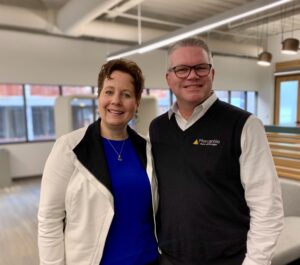
Subscribe to The Welsh Wire podcast on iTunes for additional informative, entertaining interviews with west Michigan business leaders.
- The Welsh Wire: Kyle Kunnen, Information Security Officer at Mercantile Bank of Michigan
The Welsh Wire: Kyle Kunnen, Information Security Officer at Mercantile Bank of Michigan
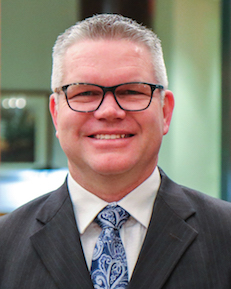 Ransomware is a major cybersecurity problem that unfortunately has no simple silver-bullet solution, according to one of west Michigan’s top cybersecurity experts.
Sheri Welsh talked with Kyle Kunnen, Information Security Officer at Mercantile Bank of Michigan, for this week’s The Welsh Wire podcast sponsored by the Family Business Alliance.
“Ransomware is a form of malware that encrypts a victim's files, and locks them up so that you don't have access to them anymore,” says Kunnen. “And then the attacker demands a ransom to basically restore access to your data so that you can continue business as usual.”
A good file backup system is the most important line of defense.
“If you have the ability to restore that information, you're lightyears ahead [by] being able to say I don't have a need to pay the ransom. I think more often than not, when organizations are faced with paying or not paying, really the question they're asking themselves is how do I get my business back into operation? And if you don't have good backups to be able to get you back up and going, you might be backed into a corner.”
Kunnen says guarding your business against ransomware requires a multi layer approach.
“How many of those layers you implement and how diligent you are in maintaining those layers is really what's going to be key in protecting yourself not only from a ransomware situation, but from a host of other situations that can come from the bad actors. They're definitely poking at you.”
Learn more about how to protect your business from cybersecurity threats when Kyle Kunnen talks with Sheri Welsh on this week’s podcast.
Ransomware is a major cybersecurity problem that unfortunately has no simple silver-bullet solution, according to one of west Michigan’s top cybersecurity experts.
Sheri Welsh talked with Kyle Kunnen, Information Security Officer at Mercantile Bank of Michigan, for this week’s The Welsh Wire podcast sponsored by the Family Business Alliance.
“Ransomware is a form of malware that encrypts a victim's files, and locks them up so that you don't have access to them anymore,” says Kunnen. “And then the attacker demands a ransom to basically restore access to your data so that you can continue business as usual.”
A good file backup system is the most important line of defense.
“If you have the ability to restore that information, you're lightyears ahead [by] being able to say I don't have a need to pay the ransom. I think more often than not, when organizations are faced with paying or not paying, really the question they're asking themselves is how do I get my business back into operation? And if you don't have good backups to be able to get you back up and going, you might be backed into a corner.”
Kunnen says guarding your business against ransomware requires a multi layer approach.
“How many of those layers you implement and how diligent you are in maintaining those layers is really what's going to be key in protecting yourself not only from a ransomware situation, but from a host of other situations that can come from the bad actors. They're definitely poking at you.”
Learn more about how to protect your business from cybersecurity threats when Kyle Kunnen talks with Sheri Welsh on this week’s podcast.
Subscribe to The Welsh Wire podcast on iTunes for additional informative, entertaining interviews with west Michigan business leaders.
- The Welsh Wire: Larry Faragalli, CEO of Brightly
The Welsh Wire: Larry Faragalli, CEO of Brightly
 Digital transformation is the adoption of technology to replace manual or analog processes, or to replace legacy technology with newer and more modern tools, in order to transform your services or your business.
Digital transformation is the adoption of technology to replace manual or analog processes, or to replace legacy technology with newer and more modern tools, in order to transform your services or your business.Larry Faragalli, CEO of Grand Rapids-based Brightly, explains how digital transformation can improve your small business when he talks with Sheri Welsh on this week’s The Welsh Wire podcast. Faragalli explains it’s not something that just happens in your information technology (IT) department.
“It's adopting and promoting a culture of continuous improvement inside of your organization where you're creating positive and meaningful experiences for customers, and the partners that you work with, and quite frankly, your employees, too,” says Faragalli.
Faragalli discusses three core components of digital transformation. One is changing your business model, like moving from renting videotapes to streaming video content online. The second is operational digital transformation to improve efficiency. The third focuses on customers to create compelling online experiences.
“It's such a personal endeavor, because it's kind of like lifting up the hood of your business and finding all the places where there's a little bit of rust,” Faragalli says.
“I think one of the most meaningful things you can do is just talk to other business owners, read a lot about what other people are doing, whether it's in your in your space or not, and understand what is working for other organizations so that you don't have to make a bunch of expensive mistakes going into it.”
Listen to Sheri’s full interview with Larry Faragalli. Subscribe to The Welsh Wire podcast on iTunes for additional informative, entertaining interviews with west Michigan business leaders. - The Welsh Wire: Lessons from a Trailblazing Female CEO in Concrete ft. Adrienne Heidema
The Welsh Wire: Lessons from a Trailblazing Female CEO in Concrete ft. Adrienne Heidema
 As part of the Family Business Alliance's “Women in the Family Business” series, Sheri Welsh sits down with Adrienne Heidema, President & CEO of Consumers Concrete, on this week’s episode of The Welsh Wire. Heidema, the fourth generation of her family to lead the company, is the first female CEO in the business’ 90-year history—a remarkable milestone for a woman in the construction industry.
While Heidema’s position as a female leader might seem groundbreaking, her family’s legacy includes strong women who played key roles in the company, such as her grandmother who served on the board and her aunt who worked as the credit manager. Heidema credits this history of involvement, and Consumers Concrete’s commitment to creating an inclusive workplace, for fostering an environment where women can thrive.
Heidema’s own journey into leadership was unexpected. With a background in banking, she didn’t originally plan to join the family business. However, she emphasizes the value of being open to career changes and embracing opportunities when they arise.
"You might not ever plan on going back to the family business, but don't be afraid to reach back to family members who have left. They may be ready to come back and bring valuable talents with them," she said.
Today, 11 members of her family, spanning five generations, work in various capacities within the company.
Under Heidema’s leadership, Consumers Concrete has also prioritized buying local and supporting the West Michigan economy.
She proudly notes, “We are providing infrastructure materials for our community—roads, schools, and buildings—all produced here locally.”
For more on Adrienne Heidema’s inspiring story and the lessons she’s learned as a female CEO, listen to her conversation with Sheri Welsh on this week’s The Welsh Wire podcast, sponsored by the Family Business Alliance.
Listen to the full conversation, and don’t forget to subscribe to The Welsh Wire on iTunes for more engaging interviews with West Michigan business leaders.
As part of the Family Business Alliance's “Women in the Family Business” series, Sheri Welsh sits down with Adrienne Heidema, President & CEO of Consumers Concrete, on this week’s episode of The Welsh Wire. Heidema, the fourth generation of her family to lead the company, is the first female CEO in the business’ 90-year history—a remarkable milestone for a woman in the construction industry.
While Heidema’s position as a female leader might seem groundbreaking, her family’s legacy includes strong women who played key roles in the company, such as her grandmother who served on the board and her aunt who worked as the credit manager. Heidema credits this history of involvement, and Consumers Concrete’s commitment to creating an inclusive workplace, for fostering an environment where women can thrive.
Heidema’s own journey into leadership was unexpected. With a background in banking, she didn’t originally plan to join the family business. However, she emphasizes the value of being open to career changes and embracing opportunities when they arise.
"You might not ever plan on going back to the family business, but don't be afraid to reach back to family members who have left. They may be ready to come back and bring valuable talents with them," she said.
Today, 11 members of her family, spanning five generations, work in various capacities within the company.
Under Heidema’s leadership, Consumers Concrete has also prioritized buying local and supporting the West Michigan economy.
She proudly notes, “We are providing infrastructure materials for our community—roads, schools, and buildings—all produced here locally.”
For more on Adrienne Heidema’s inspiring story and the lessons she’s learned as a female CEO, listen to her conversation with Sheri Welsh on this week’s The Welsh Wire podcast, sponsored by the Family Business Alliance.
Listen to the full conversation, and don’t forget to subscribe to The Welsh Wire on iTunes for more engaging interviews with West Michigan business leaders.
- The Welsh Wire: Marc Foerster, Crystal Flash
The Welsh Wire: Marc Foerster, Crystal Flash
If you sense that your sales have stagnated, that you’re not as operationally efficient as you used to be, or that you’re not providing the level of customer service that you’d like, then consider implementing a market segmentation project at your company -- basically, sorting your customers by differentiators like gross margin, sales volume or location. “Anytime’s a good time to look at market segmentation if we can add clarity to our business and understand it,” says Marc Foerster, Vice President for Sales and Marketing for Crystal Flash. Foerster was recently interviewed by Sheri Welsh for the Welsh Wire Podcast. “The difficulty (with market segmentation) is that it does take some work, it does distract us from other things that may be the day-to-day priorities,” Foerster says. “It takes a commitment from people and to understand that it is not a short-term payoff.” Listen to Sheri’s entire interview with Marc Foerster.Subscribe to The Welsh Wire podcast on iTunes for additional informative, entertaining interviews with west Michigan business leaders.
- The Welsh Wire: Mark Pruss, TecNiq Inc.
The Welsh Wire: Mark Pruss, TecNiq Inc.
Many firms struggle to handle rapid expansion. The co-founder of a fast-growing Galesburg firm says he and his business partner benefited from learning that they didn’t have to do everything themselves and instead that they could rely on key people to make day-to-day decisions. Mark Pruss, co-founder of TecNiq, Inc. (a leader in global LED lighting solutions), talked recently with Sheri Welsh on The Welsh Wire podcast. Mark and his business partner Jeff Condon started the firm in 2004 by producing their first parts on Jeff’s dining room table. They’ve grown 35 percent a year over the past five years and in 2017 they moved to a 123,000 square foot plant to accommodate their rapidly expanding business operations. Today they have over 100 employees. One of their key challenges, faced by many other entrepreneurs, is learning to let go. “Jeff and I can't do everything so probably one of the harder challenges that we’ve had to work on is that you're used to doing it all yourself, it's your baby and you’re used to do in a certain way,” Mark says. “As business owners you can't be an expert on every facet of the company. So, make certain decisions for certain situations and try to pass it along. Let somebody else make that decision in that situation.” He says their new, state-of-the-art building, along with their low-stress culture, has helped them expand their talent base and attract quality workers. Learn more about how TecNiq is managing its growth by listening to Sheri Welsh’s entire Welsh Wire interview with Mark Pruss by clicking here. Listen to Sheri’s entire interview with Mark Pruss.Subscribe to The Welsh Wire podcast on iTunes for additional informative, entertaining interviews with west Michigan business leaders.
- The Welsh Wire: Mark Smith of Rhoades McKee
The Welsh Wire: Mark Smith of Rhoades McKee
The U.S. Department of Labor has issued final rules increasing the minimum annual salary level paid to over-time exempt administrative, executive and professional employees from $23,660 to $35,568, effective Jan. 1 2020. Mark Smith, an attorney with Rhoades McKee in Grand Rapids, talked about how these changes could impact businesses when he spoke recently with Sheri Welsh for The Welsh Wire podcast, sponsored by the Family Business Alliance. “You need to do the math, have good communications and have a plan,” he said. “And a good sort of safety net is to talk to your legal counsel and make sure you're doing it right from a legal point of view. If you have experienced legal counsel, they'll also be able to help you on the morale side of things in terms of here's best practices, here's how this sort of thing can best roll out.” Options for employers include simply increasing salaries up to the new levels, change salaried workers to hourly and pay them overtime for hours worked over 40, or leave the formerly exempt employees on a salary that is non-exempt from overtime. “There's no one size fits all,” Smith says. “I think an organization confronting this needs to look at how many people are affected. And let's just do the math and see how it rolls out. If I take that first option and just roll everyone up, consider the ripple effect upstream. What's it going to do to the morale of my organization? And how good am I in terms of my long term classification of these people as falling within those exempt categories, the duties tests. You really need to analyze all of those factors before you can make a decision.” Rhoades McKee has posted two articles on their website that discuss the ramifications of the new salary requirements: Rule Increasing Minimum Salary Level Returns and The New Salary Requirements: Understand the Options and Liability. Learn more about the new rules when Mark Smith talks with Sheri Welsh on this week’s Welsh Wire podcast, sponsored by the Family Business Alliance. Listen to Sheri's entire interview with Mark Smith.
Subscribe to The Welsh Wire podcast on iTunes for additional informative, entertaining interviews with west Michigan business leaders.
- The Welsh Wire: Mary Jane Mapes of The Aligned Leader Institute
The Welsh Wire: Mary Jane Mapes of The Aligned Leader Institute
What is the “executive presence” that helps you better engage with people and be a leader? “I always define it as a combination of what I would call poise, confidence, and authenticity," said Mary Jane Mapes, a leadership/communication strategist, executive coach, and founder of The Aligned Leader Institute in Portage, Mich. Joining Sheri Welsh on The Welsh Wire podcast, Mapes explained executive presence is all about how you act. “The aspect of how you act is that emotional control – your ability to manage your mind, master your emotions, so that you can ultimately control your behavior,” Mapes said. Mapes went on to discuss how anyone can learn how to develop grace under pressure, a crucial element of executive presence. “All of my coaching clients I have them do this, and those that will actually follow through and do it begin to see patterns,” Mapes said. “And once you begin to see a pattern you heighten your awareness. We know awareness is the beginning of change. “This is the process: I say, get a binder, a three-ring binder. And every day when you begin to feel agitated, or you begin to feel frustrated or irritated or some negative emotion rises up that could lead to some negative behavior, then write it down. “These are the four things to write down. Number one, what was happening? In other words, what happened when that came up? Number two, what were you thinking? Number three, how are you feeling? And number four, this is the big one, what were you really telling yourself?” Learn more about developing your executive presence when Mary Jane Mapes talks with Sheri Welsh on this week’s The Welsh Wire podcast. Listen to Sheri’s full interview with Mary Jane Mapes. Subscribe to The Welsh Wire podcast on iTunes for additional informative, entertaining interviews with West Michigan business leaders.
- The Welsh Wire: Mary Jane Mapes, Building a Culture of Trust
The Welsh Wire: Mary Jane Mapes, Building a Culture of Trust

Trust is the foundation to developing really solid relationships with your employees.
“And to me, trust involves a willingness to risk,” says leadership and communications strategist and executive coach Mary Jane Mapes, founder of the Aligned Leader Institute.
Mapes discussed with Sheri Welsh how employers can develop and nurture trust in the workplace on the The Welsh Wire podcast.
“A culture of trust is a culture where the employees feel safe, meaning they're safe to confront. They're safe to challenge sometimes even the most sensitive topics or areas as it relates to why are we even here as an organization,” Mapes says.
Mapes believes the foundation of trust building is the character of the business owner.
“In other words, are you honest? Are you a person of integrity? Are you someone who's loyal to your people? Do you walk your talk? Do you tell the truth? Do you have the back of your employees, as opposed to throwing somebody under the bus?”
A culture of trust makes good business sense, says Mapes. “You want to be aligned, treating your employees the very best that you can and inspiring them, inspiring trust just the same as you do with your clients. Because if your employees trust you, boy, the kind of job they'll do for you will be incredible.”
Listen to Sheri’s full interview with Mary Jane Mapes to learn more.
Subscribe to The Welsh Wire podcast on iTunes for additional informative, entertaining interviews with west Michigan business leaders. - The Welsh Wire: Mary Jo Asmus, Aspire Collaborative Services LLC
The Welsh Wire: Mary Jo Asmus, Aspire Collaborative Services LLC
What is leadership? How is it different than management? “A lot of people think about leadership as the people part, the part where you lead people. Management is about managing things because you really can't manage people,” says executive coach Mary Jo Asmus, founder and President of Aspire Collaborative Services LLC, speaking with Sheri Welsh on The Welsh Wire podcast. “You don't lead things, you lead people. People are messy or complex. If you try to manage people you're going to get into a heap of trouble.” Mary Jo is an internationally-known writer, thought leader and consultant who has coached hundreds of successful executives to help them develop and hone their leadership skills. “What we find is that most individuals get put into their position because they're very good at what they do,” she says. “They're they're good technically, maybe scientifically, and the people thing, which is what leadership is all about, may not necessarily come natural to them.” She believes in the power of team feedback to help managers learn how to become leaders. “I think a team environment is a great way to do it because people will sort of feed off of each other and and get ideas from each other. But the trick is staying open to that feedback. It's hard to get feedback in the midst of doing your busy work every day. It needs to be more intentional.” Why is good leadership important? Because poor leaders have trouble attracting talent, Asmus says. Listen to Sheri’s entire interview with Mary Jo Asmus.Subscribe to The Welsh Wire podcast on iTunes for additional informative, entertaining interviews with west Michigan business leaders.
- The Welsh Wire: Mary Jo Asmus, President of Aspire Collaborative Services LLC
The Welsh Wire: Mary Jo Asmus, Aspire Collaborative Services LLC
Building positive relationships is a crucial skill if you want to be a great small business leader. “It doesn't mean you have to be a friend with the people who have a stake in your leadership, but it's really about developing relationships that are good and healthy and strong,” says executive coach Mary Jo Asmus, founder and President of Aspire Collaborative Services LLC. She talked recently with Sheri Welsh on the Welsh Wire podcast. Mary Jo is an internationally-known writer, thought leader and consultant who has coached hundreds of successful executives to help them develop and hone their leadership skills. How do you know when you have a good relationship with the people who are your stakeholders? “When it's easy to be with someone, you know there's there's no hidden agendas,” Mary Jo says. “There's honesty and truthfulness and trust. That's when you know what's working well. When it becomes hard and it feels like you're pushing that rock up hill, that’s when you need to step into a conversation.” She says that building great relationships is not only a foundational piece of good leadership, but also crucial to employee recruitment and retention. Listen to Sheri’s entire interview with Mary Jo AsmusSubscribe to The Welsh Wire podcast on iTunes for additional informative, entertaining interviews with west Michigan business leaders.
- The Welsh Wire: Mary Jo Baweja, MA, LLP, Director of Business Development at Ulliance
The Welsh Wire: Mary Jo Baweja, MA, LLP, Director of Business Development at Ulliance
 Extended mandates on business closures and continuing work-from-home directives are taking a toll on employee morale and mental health. The holidays are exacerbating the impact, but there are steps that employers can take to help their workers survive and thrive.
Extended mandates on business closures and continuing work-from-home directives are taking a toll on employee morale and mental health. The holidays are exacerbating the impact, but there are steps that employers can take to help their workers survive and thrive.“Don't forget to have fun,” says Mary Jo Baweja, Director of Business Development and Clinical Psychologist for Ulliance, a provider of Employee Assistance Programs (EAP). She spoke recently with Sheri Welsh for The Welsh Wire.
“Don't forget to schedule fun zoom meetings, fun face-to-face meetings whether it's a virtual happy hour or a virtual game. And beyond the fun, if you're not regularly meeting with your people virtually, get that on the schedule, check in with them, ask them how they're doing.”
Baweja says there are some common signs of depression and anxiety that you can watch for in your employees.
“You'll see isolation, you'll see irritability, you'll see concentration impairment, you'll see absenteeism, you'll see presenteeism, meaning they're at work, but they're really not functioning, they're really not doing their job. You'll see excessive worrying, lower frustration tolerance. You want to hold them accountable. But don't forget to say to them, I'm noticing some things, I'm worried about you.”
At that point, it’s helpful to have an EAP that you can refer them to, she says.
“Don't be their counselor—just notice the behaviors, the observable behaviors that are different. And let them know you're concerned and you care about them and you want to see them get better.”
Hear more of Baweja’s advice on this week’s The Welsh Wire podcast. Listen to Sheri’s full interview with Mary Jo Baweja. Subscribe to The Welsh Wire podcast on iTunes for additional informative, entertaining interviews with west Michigan business leaders. - The Welsh Wire: Matt Rampe of Beene Garter
The Welsh Wire: Matt Rampe of Beene Garter
One way to handle risk in your family-owned business is by being a turtle -- huddling under a shell for protection. But a leading expert on risk management says a better approach is to be willing to stick your neck out. Matt Rampe, senior manager of the Forensic, Valuation & Litigation Services Group at Beene Garter in Grand Rapids, says one of the best ways to mitigate risk is by being innovative. “You can tactically do things like trying new product lines, looking at new geographies, looking at new customers, new products,” he says. Rampe talked recently with Sheri Welsh for The Welsh Wire podcast, sponsored by the Family Business Alliance. “You can't get caught off guard if you're always looking,” Rampe says. “I think having systems in place where your company is always looking around the corner, you're always gazing, somebody’s gazing into the future, or you periodically get together to do that. Look at the industry, look at the trends.” He says family-owned businesses face common risks: depending too much on one key person in the company, customer concentration, supplier concentration and complacency. “I think an advantage family businesses have is you lean on that next generation because they have a totally different perspective. In the best of ways, lean into that conversation and say this is what works but also I want to hear what are your ideas? What do you see in the future? Your perspective, what do people like you want? Because I think there can be things learned from that and maybe they own the innovation,” he says. Listen to Sheri's entire interview with Matt Rampe.
Subscribe to The Welsh Wire podcast on iTunes for additional informative, entertaining interviews with West Michigan business leaders.
- The Welsh Wire: Matthew Allard of Brightstar Capital Partners
The Welsh Wire: Matthew Allard of Brightstar Capital Partners
Mergers and acquisitions (M&A) can be a potentially valuable tool to help shape the financial future of a family-owned business. Learn more at an upcoming Family Business Alliance seminar, “Anatomy of a Deal: Mergers and Acquisitions for the Family Business,” coming up Sept. 11, 3-5:30 p.m. at the Family Business Alliance and Grand Rapids Chamber. The program is sponsored by Brightstar Capital Partners. Brightstar Partner Matthew Allard described the program in a discussion with Sheri Welsh for The Welsh Wire. “There's the buy side of M&A, where you are looking to acquire a company, and there's the sell side of M&A, where you may be looking to sell,” says Allard. “Often you see this come in different shapes and sizes. There's mergers of equals, there's buying of smaller competitors, sometimes even larger competitors. And I think the importance of M&A is understanding that it is a practical tool. The more work and diligence you do up front, the better served you will be post-transaction and over the course of the integration. And so part of what we will have on Sept. 11 is a lineup of very knowledgeable advisors -- everyone from the accountants to M&A lawyers -- and financing sources such as Fifth Third Bank.” For more information, contact Matthew Allard at 212-430-2515. To register for the program, go to https://members.fbagr.org/events/details/anatomy-of-a-deal-mergers-and-acquisitions-for-the-family-business-09-11-2019-139. Learn more about how your business can benefit from mergers and acquisitions when Allard talks with Sheri Welsh on this week’s Welsh Wire podcast, sponsored by the Family Business Alliance Listen to Sheri’s entire interview with Matthew Allard.
Subscribe to The Welsh Wire podcast on iTunes for additional informative, entertaining interviews with west Michigan business leaders.
- The Welsh Wire: Michelle Timmerman, Direct Supply Inc.
The Welsh Wire: Managing Business Growth and Family Dynamics ft. Michelle Timmerman of Direct Supply Inc.
 Many family-owned businesses struggle with managing growth and family dynamics. To get some insights into how to successfully navigate that process, Sheri Welsh talks this week on the Welsh Wire with Michelle Timmerman, Vice President and General Manager of Grand Rapids-based Direct Supply Inc. This episode is sponsored by the Family Business Alliance.
Timmerman's firm distributes products for both residential and commercial construction including products that are used to finish spaces and to build countertops and cabinetry.
She tells Sheri about the importance of flexibility, support, succession planning, and open communication – but also the need for adaptation, technology adoption, peer support to drive change and growth, and seeking outside assistance to stay focused on the bigger picture.
“As we grew, our problems grew and the challenges got bigger and they got harder and harder to talk about,” Timmerman said. “Really staying focused and unified together on our mission, which was doing what was best for the company and doing what was best for the family, was a challenge but staying focused helps in all of those conversations and implementations, and trying to figure out where we need to go.”
Timmerman adds that women business owners need to emphasize the importance of prioritizing personal well-being, recognizing that it can be challenging to balance family and work responsibilities.
Learn more as Timmerman talks with Sheri Welsh on this week’s Welsh Wire podcast, sponsored by the Family Business Alliance. Subscribe to the Welsh Wire on iTunes for additional informative, entertaining interviews with west Michigan business leaders.
Many family-owned businesses struggle with managing growth and family dynamics. To get some insights into how to successfully navigate that process, Sheri Welsh talks this week on the Welsh Wire with Michelle Timmerman, Vice President and General Manager of Grand Rapids-based Direct Supply Inc. This episode is sponsored by the Family Business Alliance.
Timmerman's firm distributes products for both residential and commercial construction including products that are used to finish spaces and to build countertops and cabinetry.
She tells Sheri about the importance of flexibility, support, succession planning, and open communication – but also the need for adaptation, technology adoption, peer support to drive change and growth, and seeking outside assistance to stay focused on the bigger picture.
“As we grew, our problems grew and the challenges got bigger and they got harder and harder to talk about,” Timmerman said. “Really staying focused and unified together on our mission, which was doing what was best for the company and doing what was best for the family, was a challenge but staying focused helps in all of those conversations and implementations, and trying to figure out where we need to go.”
Timmerman adds that women business owners need to emphasize the importance of prioritizing personal well-being, recognizing that it can be challenging to balance family and work responsibilities.
Learn more as Timmerman talks with Sheri Welsh on this week’s Welsh Wire podcast, sponsored by the Family Business Alliance. Subscribe to the Welsh Wire on iTunes for additional informative, entertaining interviews with west Michigan business leaders.
- The Welsh Wire: Mike Ritsema of i3 Business Solutions
The Welsh Wire: Mike Ritsema of i3 Business Solutions
Recent cyber-security disasters around the country this year underscore the importance of having layers of security for your business assets. “A cloud layer so somebody's watching the dark web or any of my passwords out there, let's have a firewall so the bad guys don't get in, let's protect the desktop with antivirus and patching and then let's educate our people,” says Mike Ritsema, President of i3 Business Solutions in Grand Rapids, a recent guest of Sheri Welsh on The Welsh Wire podcast. “And lastly, let's have a backup so that if something bad does happen, I can go back two or four hours, get all the information I lost or was encrypted. Let's make sure we've got layers of technology security, and it's updated every day, every week [so] somebody is keeping an eye on it.” Ritsema is also a proponent of what he calls embracing the cloud. “I say, let's try and centralize information [in the cloud] so we can search in one place, very secure, and find it rather than hunt across a half a dozen or a dozen logins.” Finally, he emphasizes how important it is to work with your IT person or organization to create a road map that connects your business or your organization to a technology plan. “My goodness, with all the potential of technology to help us be more productive and profitable and manage risk, let's make sure we're working with our technology team to create a road map or strategic technology plan for the next one-to-five years to accomplish what we want to do in the business.” Listen to Sheri’s entire interview with Mike Ritsema.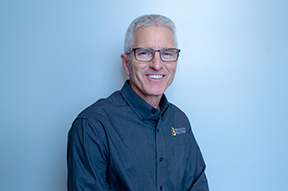
Subscribe to The Welsh Wire podcast on iTunes for additional informative, entertaining interviews with west Michigan business leaders.
- The Welsh Wire: Nate McFadden, Elevator Service Inc.
The Welsh Wire: Nate McFadden, Elevator Service Inc.
How do you survive in a sea of whales and sharks? By swimming faster, smarter and more nimbly. Nate McFadden has been the President and CEO of Elevator Service Inc. in Grand Rapids for the past year-and-a-half. Elevator Service Inc. is a 30-year-old elevator construction, modernization and repair company. His small firm successfully competes in an industry dominated by four giant companies. How does he do it? “In this industry, customers are not really satisfied with the multinational corporations and there's a real opportunity for us to to be different and to win on being courteous, thoughtful, doing a good job, being safe and communicating well,” Nate tells Sheri Welsh in an interview for The Welsh Wire podcast. “That's the simple part of it, but I also think it’s having the courage to go after larger projects and then having the plan in place to execute if we get them.” Nate says their customer service success stems from Elevator Service Inc. nurturing its reputation as a “destination company” for workers in the elevator construction and repair field. “I think if they're (employees) are engaged, if they're happy, if they believe in what the institution's trying to do, then customer services is a natural byproduct of that,” he says. “I think that's the reason we're a destination employer. We don't just say we like to take care of our people - if it's a personnel issue it's automatically my most important thing to do.” Listen to Sheri’s entire interview with Nate McFadden.Subscribe to The Welsh Wire podcast on iTunes for additional informative, entertaining interviews with west Michigan business leaders.
- The Welsh Wire: Nathan Baar of HealthBar Shaking Up the West Michigan Wellness Industry
The Welsh Wire: Nathan Baar of HealthBar Shaking Up the West Michigan Wellness Industry
Nathan Baar, founder/CEO of HealthBar, is striving to shake up the West Michigan wellness industry with nurse-led, on-demand, accessible and customizable healthcare services. HealthBar was recently recognized as a member of the Michigan 50 Companies to Watch for 2022.
“What we're trying to do is mobilize and really make available nurses within the communities that we live in, in businesses and schools and out and about where people are, where our patients are,” Baar tells Sheri Welsh on The Welsh Wire podcast.
“It's this idea of saying, healthcare is consolidating into these large, mega structures that are intimidating and hard to access and becoming more and more expensive," Baar explained. "And we're saying how do we kind of break that mold–almost getting back to the days of when you had your doc going to your house to check up on you and to see you. And we want to do that again, but through the nursing profession.”
Baar discussed how he was motivated to start HealthBar by his experiences as a leader in hospital ER nursing environments, where he saw the positive impact that nurses can have in proactively managing health issues.
HealthBar, launched in 2020, is Baar’s first experience as a business owner.
“It's very difficult. And I think, you know, for those who want to be entrepreneurs, there's a certain grittiness that you just have to have to dig down and get through some of those tough times. Looking over these two years, we have been very successful, and we built some amazing programs.”
Listen to this week’s podcast to hear more from Baar about HealthBar and its healthcare services. Subscribe to The Welsh Wire podcast on iTunes for additional informative, entertaining interviews with West Michigan business leaders. - The Welsh Wire: Nolan Finley and Stephen Henderson of The Civility Project
The Welsh Wire: Nolan Finley and Stephen Henderson of The Civility Project
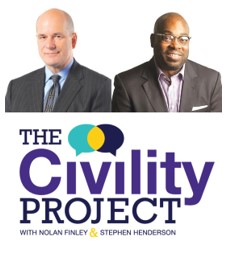 Is it possible to have civil conversations with people whose politics you disagree with? The founders of The Civility Project, celebrated journalists Nolan Finley and Stephen Henderson, believe it can be done, and they bring their message of disagreement-but-mutual respect to a west Michigan webinar on Sept. 15 from 12:30 to 1:30 p.m.
Sheri Welsh previewed the webinar when she interviewed Finley and Henderson for this week’s The Welsh Wire podcast.
“It is becoming more and more uncommon for people to form friendships across the political divide, and over the past few years, it’s become virtually impossible,” says Finley, who formed a friendship with Henderson, his ideological opposite, when Finley was editorial page editor at The Detroit News and Henderson was editorial page editor at The Detroit Free Press.
“In Nolan’s and I’s minds, it really is about everybody, it really is about those every day interactions we have that have deteriorated so much in the last few years,” Henderson says.
The Civility Project webinar at on Sept. 15 from 12:30 to 1:30 p.m., will teach participants how to agree to disagree, engage in civil conversation, build respect for each other’s humanity, learn to listen to other sides, use what you hear to challenge or affirm your own viewpoints and stay curious.
The Civility Project is sponsored by Delta Dental.
Learn more about the Civility Project webinar in this week’s The Welsh Wire podcast. Listen to the full interview with Finley and Henderson.
Subscribe to The Welsh Wire podcast on iTunes for additional informative, entertaining interviews with west Michigan business leaders.
Is it possible to have civil conversations with people whose politics you disagree with? The founders of The Civility Project, celebrated journalists Nolan Finley and Stephen Henderson, believe it can be done, and they bring their message of disagreement-but-mutual respect to a west Michigan webinar on Sept. 15 from 12:30 to 1:30 p.m.
Sheri Welsh previewed the webinar when she interviewed Finley and Henderson for this week’s The Welsh Wire podcast.
“It is becoming more and more uncommon for people to form friendships across the political divide, and over the past few years, it’s become virtually impossible,” says Finley, who formed a friendship with Henderson, his ideological opposite, when Finley was editorial page editor at The Detroit News and Henderson was editorial page editor at The Detroit Free Press.
“In Nolan’s and I’s minds, it really is about everybody, it really is about those every day interactions we have that have deteriorated so much in the last few years,” Henderson says.
The Civility Project webinar at on Sept. 15 from 12:30 to 1:30 p.m., will teach participants how to agree to disagree, engage in civil conversation, build respect for each other’s humanity, learn to listen to other sides, use what you hear to challenge or affirm your own viewpoints and stay curious.
The Civility Project is sponsored by Delta Dental.
Learn more about the Civility Project webinar in this week’s The Welsh Wire podcast. Listen to the full interview with Finley and Henderson.
Subscribe to The Welsh Wire podcast on iTunes for additional informative, entertaining interviews with west Michigan business leaders. - The Welsh Wire: Pam Olson of Crystal Flash
The Welsh Wire: Pam Olson of Crystal Flash
Crystal Flash is an eight-decade-old employee-owned petroleum distribution company. Because their 280 employees are spread out in multiple locations across Michigan, northern Indiana and northwest Ohio, it faces some unique challenges when trying to maintain engagement, accountability and an understanding of the “big picture” of company goals and objectives. One technique they use is making everyone in the organization responsible for developing their individual plan-on-a-page and reporting their progress in meeting organizational objectives. “Over half of our workforce are the delivery drivers, so things very specific like miles and gallons and things that relate to their day-to day work, are the focus of our key performance indicators for customer service,” says Pam Olson, Vice President of Human Resources for Crystal Flash. She talked recently with Sheri Welsh on The Welsh Wire podcast. “We had some of these tools in place, we developed some others, and we really started pulling it together so people could understand how it all worked and connected to the overall strategy.” Videos messages and tutorials are an important communications tool for Crystal Flash, and Olson says helping workers understand manageable targets and objectives is a priority. “(It’s) things that made sense to them in their day-to-day work. It was just trying to connect that-day-to day work in their results and understanding how it drives the business and the overall company results.” She says that driving the culture of the organization as being-employee owned is a great asset for recruiting workers. “Being employee owned (is) a great retirement vehicle. That may not always resonate with folks when they're first considering coming on board with us but what does resonate is the fact that you get to work with a group of folks that are dedicated to the organization, understand how to make a contribution and that your work and effort is seen and recognized,” Olson says. Listen to Sheri’s entire interview with Pam Olson.Subscribe to The Welsh Wire podcast on iTunes for additional informative, entertaining interviews with west Michigan business leaders.
- The Welsh Wire: Park Kersman and Phil Pearce, 75th Anniversary, Lorin Industries, Inc.
The Welsh Wire: Park Kersman and Phil Pearce, 75th Anniversary, Lorin Industries, Inc.
Lorin Industries, Inc. of Muskegon, the global industry leader in the innovation and production of coil anodized aluminum, in 2018 celebrates 75 years in business. Sheri Welsh interviewed Lorin Industries President and CEO Park Kersman and his Vice President for Global Sales & Marketing Phil Pearce for The Welsh Wire podcast to learn more about this significant business milestone. “We want to continue to be stewards of our community, stewards of the environment and continue contributing as the community has contributed to us,” Park told Sheri. “We’re proud to be in Muskegon, we plan on staying in Muskegon for as long as we are around. Park is the third generation of his family to be involved with Lorin Industries. “Every family situation is unique,” he said. “I've spoken to other family business owners that are either first, second or third generation and the opportunity is really to embrace the uniqueness of your own family business. It's so critical to maintain a balance that enables the company to be sustainable moving forward while involving the family so that so that they can contribute to that sustainability.” Not only is Park the third generation owner of the business, there are third generation employees still working at the firm. “You don't get that with every company,” said Phil Pearce. “In the course of the year we have been having some of these (longtime) employee do testimonials where they talk about it. And this has proven to be a really nice recruiting tool for us as well.” Get more business insights by listening to Sheri Welsh’s entire Welsh Wire interview with Park Kersman and Phil Pearce by clicking here. Listen to Sheri’s entire interview with Paul Kersman and Phil Pearce.Subscribe to The Welsh Wire podcast on iTunes for additional informative, entertaining interviews with west Michigan business leaders.
- The Welsh Wire: Park Kersman and Phil Pearce, Lorin Industries
The Welsh Wire: Park Kersman and Phil Pearce, Lorin Industries
There are not many small firms that stay in business for 75 years, through three generations of family ownership. But Lorin Industries in Muskegon, a leader in aluminum finishing and coil anodizing solutions, has thrived by being willing to change with the times -- including implementing a recent marketing reboot. “It's so important to know who you are, and what you know, what you mean to the marketplace,” says Lorin Industries President and CEO Park Kersman when asked what he would advise other business considering big changes in their marketing. “There's a lot of information that that can come from getting an understanding of your position in the market, and the perceptions of the markets and your customers." Park and his Vice President for Global Sales & Marketing Phil Pearce were interviewed by Sheri Welsh for The Welsh Wire podcast. Phil says it’s important not to be afraid of making marketing changes. “(If) you really do a thorough investigation of who you are, what you're all about, what you have to offer the market, then you've got to go in with both feet,” he says. “If you just stick your toe in you will not succeed. Because of how much work we're putting into the brand right right now, all the things that we're changing, if we stopped there and didn't continue to promote and aggressively support that, I don't think that we would have the success that we expect.” Listen to Sheri’s entire interview with Park Kersman and Phil Pearce.Subscribe to The Welsh Wire podcast on iTunes for additional informative, entertaining interviews with west Michigan business leaders.
- The Welsh Wire: Patrick Miles, Jr. of Barnes & Thornburg LLP
The Welsh Wire: Patrick Miles, Jr. of Barnes & Thornburg LLP
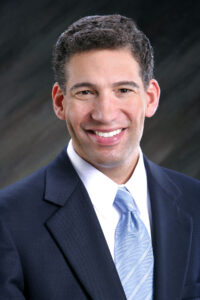 Privately-held companies can substantially benefit from having a board of directors, according to Patrick Miles, Jr., an attorney with Barnes & Thornburg law firm in Grand Rapids, Mich.
He talked with Sheri Welsh on The Welsh Wire podcast, sponsored by the Family Business Alliance, about how a board of directors provides outside expertise, strategic vision, and diverse viewpoints while still allowing the family to be involved in decision making.
“In my experience, it is advisable to add outside directors to a family owned business for the following reasons,” he says. “You can always, in essence, buy expertise, right? You can buy legal expertise, financial expertise, accounting, tax expertise. But it's very difficult to buy strategic vision and strategic thinking–people who understand your industry and can bring a different and broader perspective to the board table.”
Diversity on the board can also bring fresh viewpoints, Miles says.
“A lot of very good companies look for diverse board members because they know they're going to get the best thinking that's available when they're looking at people of different genders, different races, and different cultures. They are able to really expand their thinking and broaden their understanding. Nothing bad is going to come out of that.”
What kind of people make good board members?
“I think you're looking for not just good technicians, you’re looking for somebody who has a broader vision, who's thinking strategically, thinking long term and where your company fits in the marketplace and where it could potentially go in the market or in different markets. Somebody with the experience in operations or finance or legal or tax, with that type of [broad] thinking can be extremely, extremely helpful to a board and to a company.”
Listen to Sheri’s full interview with Patrick Miles, Jr. to learn more about how having a board of directors can help privately-owned businesses.
Subscribe to The Welsh Wire podcast on iTunes for additional informative, entertaining interviews with west Michigan business leaders.
Privately-held companies can substantially benefit from having a board of directors, according to Patrick Miles, Jr., an attorney with Barnes & Thornburg law firm in Grand Rapids, Mich.
He talked with Sheri Welsh on The Welsh Wire podcast, sponsored by the Family Business Alliance, about how a board of directors provides outside expertise, strategic vision, and diverse viewpoints while still allowing the family to be involved in decision making.
“In my experience, it is advisable to add outside directors to a family owned business for the following reasons,” he says. “You can always, in essence, buy expertise, right? You can buy legal expertise, financial expertise, accounting, tax expertise. But it's very difficult to buy strategic vision and strategic thinking–people who understand your industry and can bring a different and broader perspective to the board table.”
Diversity on the board can also bring fresh viewpoints, Miles says.
“A lot of very good companies look for diverse board members because they know they're going to get the best thinking that's available when they're looking at people of different genders, different races, and different cultures. They are able to really expand their thinking and broaden their understanding. Nothing bad is going to come out of that.”
What kind of people make good board members?
“I think you're looking for not just good technicians, you’re looking for somebody who has a broader vision, who's thinking strategically, thinking long term and where your company fits in the marketplace and where it could potentially go in the market or in different markets. Somebody with the experience in operations or finance or legal or tax, with that type of [broad] thinking can be extremely, extremely helpful to a board and to a company.”
Listen to Sheri’s full interview with Patrick Miles, Jr. to learn more about how having a board of directors can help privately-owned businesses.
Subscribe to The Welsh Wire podcast on iTunes for additional informative, entertaining interviews with west Michigan business leaders. - The Welsh Wire: Randy Boss of Ottawa Kent Insurance
The Welsh Wire: Randy Boss of Ottawa Kent Insurance
One of the first steps in managing risk in your business is to identify what the risks are. And who knows better what risks are out there than the men and women on the front lines: your employees. “We use as an employee interview system, we actually get a list of the employees that a company will want us to interview confidentially and we ask them what they think the risk issues are,” says Randy Boss, a risk management expert and partner in Ottawa Kent Insurance. The next step is analyzing the risk data and looking for patterns. “For example, working with a trailer repair company, I saw a lot of injuries and when we looked at what type of safety glasses they were using we found that they didn't fit properly. A change of suppliers of safety glasses, and voila, all the all the all the injuries went away,” Boss says. The third step is having a good set of safety policies and procedures that can help control risk issues. Boss recommends setting up a safety committee to get employees to take ownership in having a safe workplace. “If you do the first three steps, effectively, you'll get rewarded here on the finance piece,” he says. “One thing we know is that you have to then match the correct finance insurance policy to the risk once it's lowered. Otherwise, the only one that wins is the insurance company.” Monitoring and measuring is the final key element of risk management. “This is where you score how well your plan is operating, and how well it's working and what needs to be adjusted. And this is where I take ownership if it's my scorecard as well. So I'm when I'm walking someone through it, this is where I show them the results if their adjustments need to be made. We make them there and and we start all over again.” Boss’ final risk management suggestion? “You can't manage risk from the office, you have to get out into the plant, talk to the folks, kind of see what the situation is out there.” Learn more about managing risk in your small business by listening to Sheri Welsh interview Randy Boss of Ottawa Kent Insurance on The Welsh Wire podcast. Listen to Sheri’s entire interview with Randy Boss.Subscribe to The Welsh Wire podcast on iTunes for additional informative, entertaining interviews with west Michigan business leaders.
- The Welsh Wire: Revitalizing Downtown Kalamazoo with Treystar
The Welsh Wire: Revitalizing Downtown Kalamazoo with Treystar
Treystar, a local real estate development company, is playing a role in revitalizing downtown Kalamazoo by contributing $2 million toward renovating its Main Street East building. In a discussion on The Welsh Wire, Sheri Welsh speaks with Fritz Brown, a partner at Treystar, and Rachel Krasinski, its director of operations, shedding light on their latest project, The Desenberg—downtown Kalamazoo’s newest wedding and event center. Brown says the project is important to the future economic development of the region. “How do we keep the young adults that we educate here in Kalamazoo? How do we keep them gainfully employed? What will drive these people to stay in Kalamazoo, instead of going to Chicago, Detroit, New York, or California? That’s really what we're working on first of all—building a downtown and creating spaces,” he explains. “The Main Street East building was originally constructed in 1886 but is being updated with 21st-century technology,” says Krasinski. “We have a very large glass wall that's been installed,” she states. “The best way that I can describe how big it is and get people to visualize it is referencing Shaquille O’Neal. Shaq, he's like seven feet tall. It's one and a half Shaqs tall and three Shaqs wide. The wall can be used for everything from a whiteboard to media presentations to really cool visual designs. It can even be used for all three at the same time, because you can use it in different chunks.” Krasinski explains that The Desenberg is a great place for client presentations as well as conferences that are coming to the hotels but desire a breakout location for meetings. The Desenberg is expected to open this fall. Learn more from Fritz Brown and Rachel Krasinski’s talk with Sheri Welsh on this month’s The Welsh Wire podcast. Be sure to subscribe to The Welsh Wire on iTunes for additional informative, entertaining interviews with west Michigan business leaders. - The Welsh Wire: Rob Elliott of Pondera Leadership Consulting
The Welsh Wire: Rob Elliott of Pondera Leadership Consulting
Do you know who you really are? You better if you want to be an effective business leader. Self-awareness is crucial to leadership, says Rob Elliott, a partner in Pondera Leadership Consulting. He talked recently with Sheri Welsh for The Welsh Wire podcast, sponsored by the Family Business Alliance. “We believe as a leader, to successfully lead other people, you need to first of all be aware of your strengths, of your gifts, of the things that you do exceptionally well,” Elliott says. “And ideally, you want to set yourself up for success in that you spend most of your time focusing on the things that you do exceptionally well.” That’s not to say that you should ignore your shortcomings. “People need to be aware of their limitations, the things about me that get in the way, that create noise, create interference, create problems in my work. We have to become aware of our blind spots, we have to be open to learning about aspects of our personality that really create problems for us with other people that we weren’t aware of,” he says. Self-awareness contributes to authenticity, which is another important component of successful performance. “We find in our work that nine times out of ten, when clients ask us to try to help them with someone who's not performing well, almost always it's because the person isn't in the right job, there's no alignment between who they are and what they do,” says Elliott. “And in discovering your authentic leadership, we take our clients through a process to help them start to really look deeply at who they really are. And so people get to show up at work and just be themselves. They just express their God-given talents. They're not always working outside of themselves.” Listen to Sheri’s entire interview with Rob Elliott. Subscribe to The Welsh Wire podcast on Apple Podcasts for additional informative, entertaining interviews with west Michigan business leaders.
- The Welsh Wire: Robert Stead, Michigan Managing Partner of Barnes & Thornburg LLP of Grand Rapids
The Welsh Wire: Assimilating Non-Family Executives in the Family Business featuring Robert Stead, Michigan Managing Partner of Barnes & Thornburg LLP, Grand Rapids, MI

Sometimes, family-owned businesses find in their succession planning that family members lack the interest or passion to carry on the business operations. In a recent interview by Sheri Welsh of The Welsh Wire podcast, Robert Stead, Michigan Managing Partner for Barnes & Thornburg of Grand Rapids, says, “We have a couple of choices, either we can sell this business and turn it over to somebody else, or we can find the next person to lead the organization and take it forward.”
Stead tells Sheri that the family has to consider if they are willing and prepared to bring an outsider in to run their organization. He analogizes, “If you come in as a football coach for a professional football team, you really want to have control over personnel and policy and what type of organization you're going to have. He continues with, “If you have a coach that comes in, but there's a general manager above them (in this case, the general manager really might be the family) who’s not committed nor gives the coach authority to make decisions with the players, then I think it's a real challenge for that outsider to come in and be successful.”
Other considerations include deciding if the family is aligned with the outsider’s priorities. Will the family support the new leader’s initiatives and priorities, and will the new leader have flexibility to establish compensation and incentive programs for the organization?
Learn more as Robert Stead talks with Sheri Welsh on this week’s The Welsh Wire podcast, sponsored by the Family Business Alliance. Subscribe to The Welsh Wire on iTunes for additional informative, entertaining interviews with West Michigan business leaders.
- The Welsh Wire: Rockstar Woman Movement featuring Shannon Cohen
The Welsh Wire: Rockstar Woman Movement featuring Shannon Cohen
 An interest in invigorating and energizing business conferences and networking events helped to inspire west Michigan business leader Shannon Cohen to launch the rapidly expanding Rockstar Woman Movement.
Cohen, who is also an author, podcaster, and entrepreneur, talked about her mission when she was interviewed by Sheri Welsh for the Welsh Wire podcast, sponsored by the Family Business Alliance.
“I was going to women’s networking events as a business owner and found myself frustrated,” she says. “I would look around the room, but yet all of the vendors and especially the supply-chain ones would all be men, or they would only be white women-owned businesses.”
“With the Rockstar Woman Movement, we want to build friendships; we want to build them across disciplines, across industries, across lived and intersectional identities. That starts with design. How do you design a space that is a reflection of my expertise around emotional intelligence, psychological safety, and equity? How do we design for belonging from the onset and make it fun? And so, we've brought all those elements together.”
Cohen says that in five years, her Rockstar Woman events have grown from several hundred attendees to 850 expected for the Sept. 24 brunch.
“Always, my goal is that women will get in this room and be able to build relationships. And we don't do stuffy, we do unforgettable. So, there's not that social awkwardness that's typically there, and they can cross pollinate ideas with other difference makers that act to help them to activate aspirations, ambition, and wellness goals that they have.”
Learn more from Cohen as she talks with Sheri Welsh on this week’s The Welsh Wire podcast. Subscribe to The Welsh Wire on iTunes for additional informative, entertaining interviews with west Michigan business leaders.
An interest in invigorating and energizing business conferences and networking events helped to inspire west Michigan business leader Shannon Cohen to launch the rapidly expanding Rockstar Woman Movement.
Cohen, who is also an author, podcaster, and entrepreneur, talked about her mission when she was interviewed by Sheri Welsh for the Welsh Wire podcast, sponsored by the Family Business Alliance.
“I was going to women’s networking events as a business owner and found myself frustrated,” she says. “I would look around the room, but yet all of the vendors and especially the supply-chain ones would all be men, or they would only be white women-owned businesses.”
“With the Rockstar Woman Movement, we want to build friendships; we want to build them across disciplines, across industries, across lived and intersectional identities. That starts with design. How do you design a space that is a reflection of my expertise around emotional intelligence, psychological safety, and equity? How do we design for belonging from the onset and make it fun? And so, we've brought all those elements together.”
Cohen says that in five years, her Rockstar Woman events have grown from several hundred attendees to 850 expected for the Sept. 24 brunch.
“Always, my goal is that women will get in this room and be able to build relationships. And we don't do stuffy, we do unforgettable. So, there's not that social awkwardness that's typically there, and they can cross pollinate ideas with other difference makers that act to help them to activate aspirations, ambition, and wellness goals that they have.”
Learn more from Cohen as she talks with Sheri Welsh on this week’s The Welsh Wire podcast. Subscribe to The Welsh Wire on iTunes for additional informative, entertaining interviews with west Michigan business leaders. - The Welsh Wire: Sara Fazio, Kreis Enderle
The Welsh Wire: Sara Fazio, Kreis Enderle
One of the key but underappreciated benefits of having a succession plan for your small business is the impact on employee retention. A succession plan helps make your workers more confident that the company, and their jobs, are going to survive the illness of death or the business owner. “Because if you don’t have that and there’s a medical event, or dementia, you get a lot of nervousness, and if there’s a decent job market people will start leaving,” says Sara Fazio, an attorney and succession planning expert with Kreis Enderle in Grand Rapids. “So you need to give them that confidence that the business is going to survive any different sort of medical situations and that the business itself is not the same as the human being. It will continue to thrive regardless of what happens to a single person.” Fazio says it’s not enough to have a succession plan -- it also needs to be effectively communicated to your management team and family. Listen to Sheri's entire interview with Sara Fazio.Subscribe to The Welsh Wire podcast on iTunes for additional informative, entertaining interviews with west Michigan business leaders.
- The Welsh Wire: Shannon Bronsink and Cassie Goodband, Keyser Insurance
A couple of Kalamazoo insurance executives are shaking up the West Michigan human resources world through their participation in a global event series called DisruptHR. Shannon Bronsink, Director of Marketing & Communications for Keyser Insurance Group in Kalamazoo, and Cassie Goodband, Keyser Sales Executive, organized Kalamazoo and Grand Rapids DisruptHR events last summer. They talked about the program with Sheri Welsh for The Welsh Wire. “One of the things that we like to do is bring value to our client relationships, so one of our core values is always learn and grow,” Bronsink says. “If we can help our clients do that, even better. So we brought Disrupt HR to them so they can learn about HR in a different way.” What’s different is DisruptHR’s dynamic, fast-moving presentation scheme -- 14 speakers get only five minutes each, with slides rotating every 15 seconds. “I think HR people, a lot of times get the reputation for being boring and really serious, good at following rules. Disrupt HR is the exact opposite of that. The whole idea is to inform, energize, empower people who work in this space and get them to think differently about their work,” says Bronsink. Goodband says DisruptHR provides value beyond the HR space. “I love spending time with our future clients, we get to deepen our relationship with them, bring them value,” she says. “We learned about some challenges that they have beyond insurance. And then we connected them with people that could identify with that and help them in ways that we can.” A Kalamazoo DisruptHR event is scheduled for May 1. Learn more. Listen to Sheri's entire interview with Shannon Bronsink and Cassie Goodband. The Welsh Wire: Shannon Bronsink and Cassie Goodband, Keyser Insurance
The Welsh Wire: Shannon Bronsink and Cassie Goodband, Keyser InsuranceSubscribe to The Welsh Wire podcast on iTunes for additional informative, entertaining interviews with west Michigan business leaders.
- The Welsh Wire: Shawn Premer and Monica Lloyd
The Welsh Wire: Shawn Premer and Monica Lloyd
Remote work will continue to be a reality in the business world in 2021, which means that business leaders will need to focus on maintaining employee morale and strengthening company culture, according to two top workplace experts who were interviewed by Sheri Welsh for this week’s The Welsh Wire podcast.
Shawn Premer is Chief Human Resources Officer for Consumers Credit Union in Kalamazoo, and thinks that most employees will work at least part time from home this year.
In order to make that successful, “you have to understand what each individual needs from you as a leader,” she says. “So having that conversation to say, hey, I know this environment is different. What do you need from me?”
Defining your company culture will also play a crucial role in keeping your employees engaged, says Monica Lloyd, Leadership Consultant with leadership development firm ADVISA.
“What we're finding is defining [culture] and making sure that your leaders say it the same way, right? How would you describe our culture? And if you're getting 10 different answers from 10 different leaders, then your employees are feeling your culture differently, because your leaders are doing it differently. So that's one thing that we're really helping our clients with is what does that look like? And then how do we create an employer brand that helps our managers with clear delineated guidelines so this behavior supports the culture?”
Always keep lines of communication open, says Premer. “If I can remind you of anything, just you cannot communicate too much, or in too many different ways.”
Listen to Sheri’s full interview with Shawn Premer and Monica Lloyd talk on this week’s The Welsh Wire podcast.
Subscribe to The Welsh Wire podcast on iTunes for additional informative, entertaining interviews with west Michigan business leaders. - The Welsh Wire: Shawn Premer, Consumers Credit Union
The Welsh Wire: Shawn Premer, Consumers Credit Union
Consumers Credit Union is one of west Michigan’s premier financial institutions and a desirable employer of choice. It attained that status thanks to their development of a well-respected workplace culture, manifested by their gleaming new employee-friendly headquarters on the west side of Kalamazoo. Sheri Welsh recently talked on the Welsh Wire podcast with Shawn Premer, Consumers Credit Union Chief Human Resources Officer, about how to improve workplace culture. “The very first step is to make sure that leadership is on the same page with wanting the change,” Premer says. “You can’t change a culture, reboot a culture, unless you have cohesiveness at the top. Because it really needs to come from the top down. They (leadership) have to be living and breathing the values that you say you want reflected in that culture.” Premer says it’s also important to ask your team members what they like about the company culture and working at your firm, and what you need to do to keep them engaged. Finally, she advises taking action on the answers you get. Watch Sheri’s entire interview with Shawn Premer or listen to the audio.Subscribe to The Welsh Wire podcast on iTunes for additional informative, entertaining interviews with west Michigan business leaders.
- The Welsh Wire: Stacey Hamlin of CTS Telecom
The Welsh Wire: Stacey Hamlin of CTS Telecom
Millions of years ago, nimble mammals managed to survive beneath the feet of mighty dinosaurs. There are some parallels with today’s Michigan telecom industry, where family-owned CTS Telecom has thrived amidst big company behemoths. How did they do it? By taking calculated risks and not being afraid to fail. “Of course, that's a big deal, because we're dealing in technology,” says Stacey Hamlin, CTS Telecom president and CEO. “And a lot of it is getting on the right horse, and making sure that you're choosing the right path.” Hamlin recently talked with Sheri Welsh for The Welsh Wire podcast. “You cross your fingers sometimes, but you do try to do a lot of due diligence and research and see what the industry is doing. And you have good people on your team that can weed through all that stuff and help you choose. That's why it's calculated, I guess,” Hamlin says. CTS Telecom, which serves west Michigan with Internet, voice, data transport and IT solutions, has been operating since 1911. Hamlin’s grandfather bought the company in 1949. “My whole family worked there. My mom worked there. And my brothers and I would work there in the summers. So it was kind of a family affair. But to be honest, I didn't really think that I was going to work there as an adult. It really wasn't in my plans.” After college and a career out-of-state, a professional opportunity brought her and her husband back to Kalamazoo. She engaged with the family company, worked her way up through the ranks and became President and CEO in 2014. “It was one of those things where I was trying to fight it, I think a little, but then as I was learning more about the business, I thought this could be interesting, right?” Listen to Sheri’s entire interview with Stacey Hamlin.
Subscribe to The Welsh Wire podcast on iTunes for additional informative, entertaining interviews with west Michigan business leaders.
- The Welsh Wire: Stacy Paul on Winning the War for Talent with Culture
 The Welsh Wire: Stacy Paul on Winning the War for Talent with Culture
The Welsh Wire: Stacy Paul on Winning the War for Talent with CultureOne of Michigan’s top small business engineering firms has built its company recruitment efforts around culture—a culture that encourages engineers to grow and develop personally and professionally as well as connect with their community.
Stacy Paul, CEO of Array of Engineers, a certified women-owned small business in Grand Rapids, Mich., and a member of the Michigan 50 Companies to Watch, says they recruit talent to fit the firm’s core values. She talked recently with Sheri Welsh for The Welsh Wire podcast.
“[We support] promotion of innovation and creativity, not ever wanting to put somebody in a box, allowing them to expand and be super creative, no matter what the task is,” Paul says. “And that goes along with helping each employee reach their highest potential.”
Other core values include having a good relationship and open communication with their customers, and engaging with the West Michigan community to promote science, technology, engineering, and mathematics (STEM) education.
Array of Engineers creates embedded systems for aerospace, defense, medical devices, and “Internet of Things” customers. Paul believes the company’s culture and core values make it attractive to potential employees.
“In every decision that you might have to make, you have to [ask] if this is really following our core values," Paul said. "We have a fabulous core team that we work with and we talk about our goals as a company.
"We have our three-month goals, six-month goals, one-year goals, and then our super far-out goals, because it's important to have big dreams. And then always looking back at our core values and thinking, if these are the right goals for us at the time, and they change. It’s okay to change what your goals are going to be.”
Hear more of Paul’s discussion about winning the war for talent with culture on this week’s The Welsh Wire podcast. Listen to the full interview with Stacy Paul. Subscribe to The Welsh Wire podcast on iTunes for additional informative, entertaining interviews with West Michigan business leaders. - The Welsh Wire: Steve Owens of Consumer Credit Union
The Welsh Wire: Steve Owens of Consumer Credit Union
 Do you have a strategic plan? Of course you do! What business doesn’t at least profess to have a strategic plan to help guide them to future success? And yet, what good is a strategic plan if it’s done once and then sits gathering dust on a shelf?
“Strategic planning is not an event, it's dynamic, it's alive,” says Steve Owens, chief lending officer for Consumer Credit Union in Kalamazoo. He recently talked with Sheri Welsh for The Welsh Wire podcast. “In order for [the strategic plan] to be nimble, it has to be visited, worked at constantly.”
Consumers Credit Union must be doing something right with their strategic planning, because it has grown to a hundred thousand members and billion dollars in assets since its founding in 1951. “I think one of the interesting ways that we structure our strategic plan, in the planning around it, is it's a broad based team of leadership that's involved and we really try to get to placing strategic emphasis on areas outside of our core,” he says.
In practice, that means existing Consumers Credit Union products being introduced to new markets or new products being introduced to to existing markets. “Our vision will change with the strategic planning process, typically once every three to five years,” Owens says. “But you know, you have your values and they can't be compromised, so the these initiatives do feed strategic fulfillment of the vision.”
Owens says Consumers Credit Union likes to try small scale tests of new products and markets before rolling them out on a larger scale. “[You can’t] completely shift the emphasis of the entire organization overnight, right? Nobody's that nimble. But if you're not testing and learning along the way, you're not going to it. [Your]core won't grow and parts of it'll die. And you'll end up shrinking.”
Learn more about how to keep your business planning nimble by listening to Sheri Welsh’s entire The Welsh Wire podcast interview with Steve Owens of Consumers Credit Union.
Listen to Sheri’s entire interview with Steve Owens.
Do you have a strategic plan? Of course you do! What business doesn’t at least profess to have a strategic plan to help guide them to future success? And yet, what good is a strategic plan if it’s done once and then sits gathering dust on a shelf?
“Strategic planning is not an event, it's dynamic, it's alive,” says Steve Owens, chief lending officer for Consumer Credit Union in Kalamazoo. He recently talked with Sheri Welsh for The Welsh Wire podcast. “In order for [the strategic plan] to be nimble, it has to be visited, worked at constantly.”
Consumers Credit Union must be doing something right with their strategic planning, because it has grown to a hundred thousand members and billion dollars in assets since its founding in 1951. “I think one of the interesting ways that we structure our strategic plan, in the planning around it, is it's a broad based team of leadership that's involved and we really try to get to placing strategic emphasis on areas outside of our core,” he says.
In practice, that means existing Consumers Credit Union products being introduced to new markets or new products being introduced to to existing markets. “Our vision will change with the strategic planning process, typically once every three to five years,” Owens says. “But you know, you have your values and they can't be compromised, so the these initiatives do feed strategic fulfillment of the vision.”
Owens says Consumers Credit Union likes to try small scale tests of new products and markets before rolling them out on a larger scale. “[You can’t] completely shift the emphasis of the entire organization overnight, right? Nobody's that nimble. But if you're not testing and learning along the way, you're not going to it. [Your]core won't grow and parts of it'll die. And you'll end up shrinking.”
Learn more about how to keep your business planning nimble by listening to Sheri Welsh’s entire The Welsh Wire podcast interview with Steve Owens of Consumers Credit Union.
Listen to Sheri’s entire interview with Steve Owens.
Subscribe to The Welsh Wire podcast on iTunes for additional informative, entertaining interviews with west Michigan business leaders.
- The Welsh Wire: Steve Owens of Consumers Credit Union
The Welsh Wire: Steve Owens of Consumers Credit Union
A billion dollar, 100 thousand-member credit union may not seem like the kind of place you’d identify as a hotbed of innovation. But the leaders of Consumers Credit Union in west Michigan recognized that if they were going to remain relevant to their members, and grow and prosper in the rapidly changing lending world, they needed to tap into the creativity of all their employees. It begins with fostering a culture of innovation, says Steve Owens, Consumers Credit Union chief lending officer. He talked recently with Sheri Welsh on the Welsh Wire Podcast. “It’s correlated with investing," Steve says. "(If) you make investments in innovation, and test and learn from those investments, and you actually bring those innovations into your core, they'll become a part of who you are. But unless your organization has a routine of developing those (innovations), you just going to become irrelevant. You'll be passed by.” Steve says Consumers uses a concept called the Idea Factory to get their employees involved in making innovation a regular part of their company operations. “I think the way we run Idea Factory itself is a test and learn,” he says. “We run 30 day contests, we run a 60 day contest, we do it as a message board, it's all test and learn and figure out, wow, that was a wild success -- why don't we try changing this and see how how that works, right? Or we were disappointed (about) how that went, let's see if we can run it a different way. You just have to be open to changing things.” Learn more about the Consumers Credit Union Idea Factory by listening to Sheri Welsh’s entire Welsh Wire interview with Steve Owens by clicking here. Listen to Sheri’s entire interview with Steve OwensSubscribe to The Welsh Wire podcast on iTunes for additional informative, entertaining interviews with west Michigan business leaders.
- The Welsh Wire: Sue Tellier, JetCo Solutions
The Welsh Wire: Sue Tellier, JetCo Solutions
When you’re a small business that relies on highly skilled but highly specialized workers, you need to craft a very thoughtful interview procedure to make sure you can recruit the talent you need. “Our methodology for interviews has nothing to do with gotchas’, we have no gotcha’ questions,” says Sue Tellier, owner of JetCo Solutions in Grand Rapids, a company that provides services to help small firms win government contracts. “We’re genuinely trying to find out if someone is going to be a good long term fit for us.” Tellier says in their interviews they try to over communicate the essence of their company culture, which includes projecting calm to their customers in the face of tight deadlines. Therefore, they ask questions to try and identify candidates who won’t panic and weed out people who have a history of workplace drama. “(JetCo) is small enough that every hire can affect our culture, and so we’re very conscious of making sure that we still have the same drama-free, hard working, have fun, no-whining culture that we’ve worked really hard to build,” she says. Listen to Sheri's entire interview with Sue TellierSubscribe to The Welsh Wire podcast on iTunes for additional informative, entertaining interviews with west Michigan business leaders.
- The Welsh Wire: Talent Attraction and Retention Tips
The Welsh Wire: Talent Attraction and Retention Tips
Talent attraction and retention remains a major challenge for businesses large and small. Here are tips and advice from recent guests on The Welsh Wire podcast. When Webb Chemical Service Corporation, a full-service chemical distributor with locations in Muskegon Heights, Michigan and Fort Wayne, Indiana, began facing the challenges of rapid growth and a changing culture, they called in the expertise of business consulting company DISHER in Zeeland, Michigan. DISHER worked closely with Webb’s leaders to develop a culture vision that all their employees can buy into. “Every employee meeting, every departmental meeting, every picnic, every Christmas party, we bring up some piece of it, we talk about it,” says Brad Hilleary, owner/CEO of Webb. Culture is a crucial part of talent attraction, Hilleary says. “Millennials, if you ask them, or allow them to ask a question in the interview, they will say, what's your culture? It's very, very, very important to them. And so we do culture on purpose now and we talk about it and we invite others to add it. Our culture is ever evolving because we want the creativity and the new ideas from the new folks to be part of the core of who we are.” Most businesses in Michigan offer some level of health insurance coverage if they want to recruit and retain quality employees. But few go so far as Schupan & Sons in Kalamazoo, which provides its workers with an onsite health center. “Retention plays a lot into this. You know there's no one silver bullet to retain an employee. People want to go to a place that they actually enjoy going to work. We've really worked hard over the years to have a fun environment,” according to John Barry, president of Schupan Aluminum & Plastic Sales, a division of Schupan & Sons. “The goal really was to have happier employees, have better access to care. The disease prevention portion of it was really was really big for us, just because we knew that with the length of the [healthcare] appointments and all the different things that they'd be able to talk about, hopefully you can catch something that maybe it wouldn't have before.” Miniature Custom Manufacturing of Vicksburg has grown from a single employee in 2007 to over 75 employees today. The plastic injection molding firm specializes in automotive, food packaging and medical, and was recently recognized as a member of the 2019 Michigan 50 Companies to Watch. “People say sales are the lifeblood of an organization,” says Kevin Murphy, president and co-owner. “I agree with that. But right behind it is your culture, because without a strong culture, you're going to turn people over.” In these tight labor markets, turnover can be deadly to business success. So, Murphy puts his people first. “We manage our business on three things: people first, quality second, production third. I believe in the golden rule. You do unto others what you want others to do to you. I never asked someone to do something that I wouldn't do myself.” Get great ideas on business success every week when Sheri Welsh talks with west Michigan’s best business leaders on The Welsh Wire podcast. Listen to The Welsh Wire's Talent Retention and Attraction Tips.Subscribe to The Welsh Wire podcast on iTunes for additional informative, entertaining interviews with west Michigan business leaders.
- The Welsh Wire: Talent Talks with Ashley Iovieno of Michigan Works! Southwest
The Welsh Wire: Talent Talks with Ashley Iovieno of Michigan Works! Southwest
Struggling against the headwind of a steadily shrinking workforce, small business owners across West Michigan continue to find it difficult to get good, talented workers. But Ashley Iovieno, Business Services Manager for Michigan Works! Southwest at the W.E. Upjohn Institute, says there are some effective strategies that entrepreneurs can use to snag the employees they need. She talked recently with Sheri Welsh for The Welsh Wire podcast about talent acquisition and the tools that Michigan Works! has available to assist businesses in filling their workforce needs.
Iovieno says it’s important to implement outreach to the places that potential workers may be found.
“Think about even your marketing strategy—where are people going? Grocery stores, Lowe's, Menards, places like that? Is there a way to advertise there to get your openings in front of people? What other word of mouth things are you doing?
"One thing I did see that was kind of unique that McDonald's was doing, everybody that got a receipt had this little piece of paper that was attached to it that had their openings and their opportunities and said apply now. And that type of method can be applied across several different industries. It's really just creative strategies to continue to keep in front of people so that folks know that you're out there and you're hiring.”
Iovieno warns however that efforts to fill job openings should not detract from initiatives that help you keep the workers you already have.
“The biggest thing that we've seen is making people feel valued and that they're important and they're part of the team,” she said. “The Michigan Works! Employer Resource Network is one opportunity that we have that really focuses on the workforce once they're employed through employee support and training.”
Learn more techniques that help you address the talent shortage and retain your current workers by listening to this week’s The Welsh Wire podcast with Ashley Iovieno.
Subscribe to The Welsh Wire podcast on iTunes for additional informative, entertaining interviews with West Michigan business leaders.
- The Welsh Wire: The Business Case for Child Care, Featuring Scott Nykaza and Kristyn Buhl-Lepisto
The Welsh Wire: The Business Case for Child Care, Featuring Scott Nykaza and Kristyn Buhl-Lepisto
A leading West Michigan business is tackling the challenge of labor shortages by helping to solve one of employees’ major frustrations: accessing affordable, quality child care.
Scott Nykaza, CEO of Kalsec, and Kristyn Buhl-Lepisto, Executive Director of Kalamazoo County Ready 4s (KC Ready 4s), were interviewed by Sheri Welsh for this month’s The Welsh Wire podcast.
Nykaza says that Kalsec’s onsite child care center means that, “For parents that work here, or employees that work here who don't have kids in the center, they're happy to see that their colleagues are taken care of—that they can work and concentrate on their job and not have to worry about their kids or leave early or miss time off because everybody works as a team.
"When their colleagues are taken care of, they know that they're benefiting from that as well. So retention and recruiting are really big parts of the happiness we see from having such a program," Nykaza explained.
A statewide program called Tri-Share provides support for companies looking to develop child care support options for their workers.
“The cost of the child care is shared between the family, the employer and the state, so each pay is a third,” says Buhl-Lepisto. “It's a huge help to families and parents.”
Kalsec is the leading global producer of natural taste and sensory solutions, colors, food protection, and advanced hop products for the food and beverage industry. The mission of KC Ready 4s is to advance fully accessible, high-quality pre-kindergarten education for every 3 and 4-year-old in Kalamazoo County through collaborative leadership with public and private providers.
Listen to The Welsh Wire podcast featuring Scott Nykaza and Kristyn Buhl-Lepisto to learn more about tackling the challenge of labor shortages through access to affordable child care.
Addtional resources:
Child Care Resources Marshall Plan for Moms Child Care Report The Employer Childcare MenuSubscribe to The Welsh Wire podcast on iTunes for additional informative, entertaining interviews with West Michigan business leaders.
- The Welsh Wire: The REAL Reason We Have a Talent Shortage, Featuring Dr. Paul Isely, Associate Dean, Seidman College of Business, Grand Valley State University
The Welsh Wire: The REAL Reason We Have a Talent Shortage, Featuring Dr. Paul Isely, Associate Dean, Seidman College of Business, Grand Valley State University
 “Going forward, we’re never going to have enough workers.” That statement, however unpalatable it may be to small employers in West Michigan, is a realistic assessment of worker availability, according to Dr. Paul Isely, Associate Dean of Undergraduate Programs’ Seidman College of Business, Grand Valley State University. Dr. Paul Isely joined Sheri Welsh for this discussion on The Welsh Wire Podcast.
Millennials are a key demographic within the working age population and “that millennial group peaked way back in 2014-2015,” Isely says. “And since that time, the number of new 20- to 24-year-olds has been cycling down. And in fact, we're down more than ten percent from our peak just seven years ago. So that's a big deal.”
“Going forward, we’re never going to have enough workers.” That statement, however unpalatable it may be to small employers in West Michigan, is a realistic assessment of worker availability, according to Dr. Paul Isely, Associate Dean of Undergraduate Programs’ Seidman College of Business, Grand Valley State University. Dr. Paul Isely joined Sheri Welsh for this discussion on The Welsh Wire Podcast.
Millennials are a key demographic within the working age population and “that millennial group peaked way back in 2014-2015,” Isely says. “And since that time, the number of new 20- to 24-year-olds has been cycling down. And in fact, we're down more than ten percent from our peak just seven years ago. So that's a big deal.”
 Our state’s aging population is also a factor. “Michigan [in 2020-22] had a higher retiree rate than what we saw in the rest of the country. So, if we ask people who aren't in the labor force, why aren't you there, 50 percent of them tell us they're retired. That's a big number.”
Our state’s aging population is also a factor. “Michigan [in 2020-22] had a higher retiree rate than what we saw in the rest of the country. So, if we ask people who aren't in the labor force, why aren't you there, 50 percent of them tell us they're retired. That's a big number.”
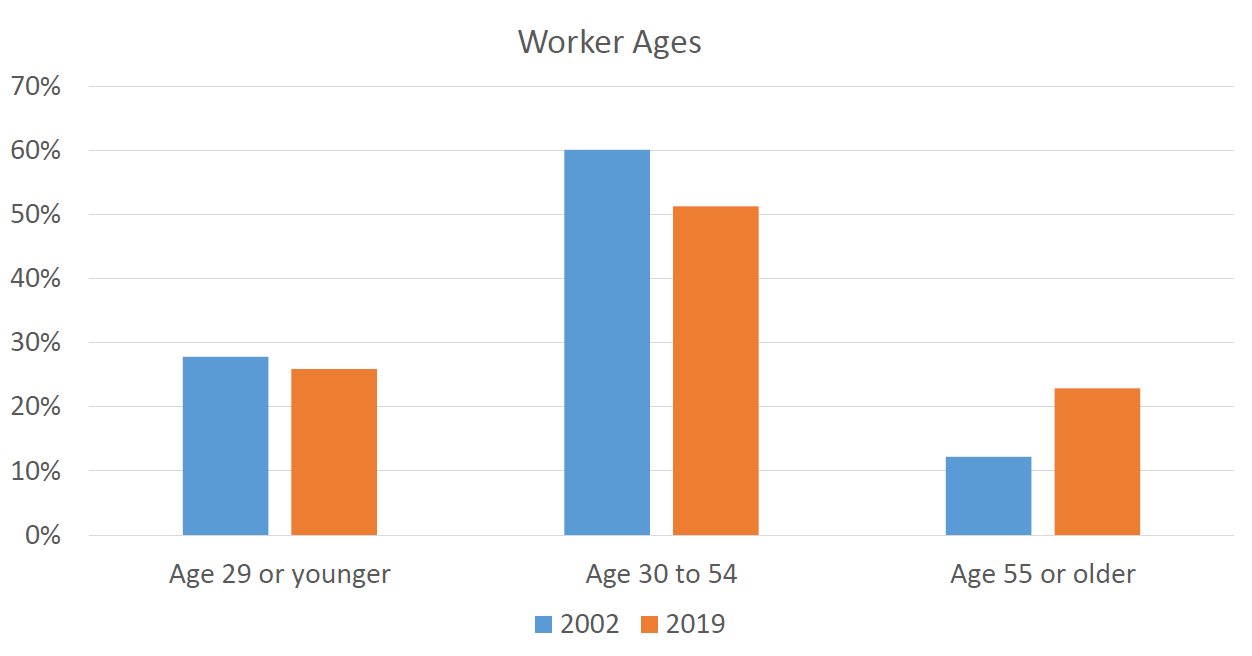 Isely and Welsh discussed several actions small employers can take that could help alleviate the worker shortage, including:
Isely and Welsh discussed several actions small employers can take that could help alleviate the worker shortage, including:
- Implementing more automation.
- Changing your workforce makeup to more part-time workers and considering job shares.
- Upskilling jobs by using more skilled workers to replace unskilled.
- Providing or subsidizing childcare (four percent of parents are still out of the workforce due to lack of childcare).
- Shifting in-person work to 8:30 a.m. - 2:30 p.m. with hybrid work outside of those hours (coordinated with school systems).
- Addressing Michigan’s social welfare benefits cliff.
- Rethinking businesses’ approach to talent acquisition.
- Nurturing students in middle school and high school, introducing them to careers and demonstrating what’s available to them.
- Providing more opportunities for interns.
 CLICK HERE to view the full report.
CLICK HERE to view the full report.
Learn more as Dr. Paul Isely talks with Sheri Welsh on this week’s The Welsh Wire podcast. Click here and Subscribe to the Welsh Wire on iTunes for additional informative, entertaining interviews with West Michigan business leaders.
- The Welsh Wire: The Regenerative Power of American Family Businesses, featuring Chandresh Baid and Ana Gonzalez of Grand Valley State University
The Welsh Wire: The Regenerative Power of American Family Businesses, featuring Chandresh Baid and Ana Gonzalez of Grand Valley State University
A new Grand Valley State University (GVSU) survey takes a look at the post-pandemic regenerative power of American family businesses and zeros in on the valuable leadership styles most commonly found in those firms. Sheri Welsh talks about the survey results on The Welsh Wire with the study authors Chandresh Baid, Assistant Professor of Management at GVSU’s Seidman College of Business; and Ana Gonzalez, Director of the Family-Owned Business Institute, Seidman College of Business. “Our survey results suggest that family business leaders in the USA greatly exhibit transformational leadership characteristics,” says Baid. “[These leaders] are good role models for others to follow and also foster collaborations in their organization. From the research perspective, this is also the leadership style that correlates positively with performance, entrepreneurial orientation, and also the general business regenerative power.” But many family business leaders, whether their leadership style is transformational, authoritarian, or charismatic, also tend to lean toward paternalistic behavior, notes Gonzalez. “Family businesses are characterized to have this hands-on approach, so they are on top of things when it comes to their employees. At the same time, they have very close relationships with their customers," Gonzalez says. "The thing is, as customers grow or business grows, this approach–even though it's very positive–cannot be sustainable because you're going to bring more employees, you're going to have more customers, so you cannot deliver the same thing. So, the paternalistic approach needs to be revisited." The report also includes insights on the nature of innovation in family businesses. “Of respondents, 74% said that their leaders favor a strong emphasis on R&D, technological leadership, and innovation,” Baid says. “However, only 42% of the respondents agreed that the changes in products or service lines have usually been quite dramatic. So, if I combined these two responses together, then what I believe is that family businesses, they emphasize innovation, but they tend to emphasize incremental over radical innovation.” Baid advises family business owners to “make small investments now, so that when the market changes, they are not caught behind.” Download the entire study report at www.gvsu.edu/fobi.Listen to The Welsh Wire podcast featuring Chandresh Baid and Ana Gonzalez in its entirety.
Subscribe to The Welsh Wire podcast on iTunes for additional informative, entertaining interviews with West Michigan business leaders.
- The Welsh Wire: The Welsh Wire: Doug Lepisto, Sleeping Giant Capital
The Welsh Wire: Doug Lepisto, Sleeping Giant Capital
 “We're all about creating a big win” for sellers of west Michigan businesses and their potential buyers, according to Doug Lepisto, co-founder and managing partner of Sleeping Giant Capital.
Sleeping Giant Capital (which Lepisto says is 80 percent focused on west Michigan) connects sellers, aspiring owner-operators, and investors with the goal of completing a successful acquisition and transition of small business ownership, he tells Sheri Welsh on The Welsh Wire podcast.
“So for us, that means creating a win for the aspiring owner operator who comes through our program, changing their life,” he says. “You're not getting a certificate when you come take our class, you are getting a life change. That's the promise of it. We want to make an impact and provide a trusted option for those sellers who know that we have a partner that would be acquiring their business but with a long term hold with aligned values that want to take care of their stakeholders.”
Sleeping Giant Capital has a relationship within the Western Michigan University Haworth College of Business Center for Principled Leadership and Business Strategy, where Lepisto is co-director. The center serves students, executives and the west Michigan business community by providing deeply immersive opportunities that combine education and professional business experience, undertaking large scale consulting projects, providing executive mentorship for students, designing “learning spaces of the future" and supporting students in acquiring and operating small businesses.
Learn more about Sleeping Giant Capital and The Haworth College of Business Center for Principled Leadership and Business Strategy when Sheri Welsh talks with Doug Lepisto on this week’s The Welsh Wire podcast.
Listen to Sheri’s full interview with Doug Lepisto.
Subscribe to The Welsh Wire podcast on iTunes for additional informative, entertaining interviews with west Michigan business leaders.
“We're all about creating a big win” for sellers of west Michigan businesses and their potential buyers, according to Doug Lepisto, co-founder and managing partner of Sleeping Giant Capital.
Sleeping Giant Capital (which Lepisto says is 80 percent focused on west Michigan) connects sellers, aspiring owner-operators, and investors with the goal of completing a successful acquisition and transition of small business ownership, he tells Sheri Welsh on The Welsh Wire podcast.
“So for us, that means creating a win for the aspiring owner operator who comes through our program, changing their life,” he says. “You're not getting a certificate when you come take our class, you are getting a life change. That's the promise of it. We want to make an impact and provide a trusted option for those sellers who know that we have a partner that would be acquiring their business but with a long term hold with aligned values that want to take care of their stakeholders.”
Sleeping Giant Capital has a relationship within the Western Michigan University Haworth College of Business Center for Principled Leadership and Business Strategy, where Lepisto is co-director. The center serves students, executives and the west Michigan business community by providing deeply immersive opportunities that combine education and professional business experience, undertaking large scale consulting projects, providing executive mentorship for students, designing “learning spaces of the future" and supporting students in acquiring and operating small businesses.
Learn more about Sleeping Giant Capital and The Haworth College of Business Center for Principled Leadership and Business Strategy when Sheri Welsh talks with Doug Lepisto on this week’s The Welsh Wire podcast.
Listen to Sheri’s full interview with Doug Lepisto.
Subscribe to The Welsh Wire podcast on iTunes for additional informative, entertaining interviews with west Michigan business leaders. - The Welsh Wire: Throwback Thursday Business Insights
The Welsh Wire: Throwback Thursday Business Insights
 In this “Throwback Thursday” edition of The Welsh Wire podcast, Sheri Welsh revisits three of the top five most listened to podcasts of 2019. Local business leaders share key success lessons that can be applied to your own organization.
Listen to Throwback Thursday Business Insights.
Sheri talks with Kevin Murphy, the president and co-owner of Miniature Custom Manufacturing in Vicksburg, to learn more about his workforce success formula.
“From a leadership [standpoint], I'd say that my style is teaching and development in the moment,” Murphy said. “And I've tried to emulate that with our staff. And we work very hard on don't tell someone to do something, teach them.”
Also featured on the program are Jennifer Swan and Carrie Hoch-Mortlock of TowerPinkster. They talk to Sheri about their innovative company culture and their partnership with the Kalamazoo Communities in Schools program.
“We actively support the communities in which we live, work and play,” said Hoch-Mortlock. “And so as a company, we feel it really is our responsibility to our staff to expose them to what community opportunities exist out there, kind of what that looks like and feels like. And so anything from industry events, to just supporting the local nonprofit organizations, we really just try to get our folks out there and really experience what it's all about.”
Sheri also has a conversation with John Barry, president of Schupan Aluminum & Plastic Sales, a division of Schupan & Sons, to learn more about their partnership with Fabri-Kal to operate the the Schupan & Fabri-Kal Employee Health Center in partnership with Marathon Health.
“The nice thing about the clinic is that it's open to any Schupan employee and their family as long as they're on our health care plan,” Barry said. “We're open a number of different hours just to make sure that we can service our off shifts. But the real goal was to provide better care to our employees.”
Subscribe to The Welsh Wire podcast on iTunes for additional informative, entertaining interviews with West Michigan business leaders.
In this “Throwback Thursday” edition of The Welsh Wire podcast, Sheri Welsh revisits three of the top five most listened to podcasts of 2019. Local business leaders share key success lessons that can be applied to your own organization.
Listen to Throwback Thursday Business Insights.
Sheri talks with Kevin Murphy, the president and co-owner of Miniature Custom Manufacturing in Vicksburg, to learn more about his workforce success formula.
“From a leadership [standpoint], I'd say that my style is teaching and development in the moment,” Murphy said. “And I've tried to emulate that with our staff. And we work very hard on don't tell someone to do something, teach them.”
Also featured on the program are Jennifer Swan and Carrie Hoch-Mortlock of TowerPinkster. They talk to Sheri about their innovative company culture and their partnership with the Kalamazoo Communities in Schools program.
“We actively support the communities in which we live, work and play,” said Hoch-Mortlock. “And so as a company, we feel it really is our responsibility to our staff to expose them to what community opportunities exist out there, kind of what that looks like and feels like. And so anything from industry events, to just supporting the local nonprofit organizations, we really just try to get our folks out there and really experience what it's all about.”
Sheri also has a conversation with John Barry, president of Schupan Aluminum & Plastic Sales, a division of Schupan & Sons, to learn more about their partnership with Fabri-Kal to operate the the Schupan & Fabri-Kal Employee Health Center in partnership with Marathon Health.
“The nice thing about the clinic is that it's open to any Schupan employee and their family as long as they're on our health care plan,” Barry said. “We're open a number of different hours just to make sure that we can service our off shifts. But the real goal was to provide better care to our employees.”
Subscribe to The Welsh Wire podcast on iTunes for additional informative, entertaining interviews with West Michigan business leaders. - The Welsh Wire: Todd Mulder of Old National Bank and Heidi and Amanda Smith of 2K Tool
The Welsh Wire: Todd Mulder of Old National Bank and Heidi and Amanda Smith of 2K Tool
Family-owned small businesses face lots of challenges. 2K Tool, founded 15 years ago by Heidi Smith and her son Kevin, has navigated a path to growth and success by having a productive partnership with their banker, Old National Bank. “I think that partnering with a banker who understand your industry is very important, [who] understands the manufacturing industry a lot, and you have to click in a way that you trust the relationship, too,” Heidi says. 2K Tool is an innovative leader in custom machining and mold making. It has 25 employees in Grand Rapids, including Heidi’s husband, her daughter Amanda, who serves as operations manager, and Heidi’s son-in-law Aric. Todd Mulder is a commercial banker and business consultant for Old National Bank and has worked closely with 2K Tool for nearly a decade, helping them with with payment and credit issues specific to their industry, among other things. “ I really feel that Todd has our best interest at heart and I can communicate quite well with him,” Heidi says. “Having a banker who is knowledgeable and invested in us as a business makes the biggest difference. We definitely are looking forward to a continued relationship with Todd and Old National. I trust his answers to us. I don't think he's scared to say this probably isn't a good idea, so it's very [valuable] to have an open relationship [where] you can be very honest.” Learn more about how a trusted banking adviser can contribute to small business success by listening to Sheri Welsh’s entire Welsh Wire interview with Heidi Smith, Amanda Smith and Todd Mulder by clicking here. Listen to Sheri’s entire interview with Todd Mulder, Heidi Smith, and Amanda Smith.Subscribe to The Welsh Wire podcast on iTunes for additional informative, entertaining interviews with west Michigan business leaders.
- The Welsh Wire: Tom Emigh of Acorn Leadership
The Welsh Wire: Tom Emigh of Acorn Leadership
What’s the key to effective leadership in a family business? Identity.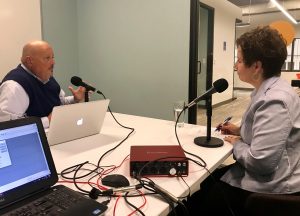 “You have to know who you are before you can lead effectively, and that's really the core of it,” says Tom Emigh, Leadership Coach & Principal for Acorn Leadership. “Identity is about the question, who am I?”
Emigh talked recently with Sheri Welsh for The Welsh Wire podcast, sponsored by the Family Business Alliance.
“I've developed a model that suggests that we should start at the identity level, then it would be good to move to understanding what are core values that you hold, what our core beliefs [are] that affect how you understand who you are and how you do anything in the world. Then we're ready to talk about behaviors and skills,” he says.
In a family business, that kind of value and beliefs assessment is heavily influenced by parents, siblings, grandparents and other relatives. “You still have those long, and I would say deeply embedded messages about who does dad think I am? Who does grandma think I am, right?” says Emigh. “We all have identity formation stuff going on, but it's really relevant because when I'm talking with my boss, who's a family member, and they've spoken into that question of who I think I am, and who they think I am. That's a subtext that runs into performance reviews, and who gets assigned what tasks and whether or not I think I'm doing a good job versus whether or not this person thinks I'm doing a good job.”
Listen to Sheri’s entire interview with Tom Emigh.
“You have to know who you are before you can lead effectively, and that's really the core of it,” says Tom Emigh, Leadership Coach & Principal for Acorn Leadership. “Identity is about the question, who am I?”
Emigh talked recently with Sheri Welsh for The Welsh Wire podcast, sponsored by the Family Business Alliance.
“I've developed a model that suggests that we should start at the identity level, then it would be good to move to understanding what are core values that you hold, what our core beliefs [are] that affect how you understand who you are and how you do anything in the world. Then we're ready to talk about behaviors and skills,” he says.
In a family business, that kind of value and beliefs assessment is heavily influenced by parents, siblings, grandparents and other relatives. “You still have those long, and I would say deeply embedded messages about who does dad think I am? Who does grandma think I am, right?” says Emigh. “We all have identity formation stuff going on, but it's really relevant because when I'm talking with my boss, who's a family member, and they've spoken into that question of who I think I am, and who they think I am. That's a subtext that runs into performance reviews, and who gets assigned what tasks and whether or not I think I'm doing a good job versus whether or not this person thinks I'm doing a good job.”
Listen to Sheri’s entire interview with Tom Emigh.
Subscribe to The Welsh Wire podcast on iTunes for additional informative, entertaining interviews with west Michigan business leaders.
- The Welsh Wire: Tom Mathison, Mathison | Mathison Architects
The Welsh Wire: Tom Mathison, Mathison | Mathison Architects
If you want to successfully launch a business with your children, a spouse or other family member, it’s important for everyone to have a professional, business-oriented attitude. “Be respectful of each other,” says Tom Mathison, who with his son Evan Mathison (a fellow architect) founded Mathison | Mathison Architects in 2013. “In whatever relationship you have as a family you’ve got to set boundaries in terms of your private life and your professional life and make sure you handle your professional life in a professional way.” Tom was recently interviewed by Sheri Welsh for the Welsh Wire Podcast. Mathison | Mathison has enjoyed widespread recognition across the west Michigan region for its innovative, energy-efficient sustainable designs and historic building preservation. Tom says identifying a voice and mission was crucial to their early success. “Trusting that voice was also an important part of what we did at the very beginning,” he says. “We could easily simply have responded to every opportunity that came along (but) we’ve tried to be selective with our opportunities. We’ve had to turn down some things because it simply did not fit our vision of where we wanted to go.” Listen to Sheri’s entire interview with Tom Mathison to learn more about the rewards and challenges of running a family-owned business.Subscribe to The Welsh Wire podcast on iTunes for additional informative, entertaining interviews with west Michigan business leaders.
- The Welsh Wire: Tom Olive, Crystal Flash
The Welsh Wire: Tom Olive, Crystal Flash
Crystal Flash was founded 85 years ago as a one-truck fuel distributor. Today, it is one of Michigan’s largest propane retailers with 270 workers. Since 2016 it has been an employee-owned company through an employee stock ownership plan (ESOP). At that time, President and CEO Tom Olive rolled out an updated and refined organizational strategy based on the balanced scorecard (BSC) strategic planning and management system. “We had been very much an open book company and so there was a general familiarity with our finances and the general direction that the company was headed, but we wanted to refine that and make sure that folks felt like and acted like employee-owners who had a stake in the game,” Tom tells Sheri Welsh in their interview for The Welsh Wire. Crystal Flash made a concerted effort to communicate and deploy their strategy down to the the daily, weekly and monthly activities of all workers. “We've had some comments like, oh, you know, now I understand why you're asking me to do that. Or you go through (performance) reviews and and some folks will say things like, oh, wow, that's the best review I've had in years because it's based on this data. I can see what you're asking me to do and how it fits into the big picture,” he says. Crystal Flash has had three consecutive years of record earnings growth since implementing the new strategy. “We know where we're going, folks are fired up and turned on, they know what to do on a day-to-day basis,” Tom says. Listen to Sheri’s entire interview with Tom Olive.Subscribe to The Welsh Wire podcast on iTunes for additional informative, entertaining interviews with west Michigan business leaders.
- The Welsh Wire: Traeger & the Reality of Remote Engineering
The Welsh Wire: Traeger & the Reality of Remote Engineering
Traeger, maker of high-end wood pellet grills and accessories, is doing innovative work linking hybrid and remote teams to improve collaboration. Sheri Welsh talked on The Welsh Wire with Joe Marietta, Director of Mechanical Engineering at Traeger’s Kalamazoo office. Traeger is headquartered in Utah but opened up a remote office in West Michigan, in part because of the ease of hiring excellent engineering talent. “It's much easier, right? Cheaper cost of living, more people who do those sorts of things, so it's worked out really well,” Marietta said. The Kalamazoo-based Traeger office is in the Jerico building which is described as a community of entrepreneurs, makers, and artists. “When we started, we all flew to Utah and spent a week there meeting the team and understanding the culture,” he said. “Now take this back to Kalamazoo – it should feel like an extension of the headquarters in Salt Lake City.” Marietta also mentioned video meetings are key to supplementing occasional in-person trips to Utah. “It's not it's not as good as being in person, but it's the best thing we have. And it's amazing now, right? You can have a video call and just like that we're on; I can see your face, and we can chat,” he said. Marietta and his team also put a lot of effort into making the Traeger employees at the Kalamazoo office feel unique and special. “We've got hats, and we've got t-shirts. When you come to visit Kalamazoo from Salt Lake City, you get the merit badges, you get a sticker, and you get a t-shirt. It's like you've been here, and so then, you can take it back. You were in the office and people are like, ‘Oh, where'd you get that shirt? Oh, that came from the Kalamazoo office!’ If you want one, you’ve got to come visit.” Learn more about work team collaboration on this month's The Welsh Wire podcast featuring Sheri Welsh and Joe Marietta. Be sure to subscribe to The Welsh Wire on iTunes for additional informative, entertaining interviews with West Michigan business leaders. - The Welsh Wire: Transitioning Leadership in a Family-Owned Business ft. Marlee D’Arco of Safety Services, Inc.
The Welsh Wire: Transitioning Leadership in a Family-Owned Business ft. Marlee D’Arco of Safety Services, Inc.
This month on The Welsh Wire, Sheri interviews Marlee D’Arco, President and CEO of Safety Services, Inc. in Kalamazoo, about her journey into leadership of her family’s business. The third generation to lead the family-owned and operated safety equipment supplier, D’Arco was originally brought onboard to assist in potentially selling the company as the original family members approached retirement. Ultimately, her circumstances ended up positioning her to take over and move the firm forward. “I fell in love with it because, as many small business owners can relate, there is never a dull day. I am a person who is bored very easily, so I welcome a challenge,” D’Arco says. One of those challenges was the perception that she had appeared out-of-nowhere to take over the company. “They didn’t see me around regularly, so I think people were naturally suspicious, defensive, or cautious because they weren't sure where I was coming from,” she explains. D’Arco addressed that challenge by emphasizing that she was there to learn, understand, and examine how things could be improved. “Cultural change is hard; leadership change is hard. Setting new expectations, raising the bar, changing the objectives—these are all things that are very difficult for people to process and grab onto, particularly if they've been in your organization for a long period of time and if there's a lot of generational variation in your organization.” “We have quite a bit of that, and I think that you have to just remove your own personal feelings and ego from the situation and not make it personal at all. Make it about the objective and give people the opportunity to come to the table. Some will come more quickly than others, and some will walk away. That’s okay.” Listen to Sheri’s full interview with Marlee D'Arco about leadership transitions in family-owned businesses. Subscribe to The Welsh Wire on iTunes for additional informative, entertaining interviews with West Michigan business leaders. - The Welsh Wire: Von Washington Jr. and Sarah Klerk, The Kalamazoo Promise
The Welsh Wire: Von Washington Jr. and Sarah Klerk, The Kalamazoo Promise
The Kalamazoo Promise pays for up to four years of college tuition and fees for every student who graduates from Kalamazoo Public Schools. It’s a tremendous resource for the Kalamazoo community but also for the business sector that’s concerned about future workforce access. “We just saw some data that said that Kalamazoo was losing Millennial population faster than a good portion of the state, and we don’t want that,” says Von Washington Jr., Executive Director of Community Relations for The Kalamazoo Promise. “Now, one of the beauties of the scholarship for anybody who is skeptical about whether a scholarship will keep people living somewhere and or moving in, it did that effectively in Kalamazoo to the tune of about a thousand students came into this school district.” Listen to Sheri's entire interview with Von Washington Jr. and Sarah KlerkSubscribe to The Welsh Wire podcast on iTunes for additional informative, entertaining interviews with west Michigan business leaders.
- The Welsh Wire: Von Washington Jr. of The Kalamazoo Promise
The Welsh Wire: Von Washington Jr. of The Kalamazoo Promise
The Kalamazoo Promise announced they have signed an agreement with the state’s largest skilled trades union - the Michigan Regional Council of Carpenters and Millwrights (MRCC) – to expand the Promise to include skilled trades apprenticeships with the MRCC’s Joint Apprenticeship Program. “We're hearing it every day that there are not enough people coming into the workforce that have this type of training, have the vocational education behind them, the certificates, or the skills to come in and make sure that we have the things that we need,” says Von Washington Jr., executive director of community relations for The Kalamazoo Promise. He talked about the new program with Sheri Welsh for The Welsh Wire podcast. “We were approached by the MRCC -- they have a new facility in Wayland -- and they wanted to explore a partnership, and what it would look like for us to support Promise students through their scholarship to go up there through the four-year apprenticeship program and help them get those skills and lead to great careers,” Washington says. “And it really was a no brainer for us. We've known for many, many years, since the inception of the scholarship, that everyone won't go off to college. But there are great careers everywhere.” The benefits to Kalamazoo-area businesses? Job-ready workers. “The beauty of an apprenticeship is that you're doing some classroom time, and that's what we compensate for. But they're also on the job. So they're doing job time. So yes, they are ready to go. They're already on the job. And in many cases, now, they're offered a job in the organization that they're in, nobody really wanted to let them go. So they are ready to go. And they're learning immediately.” Listen to Sheri’s entire interview with Von Washington Jr. Subscribe to The Welsh Wire podcast on Apple Music for additional informative, entertaining interviews with west Michigan business leaders.
- The Welsh Wire: Wade Wyant of Red Wagon Advisors
The Welsh Wire: Wade Wyant of Red Wagon Advisors
Legacy is both a challenge and a blessing for established family businesses. “But the world doesn't work with legacy, the world works off change, right?” says Wade Wyant, Executive Advisor/Scaling Up Coach at Red Wagon Advisors of Ada. He spoke recently with Sheri Welsh for The Welsh Wire podcast, sponsored by the Family Business Alliance. “You look at the millennials and the change in their thinking around management and leadership and they want smaller teams, they want more dynamic accountability. There's a lot of things, so your infrastructure, the way you lead and manage has to be dynamic, and you have to be able to grow and change as generations grow and change,” he says. Another issue that plagues many family business operations is communications, which Wyant says can be resolved by focusing on getting everyone to use a common language. “Once you have a common language, there's less challenges of interpretation -- not all conflict goes away, of course, but some conflict can dissipate,” he says. Having a common language and vocabulary means “we're all talking about the same thing, because that's where a lot of problems arises. I say this, you say that, and we think we're saying the same thing [but] we're saying something totally different, right?” Red Wagon Advisors describes itself as helping businesses scale themselves to their highest level of industry maturity. To get to that level, Wyant told Welsh that other key steps to family business success include focusing on marketing, creating a plan and investing in thought leadership, having scalable infrastructure, conducting better meetings, having a commitment to lifelong learning, mirroring the behavior that you want the next generation to have and setting realistic goals. Listen to Sheri’s entire interview with Wade Wyant.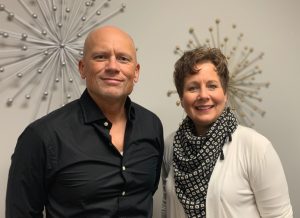
Subscribe to The Welsh Wire podcast on iTunes for additional informative, entertaining interviews with west Michigan business leaders.
- The Welsh Wire: Wade Wyant of Red Wagon Advisors
The Welsh Wire: Wade Wyant of Red Wagon Advisors
Navigating the complex dynamics of decision making can be one of the biggest challenges to family business success. Wade Wyant, Executive Advisor/Scaling Up Coach at Red Wagon Advisors of Ada, suggested ways to address those challenges when he spoke with Sheri Welsh for The Welsh Wire podcast, sponsored by the Family Business Alliance. “You see that all the time in family dynamics, where instead of just saying no, or having that really open and transparent conversation, you go the other direction, you actually move off in neutral and you go negative,” he says. “By doing destructive things like setting up roadblocks and making it more difficult, in the end it builds up animosity and anger and mistrust and a lot of things you don't want. Especially for the family you only have so much time and if one of the family members is really excited about a visionary-type idea, no matter what it is, you don't want to waste time setting up roadblocks now. Get it out on the table and talk about it.” It’s important to understand the role that emotion plays in decision-making, according to Wyant. “The reality is if you're human, you're an irrational thinker. There's just no way around [the fact] that we're all irrational at some level. And so the more we can have that dialogue, and the more we can talk about that, not in every case, but in most cases my experiences in working with family businesses is that dialog has a lot of value. It avoids those silent moments where we're not having a dialogue and we're trying to make our point through silence or roadblocks or playing for all or nothing–those destructive things.” Learn more about navigating the dynamics of family business decision making when Wade Wyant talks with Sheri Welsh on this week’s The Welsh Wire podcast. Listen to Sheri’s full interview with Wade Wyant. Subscribe to The Welsh Wire podcast on iTunes for additional informative, entertaining interviews with west Michigan business leaders.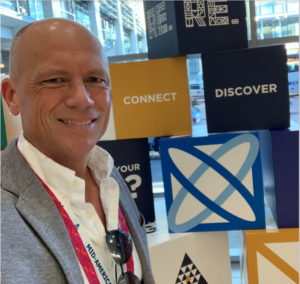
- The Welsh Wire: When “Forever” Isn’t – Divorce and the Family Business, Featuring Paul McCarthy of Rhoades McKee
The Welsh Wire: When “Forever” Isn’t – Divorce and the Family Business, Featuring Paul McCarthy of Rhoades McKee
It’s important to think about how a divorce might affect your family-owned business. Prenuptial agreements and other legal preparations are a crucial part of rightsizing your risk, according to Paul McCarthy, attorney with Rhoades McKee in Grand Rapids, Mich. McCarthy was interviewed by Sheri Welsh for The Welsh Wire podcast, sponsored by Family Business Alliance. "If the probability of a divorce is 50/50, for any given couple in the country, and of course, everyone thinks, well, that's not going to be me but statistically speaking, if you have four shareholders and a family held company, you're going to experience a divorce," McCarthy said. "The chances aren't just more likely than not, it is vastly probable." Attitudes have changed dramatically, both from a social and legal standpoint, with regard to using prenuptial agreements as a business risk management tool. "Intrinsically business owners want to keep business and family separate and now you bring up the concept of a prenuptial agreement, this is just a domino effect of negative topics that people don't really want to address," McCarthy said. "But the reality is this: a marriage will end in one of two ways, death or divorce. Neither is a very positive thing to think about or to contemplate. And so a prenuptial agreement has to forecast what happens in either of those scenarios." McCarthy pointed out that it is important to note that today, prenuptial agreements are valid, accepted and common. "You don't have to just be a business owner to want to have a prenuptial agreement. There are lots of second marriages in our society, particularly marriages with kids. Prenuptial agreements ought to be entered into prior to any of those marriages just to have the parties come together." Learn more about managing divorce within a family business. Listen to this week’s podcast with Paul McCarthy. Subscribe to The Welsh Wire podcast on iTunes for additional informative, entertaining interviews with West Michigan business leaders. - The Welsh Wire: William Crane on Supply Chain Strategies for 2021
The Welsh Wire: William Crane on Supply Chain Strategies for 2021
 Many businesses have seen dramatic disruptions in their supply chains over the past year. That’s drawn attention to the role that effective supply chains can play in fostering company growth and innovation.
Many businesses have seen dramatic disruptions in their supply chains over the past year. That’s drawn attention to the role that effective supply chains can play in fostering company growth and innovation.“The key today is really flexibility, can you take market shocks?” says supply chain expert William Crane, founder and CEO of IndustryStar, an on-demand supply chain services and software technology company. He was interviewed by Sheri Welsh for The Welsh Wire podcast.
“It doesn't have to be negative we're talking about. There's so much positive here, a new market that opened up, right? How do you capture that 20 percent faster than your competitor? And that stuff matters,” he says.
Crane says one of the strengths of West Michigan companies is that they have a long tradition of local sourcing, which has helped insulate them from some of the global supply chain problems. But he says there is a lot of supply chain innovation going on that can be utilized by local firms, especially in terms of building resiliency and agility.
“There's so many new ways to do business these days. That, again, might be uncomfortable the first time you do it, but then it's like, well, that worked really well, I need to do more of that. I’m a huge fan of exponential organizations. It’s kind of a buzzword, so basically on-demand services, on-demand business models. You do not have to hire full-time employees for every single thing that you need under your umbrella. So in the case of supply chain, there's on-demand supply chain as a service.”
Hear more of Crane’s advice on supply chain issues and strategies on this week’s The Welsh Wire podcast. Listen to Sheri’s full interview with William Crane. Subscribe to The Welsh Wire podcast on iTunes for additional informative, entertaining interviews with West Michigan business leaders. - The Welsh Wire: Workplace Evolution with Wightman
The Welsh Wire: Workplace Evolution with Wightman
Today’s workplaces are much different than they were just a few years ago. We discuss this in detail with our friends from Wightman, which is an architecture, civil engineering, and surveying firm with offices across Michigan trickling into Indiana. “Pre-Covid-19, the trend was moving toward an open office environment, removing the barriers, removing the walls, and really opening up the space to a lot of shared workspaces,” says Wightman Senior Interior Designer Casey Bourdo. “Then, of course, Covid-19 hit and everybody went home overnight.” Bourdo and her colleague, Stefany Holland, who serves as Wightman’s Commercial Sector Leader, talked with Sheri Welsh on The Welsh Wire podcast about workplace evolution trends as employees return to on-site work. “The post-pandemic culture seems to be a huge topic of conversation with many of our partners. It’s not just, ‘How do I fit more people in a building?’ but rather, ‘How do we shift the culture?” Holland explains. “Businesses want certain types of work environments for different reasons. Maybe they’re doing a different type of work; maybe they’re delivering things differently; or maybe they’re trying to get more recruits and currently aren’t attractive to new hires.” One recent workplace trend is to install more wheeled furniture to facilitate space flexibility and collaboration. It’s more than just moving desks and chairs around though – it’s also providing the communications technology that encourages employees to get up and interact, cooperate, and innovate. “If you can hit those things, and your corporate culture supports all of that, you will have an amazing workspace. Your staff and potential new hires, they're really going to enjoy coming to work,” Holland says. Listen here to learn more about workplace evolution from Bourdo’s and Holland’s talk with Sheri Welsh on The Welsh Wire podcast. Subscribe to the Welsh Wire on iTunes for additional informative, entertaining interviews with west Michigan business leaders.
- Podcasts & Blogs Archive
Podcasts & Blogs Archive
The Welsh Wire Archive
Known as The Welsh Wire, our podcasts and blogs are part of the helpful resources Welsh & Associates offers employers and job seekers. These weekly offerings feature professional recruiting expert Sheri Welsh. Listen in as leaders from a wide array of small to mid-size West Michigan companies weigh in and share their experience and insight on a variety of business topics including employee retention challenges and recruitment success stories.Podcasts Archive
Blogs Archive
- May 14, 2024 | The Welsh Wire: Bridging the STEM Talent Gap in Michigan Through College OPT Programs – Part One
- April 9, 2024 | The Welsh Wire: Transitioning Leadership in a Family-Owned Business ft. Marlee D’Arco of Safety Services, Inc.
- March 5, 2024 | The Welsh Wire: Economic & Social Sustainability ft. Carrie Yunker of Bell’s Brewery & Shayna Schupan Barry of Schupan & Sons, Inc.
- February 6, 2024 | The Welsh Wire: Immigration as a Tool for Workforce Development ft. Kelli Saunders & Andy Johnston
- January 9, 2024 | The Welsh Wire: Traeger & the Reality of Remote Engineering with Joe Marietta
- August 22, 2023 | The Welsh Wire: Revitalizing Downtown Kalamazoo with Treystar
- July 18, 2023 | The Welsh Wire: Career Evolution for Women with Blank Canvas Consulting
- June 13, 2023 | The Welsh Wire: Workplace Evolution with Wightman
- May 16, 2023 | The Welsh Wire: Rockstar Woman Movement featuring Shannon Cohen
- April 11, 2023 | The Welsh Wire: The REAL Reason We Have a Talent Shortage, featuring Dr. Paul Isely, Associate Dean of Undergraduate Programs with Seidman College of Business at Grand Valley State University
- March 14, 2023 | The Welsh Wire: Assimilating Non-Family Executives in the Family Business, featuring Robert Stead, Michigan Managing Partner of Barnes & Thornburg, Grand Rapids
- February 21, 2023 | The Welsh Wire: How Employment Contracts are Shaping Company Recruitment, featuring Attorneys Jordan Held and Mariah Natzke of Kreis Enderle
- January 10, 2023 | The Welsh Wire: The Regenerative Power of American Family Businesses, featuring Chandresh Baid and Ana Gonzalez of Grand Valley State University
- August 16, 2022 | The Welsh Wire: Building for Good - Local Leader Michael Sytsma Helps Make a Non-profit Vision a Reality
- July 26, 2022 | The Welsh Wire: The Business Case for Child Care, Featuring Scott Nykaza and Kristyn Buhl-Lepisto
- June 14, 2022 | The Welsh Wire: Nathan Baar of HealthBar Shaking Up the West Michigan Wellness Industry
- March 15, 2022 | Being Adaptive in Family Business, featuring Hugh Ingalls of Ingalls Pictures
- Dec. 28, 2021 | The Best of 2021 Business Management Insights
- Dec. 7, 2021 | How Shareholder Agreements Can Help Prevent Family Business Squabbles, Featuring Paul McCarthy of Rhodes McKee
- Nov. 2, 2021 | The Welsh Wire: When “Forever” Isn’t – Divorce and the Family Business, Featuring Paul McCarthy of Rhoades McKee
- Oct. 12, 2021 | Impact Players – Business Leaders and Communities in Schools Team Up To Make a Difference
- Sept. 21, 2021 | Talent Talks with Ashley Iovieno of Michigan Works! Southwest
- June 8, 2021 | Amy Ritsema, OnSite Wellness for Retention and Recruitment
- April 27, 2021 | Stacy Paul on Winning the War for Talent with Culture
- April 13, 2021 | William Crane on Supply Chain Strategies for 2021
- March 30, 2021 | FBA Rightsizing Risk Series – Embezzlement with Hungerford Nichols CPAs + Advisors
- March 9, 2021 | Flexing During the Pandemic featuring Jeanne Bolhuis of Keyser Insurance Group
- February 23, 2021 | Larry Faragalli, CEO of Brightly
- January 19, 2021 | Mary Jane Mapes, Building a Culture of Trust
- January 5, 2021 | Shawn Premer and Monica Lloyd
- December 16, 2020 | Mary Jo Baweja, MA, LLP, Director of Business Development at Ulliance
- December 8, 2020 | Ana Gonzalez, Director of the Family Owned Business Institute
- November 12, 2020 | Hungerford Nichols CPAs + Advisors
- November 10, 2020 | David Campbell, Kalamazoo Regional Educational Service Agency (KRESA)
- October 20, 2020 | Kyle Kunnen, Information Security Officer at Mercantile Bank of Michigan
- October 6, 2020 | Doug Lepisto, Sleeping Giant Capital
- September 22, 2020 | Patrick Miles, Jr. of Barnes & Thornburg LLP
- September 11, 2020 | Kristyn Buhl-Lepisto, Kalamazoo County Ready 4s
- September 1, 2020 | Wade Wyant of Red Wagon Advisors
- August 18, 2020 | Nolan Finley and Stephen Henderson of The Civility Project
- August 4, 2020 | Brian Calley, SBAM President
- May 12, 2020 | Dr. Jan Akervall, Chief Medical Officer of Akervall Technologies
- April 6, 2020 | Catch Up On An Episode of The Welsh Wire You Missed!
- March 12, 2020 | Throwback Thursday Business Insights
- February 18, 2020 | Kyle Kunnen, Mercantile Bank of Michigan
- February 4, 2020 | Mary Jane Mapes, The Aligned Leader Institute
- January 21, 2020 | Ana Gonzalez, Grand Valley State University
- January 7, 2020 | Gary Kushner, Kushner & Company
- December 17, 2019 | Best of 2019
- December 3, 2019 | Culture Insights
- November 19, 2019 | Gary Kushner, Kushner & Company
- October 29, 2019 | Mark Smith, Rhoades McKee
- October 15, 2019 | Gretchen Detloff, Kalsec and Laura Keiser, Leslie Poucher Pratt, and Martha Todd, Farmhouse Early Learning Center
- September 24, 2019 | Jennifer Swan and Carrie Hoch-Mortlock, TowerPinkster and James Devers, CIS
- September 10, 2019 | Wade Wyant, Red Wagon Advisors
- August 27, 2019 | Talent Attraction and Retention Tips
- August 14, 2019 | Matthew Allard, Brightstar Capital Partners
- July 23, 2019 | Mike Ritsema, i3 Business Solutions
- July 9, 2019 | Bill Boersma, OC Consulting Group
- June 18, 2019 | Von Washington Jr., The Kalamazoo Promise
- June 4, 2019 | Rob Elliott, Pondera Leadership Consulting
- May 21, 2019 | Kevin Murphy, Miniature Custom Manufacturing
- May 7, 2019 | Jeff Disher of DISHER and Brad Hilleary of Webb Chemical
- April 23, 2019 | Stacey Hamlin, CTS Telecom
- April 9, 2019 | Heather Isch of LKF Marketing and Elizabeth Wright of 633 Group
- March 26, 2019 | Dr. Dino Signore
- March 12, 2019 | Matt Rampe, Beene Garter
- February 26, 2019 | Shannon Bronsink and Cassie Goodband, Keyser Insurance
- February 12, 2019 | Tom Emigh, Acorn Leadership
- January 22, 2019 | David Rhoa, Marana Group
- January 8, 2019 | John Barry, Schupan Aluminum & Plastic Sales
- December 18, 2018 | Best of 2018
- December 4, 2018 | Steve Owens, Consumer Credit Union
- November 13, 2018 | Randy Boss, Ottawa Kent Insurance
- October 30, 2018 | AJ Willit, LogiQuip
- October 16, 2018 | Pam Olson, Crystal Flash
- October 2, 2018 | Todd Mulder of Old National Bank and Heidi and Amanda Smith of 2K Tool
- September 18, 2018 | Mark Pruss, TecNiq, Inc.
- September 4, 2018 | Park Kersman and Phil Pearce, 75th Anniversary of Lorin Industries, Inc.
- August 21, 2018 | Steve Owens, Consumers Credit Union
- August 7, 2018 | Mary Jo Asmus, President of Aspire Collaborative Services LLC
- July 24, 2018 | Cynthia Kay, Cynthia Kay and Company
- July 3, 2018 | Tom Olive, Crystal Flash
- June 19, 2018 | Bradley Hartwell, Northtown Real Estate
- June 5, 2018 | Park Kersman and Phil Pearce, Lorin Industries
- May 29, 2018 | Mary Jo Asmus, Aspire Collaborative Services LLC
- May 22, 2018 | Nate McFadden, Elevator Services Inc.
- May 15, 2018 | Jim Medsker, Keystone Solutions Group
- May 9, 2018 | Cynthia Kay, Cynthia Kay and Company
- May 1, 2018 | Jesse Young, Kreis Enderle
- April 24, 2018 | Jim Coyle, Nexus Business Solutions
- April 20, 2018 | Shawn Premer, Consumers Credit Union
- April 10, 2018 | Tom Mathison, Mathison Architects
- April 3, 2018 | Marc Foerster, Crystal Flash
- March 27, 2018 | Becky Poe, Agritek Industries
- March 23, 2018 | Fred Schubkegel of Varnum
- March 13, 2018 | Sue Tellier of JetCo Solutions
- March 6, 2018 | Von Washington Jr. and Sarah Klerk of The Kalamazoo Promise
- February 27, 2018 | Amy Ritsema of OnSite Wellness
- February 21, 2018 | Chris Shires of the Gilmore Car Museum
- February 13, 2018 | Sara Fazio, Attorney and Succession Planning Expert with Kreis Enderle
- February 6, 2018 | Cynthia Kay, Cynthia Kay and Company and Author of Small Business for Big Thinkers
- January 30, 2018 | Brad Morrill of Crystal Flash
- The Civility Project - Sept. 15 Webinar
 Please join Sheri Welsh, President and CEO of Welsh & Associates, and Nolan Finley and Stephen Henderson of The Civility Project for a webinar on Sept. 15 from 12:30 to 1:30 p.m. Participation is free, but registration is required.
The Civility Project teaches participants how to agree to disagree, engage in civil conversation, build respect for each other’s humanity, learn to listen to other sides, use what you hear to challenge or affirm your own viewpoints, and stay curious.
Welsh & Associates is excited to present The Civility Project to southwest Michigan. Now more than ever, we need to listen to one another and respect each other’s opinions and differences. We really believe that this free webinar can help companies and small businesses create healthy dialogue and change how we treat one another and work together despite differences of opinions.
We hope you can join us on Sept. 15 and encourage you to SHARE THIS OPPORTUNITY with your colleagues!
Please join Sheri Welsh, President and CEO of Welsh & Associates, and Nolan Finley and Stephen Henderson of The Civility Project for a webinar on Sept. 15 from 12:30 to 1:30 p.m. Participation is free, but registration is required.
The Civility Project teaches participants how to agree to disagree, engage in civil conversation, build respect for each other’s humanity, learn to listen to other sides, use what you hear to challenge or affirm your own viewpoints, and stay curious.
Welsh & Associates is excited to present The Civility Project to southwest Michigan. Now more than ever, we need to listen to one another and respect each other’s opinions and differences. We really believe that this free webinar can help companies and small businesses create healthy dialogue and change how we treat one another and work together despite differences of opinions.
We hope you can join us on Sept. 15 and encourage you to SHARE THIS OPPORTUNITY with your colleagues!
More About The Civility Project
Nolan Finley is the current editorial page editor for The Detroit News while Stephen Henderson is the host of WDET's “Detroit Today” radio show. The two have been longtime friends, despite having different perspectives and being ideological opposites. Finley and Henderson launched The Civility Project to bring people of opposing viewpoints together for healthy disagreement, personal interactions, and constructive conversations.
The Civility Project has been featured in presentations by several prominent organizations including the Small Business Association of Michigan (SBAM), the Detroit Regional Chamber, and the Lansing Regional Chamber of Commerce.
The Civility Project is sponsored by Delta Dental.
- Videos
Videos
Welsh & Associates' videos serve as a resource for job seekers and employers. Covering a variety of professional topics, these videos feature executive recruiting expert Sheri Welsh. Hoping to speak with Sheri directly? Contact Welsh & Associates today. Out most recent videos are below, however be sure to check out our video archive for additional content!The Welsh Wire: Brewing Success with Chris O'Neill of One Well Brewing
Sheri Welsh talks with Chris O'Neill, owner of One Well Brewing in Kalamazoo, about his journey from homebrewer to entrepreneur. He discusses overcoming challenges, learning from competitors, and his vision for the future of the business.The Welsh Wire: Lessons from a Trailblazing Female CEO in Concrete ft. Adrienne Heidema
As part of the Family Business Alliance's “Women in the Family Business” series, Sheri Welsh sits down with Adrienne Heidema, President & CEO of Consumers Concrete. Heidema, the fourth generation of her family to lead the company, is the first female CEO in the business’ 90-year history—a remarkable milestone for a woman in the construction industry.The Welsh Wire: Know Honesty Book Release, ft. Ken Bogard and Grace Gavin from Know Honesty
The Grand Rapids-based Know Honesty Movement, founded in 2016, is helping organizations, professionals, and individuals break down their divisions and experience real communication. On this week’s Welsh Wire, Sheri Welsh talks with Know Honesty Founder Ken Bogard and Co-Founder and Chief of Staff Grace Gavin to discuss the launch of their book and their journey in promoting open and honest communication in workplaces.The Welsh Wire: Bridging the STEM Talent Gap in Michigan Through College OPT Programs – Part One
Sheri Welsh talks with several Western Michigan University professionals including Dr. Steve Butt, Dean of WMU's College of Engineering and Applied Sciences; Dr. Paulo Zagalo-Melo, Associate Provost for the Haenicke Institute for Global Education; and Lee Ryder, former Senior Director of International Student and Scholar Services, about a new collaboration addressing Michigan's need for well-trained STEM graduates.The Welsh Wire: Economic & Social Sustainability ft. Carrie Yunker of Bell’s Brewery & Shayna Schupan Barry of Schupan & Sons, Inc.
Sheri Welsh talks with Carrie Yunker, Executive Vice President at Bell’s Brewery; and Shayna Schupan Barry, Director of Governmental Affairs & Strategic Partnerships at Schupan & Sons, Inc., to learn how economic and social sustainability is a crucial part of their business strategies.The Welsh Wire: Immigration as a Tool for Workforce Development ft. Kelli Saunders & Andy Johnston
Sheri Welsh talks with Kelli Saunders, Vice President of Policy and Engagement for the Small Business Association of Michigan, and Andy Johnston, Senior Vice President of Advocacy and Strategic Engagement at the Grand Rapids Chamber about the role immigration can play in helping Michigan business owners address the talent shortage issue amidst a shrinking population.The Welsh Wire: Traeger Grills & the Reality of Remote Engineering with Joe Marietta
Sheri Welsh talks with Joe Marietta, Director of Mechanical Engineering at Traeger’s Kalamazoo office. Traeger, maker of high-end wood pellet grills and accessories, is doing innovative work linking hybrid and remote teams to improve collaboration.The Welsh Wire: Revitalizing Downtown Kalamazoo with Treystar
Sheri Welsh speaks with Treystar partner Fritz Brown and director of operations Rachel Krasinski about the company's $2 million investment toward renovating the historic Main Street East building and what is means for the future of downtown Kalamazoo.The Welsh Wire: Career Evolution for Women with Blank Canvas Consulting
Mary Jo Baweja, a clinical and organizational psychologist and president of Blank Canvas Consulting, talked with Sheri Welsh on The Welsh Wire podcast about her program, Career Evolution for Women.Disrupt HR Grand Rapids Event
Sheri Welsh spoke at DisruptHR Grand Rapids in June 2023 about innovative approaches to talent acquisition that involve the entire company rather than just the HR department.The Welsh Wire: Workplace Evolution with Wightman
Join Sheri Welsh as she talks with Senior Interior Designer Casey Bourdo and Commercial Sector Leader Stefany Holland from Wightman about workplace evolution trends.The Welsh Wire: Rockstar Woman Movement featuring Shannon Cohen
Join Sheri Welsh as she talks with Shannon Cohen about the founding of the Rockstar Woman Movement.The Welsh Wire: The REAL Reason We Have a Talent Shortage and Solutions to Help Solve it
Join Sheri Welsh as she discusses how to solve the talent shortage with Dr. Paul Isely from GVSU's Seidman College of Business. - Whitepapers
Whitepapers
Love the Ones You're With
Talent Acquisition’s Secret Sauce for Success
In this whitepaper, Welsh & Associates digs into a recent Gallup survey on why employees leave and how to use that information to improve employee retention and ease the demand for talent acquisition. Fill out the form below to access your copy of Welsh & Associate's "Love the Ones You're With" whitepaper.- Love the Ones You're With
Love the Ones You're With
Talent Acquisition’s Secret Sauce for Success
Thank you for your interest! In this whitepaper, Welsh & Associates digs into a recent Gallup survey on why employees leave and how to use that information to improve employee retention and ease the demand for talent acquisition.
- Love the Ones You're With
- Whitepapers Jan 2025
Whitepapers
Top 10 Tips to Elevate Your Job Search in 2025
Navigating today's job market can feel like a full-time job in itself.
In this whitepaper, Welsh & Associates provides tips on how experienced professionals can land their next great opportunity. Fill out the form below to access your copy of Welsh & Associate's "Top 10 Tips to Elevate Your Job Search in 2025" whitepaper.- Top 10 Tips to Elevate Your Job Search in 2025
Top 10 Tips to Elevate Your Job Search in 2025
Navigating today's job market can feel like a full-time job in itself.
Thank you for your interest! In this whitepaper, Welsh & Associates provides tips on how experienced professionals can land their next great opportunity.
- Top 10 Tips to Elevate Your Job Search in 2025
- Newsletter Archive
- Sitemap
- The Civility Project Feedback
Let Us Know Your Thoughts!
Thank you for sharing your feedback on The Civility Project webinar! Please let us know about your experience.

